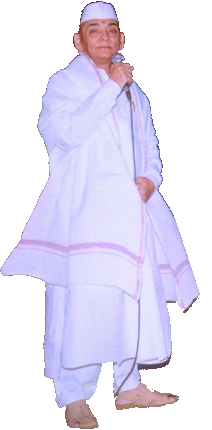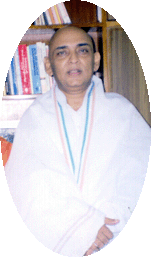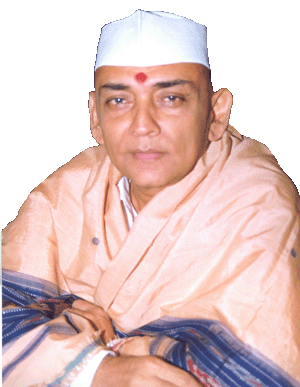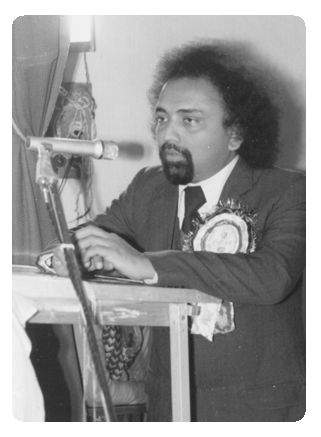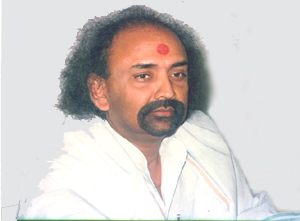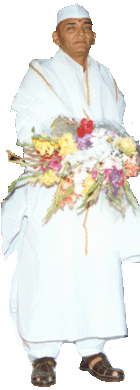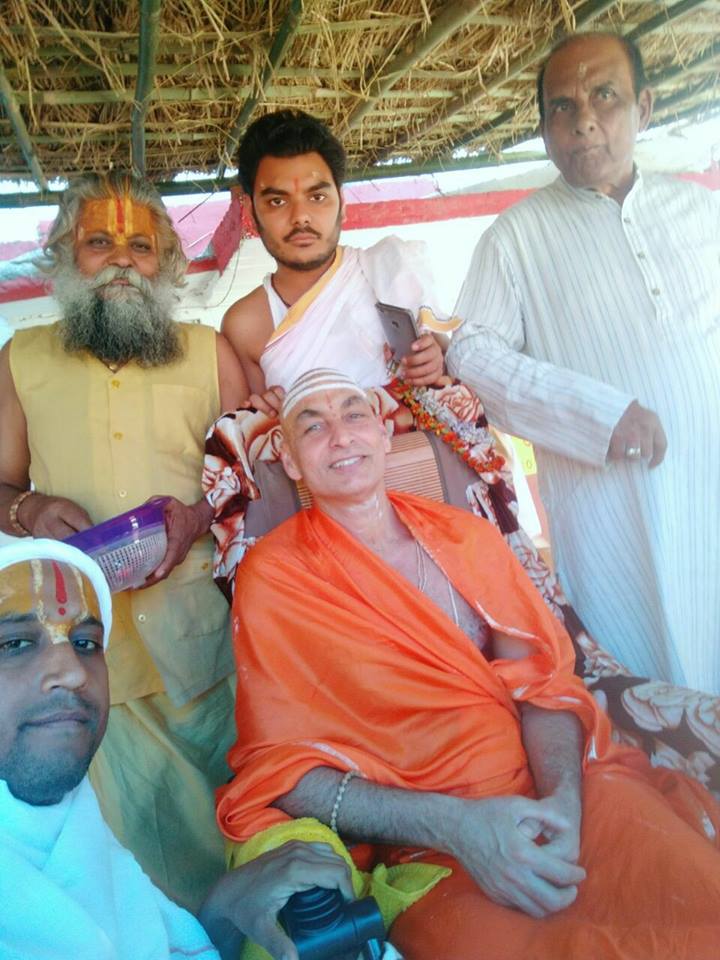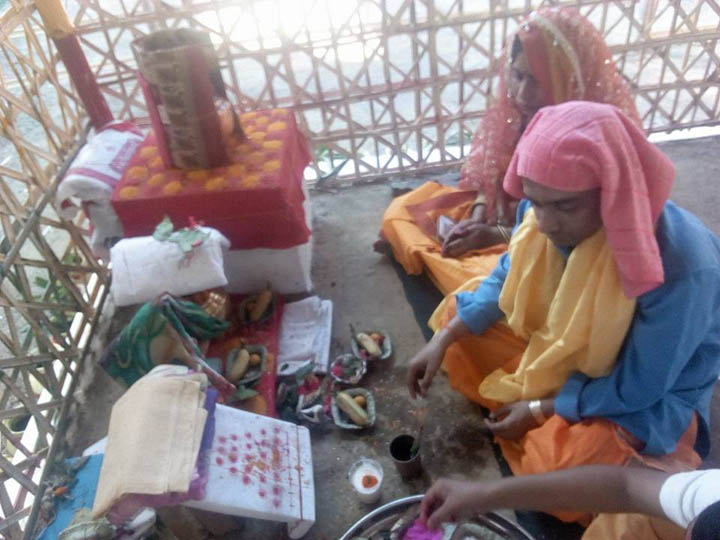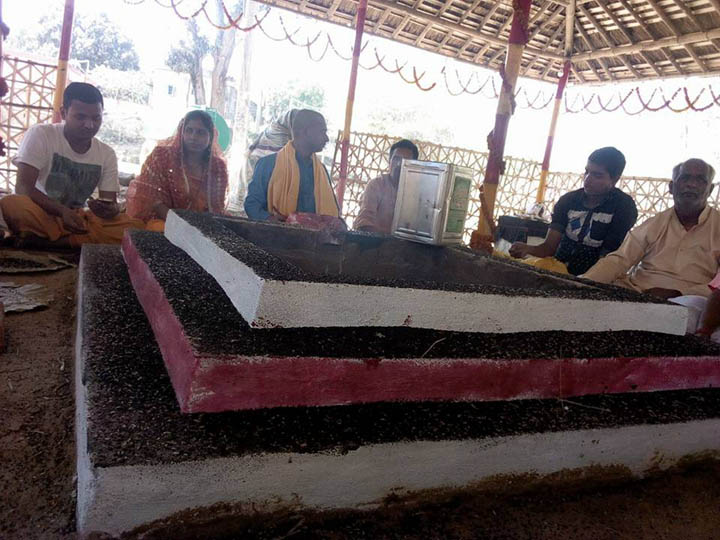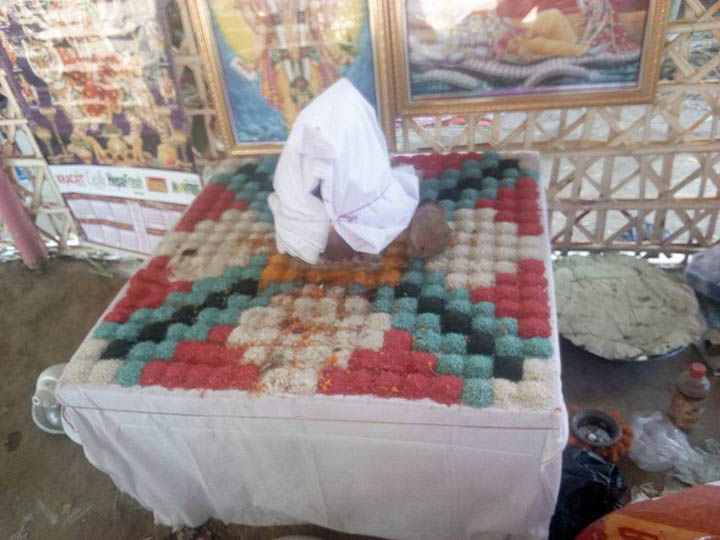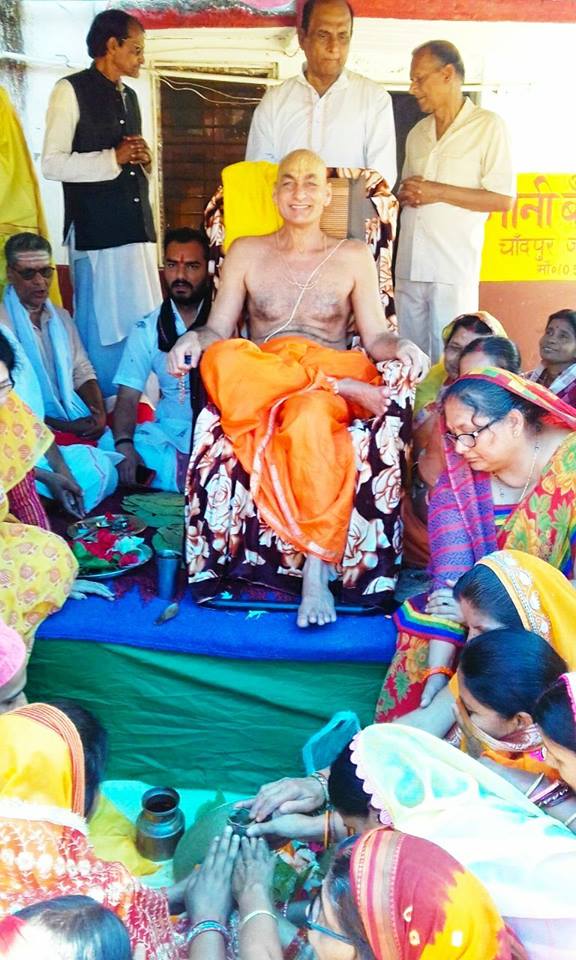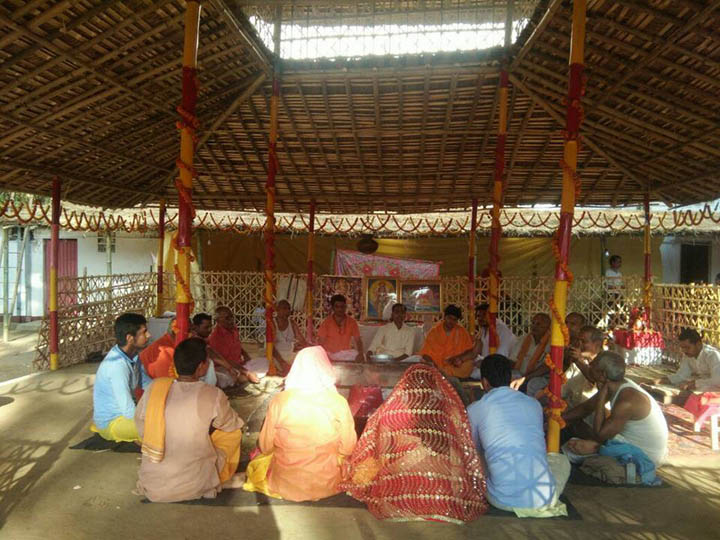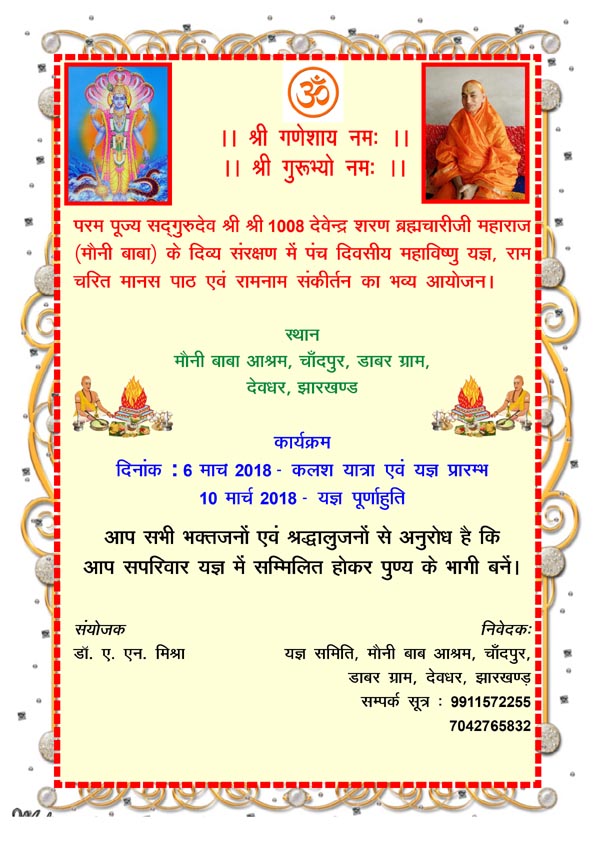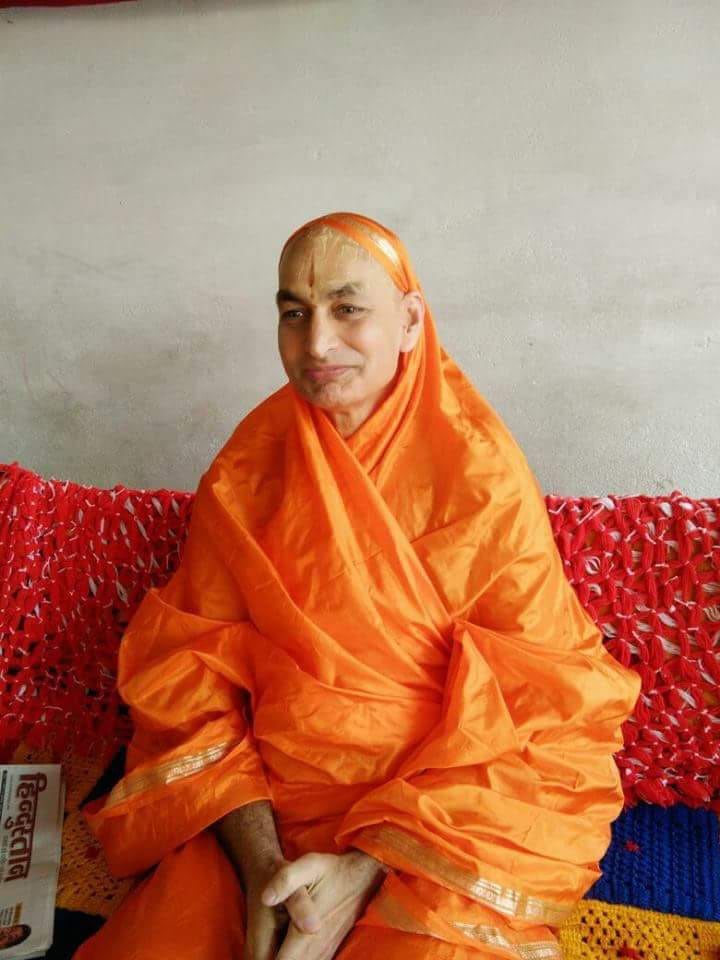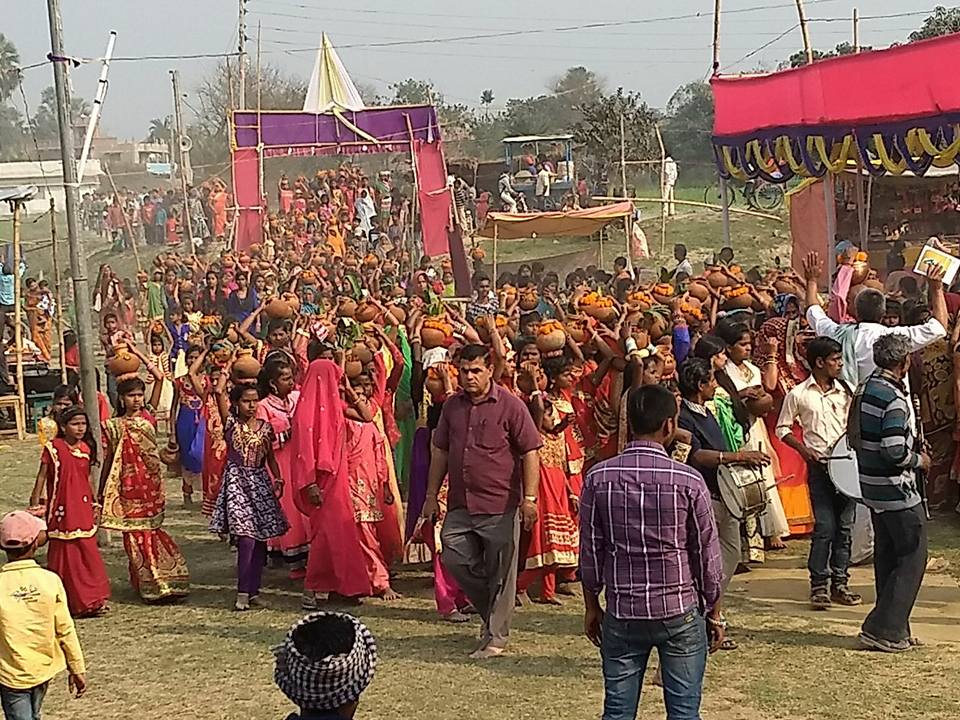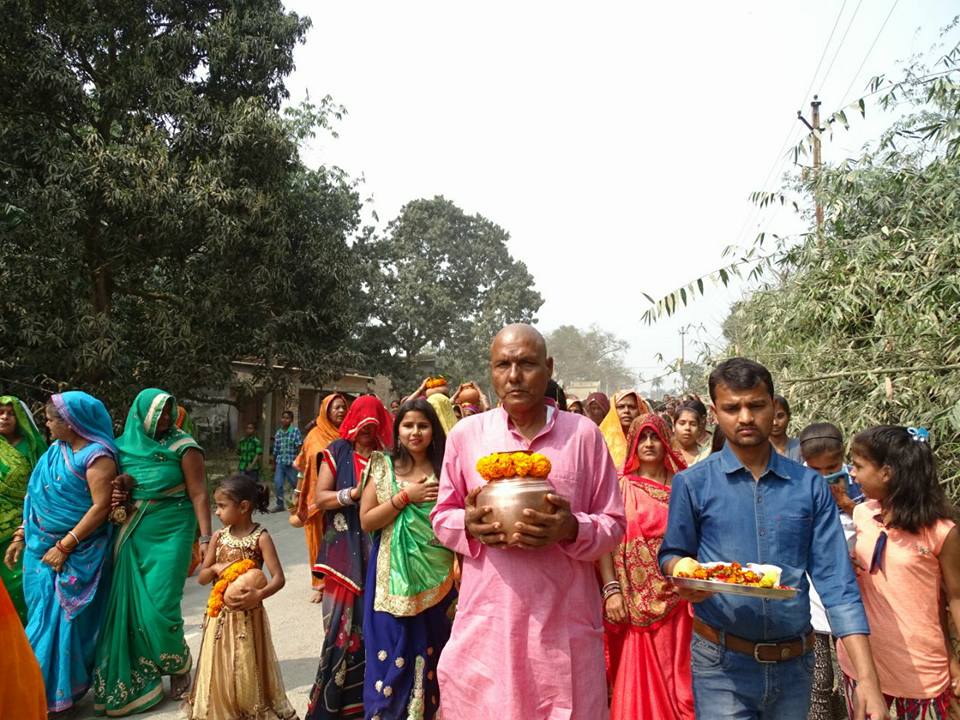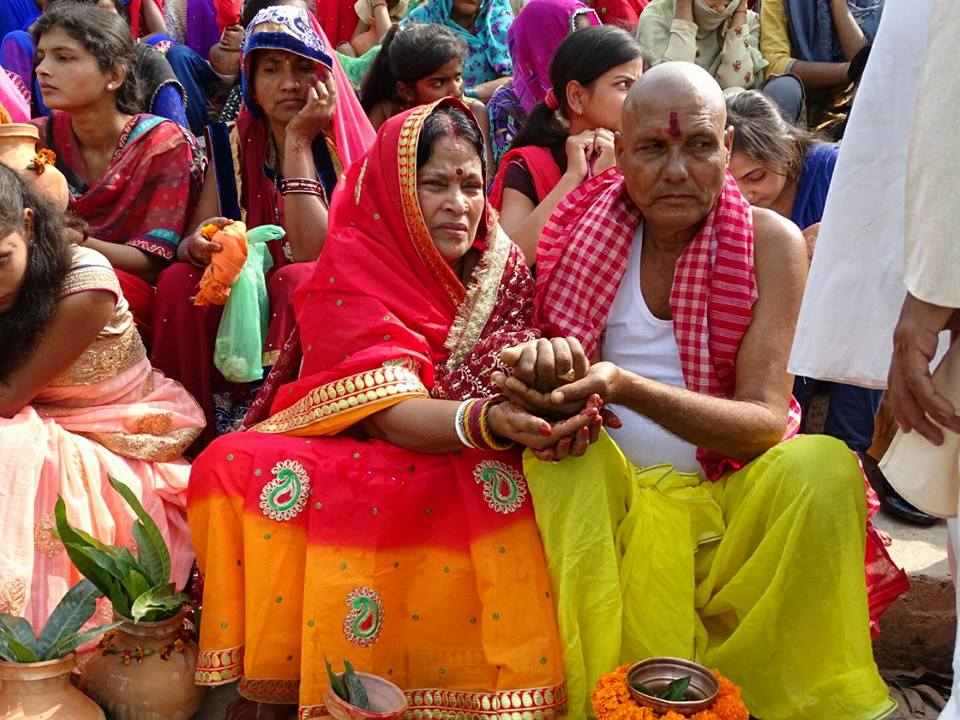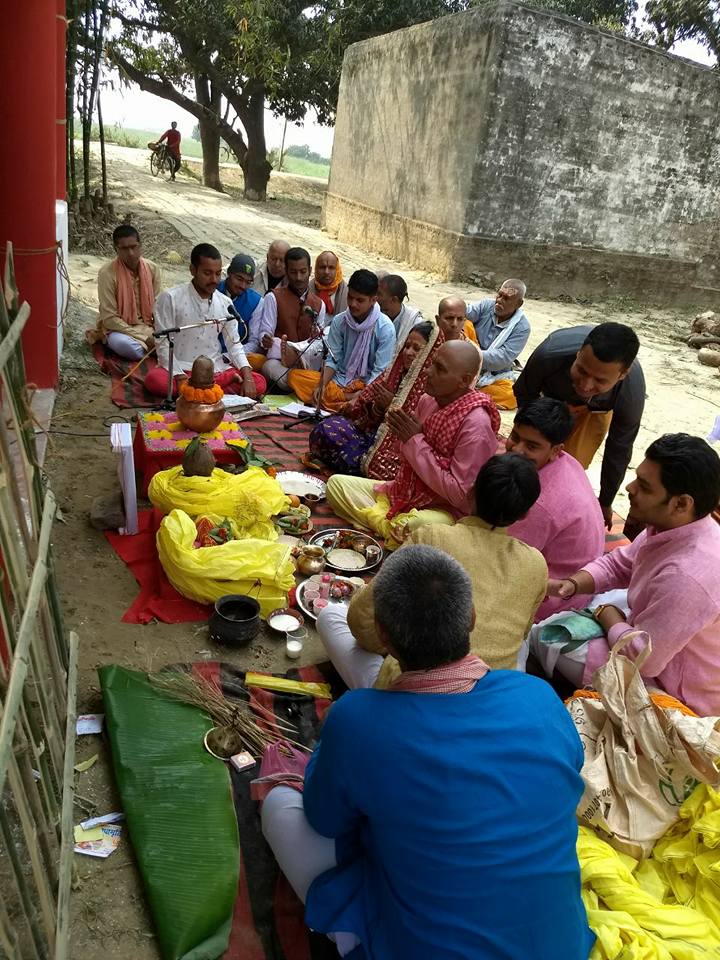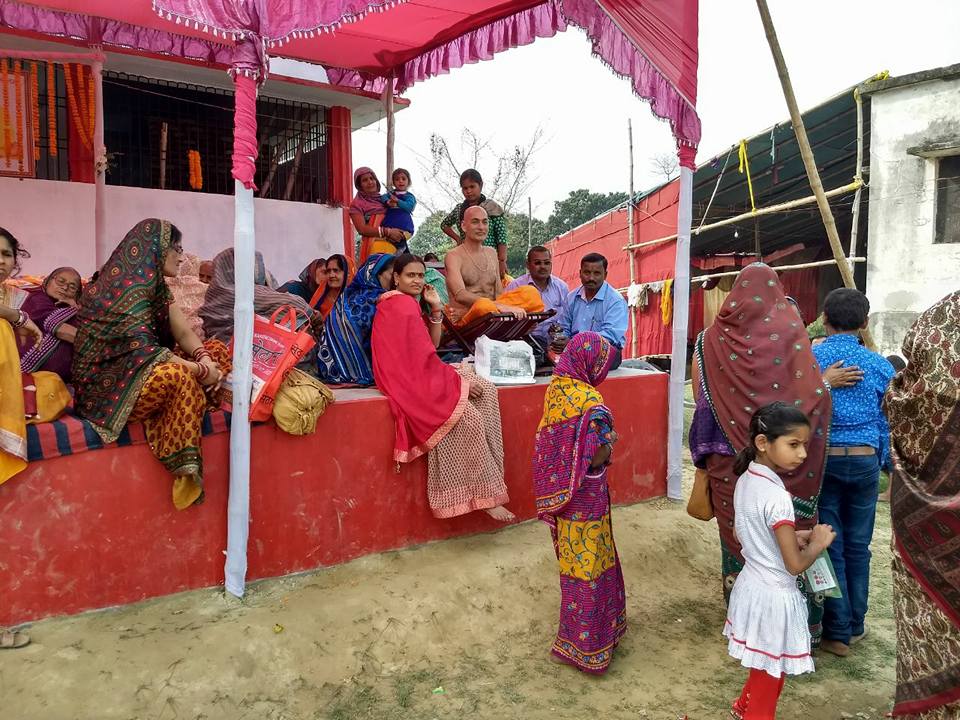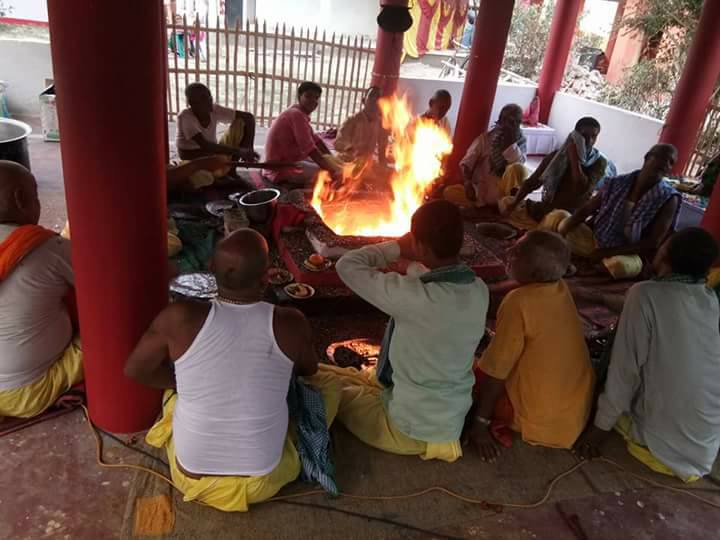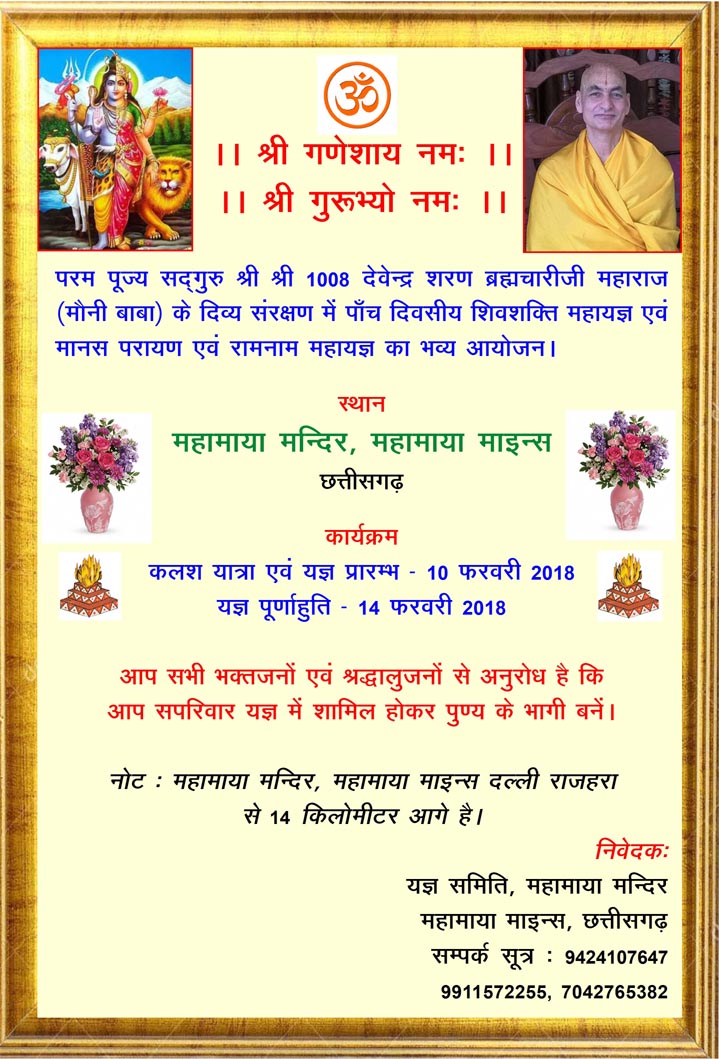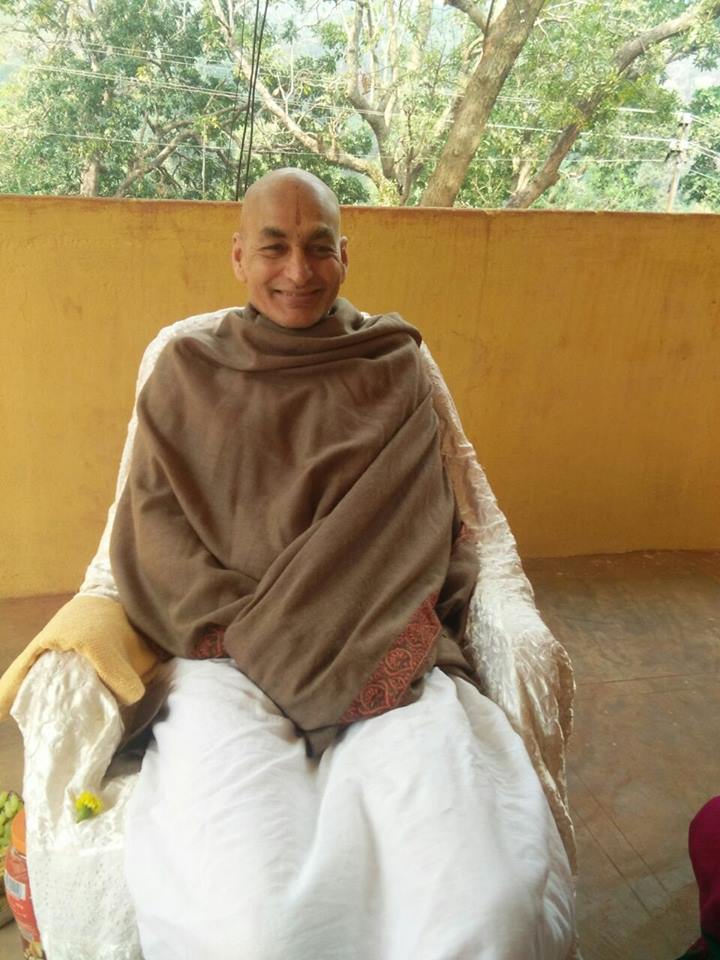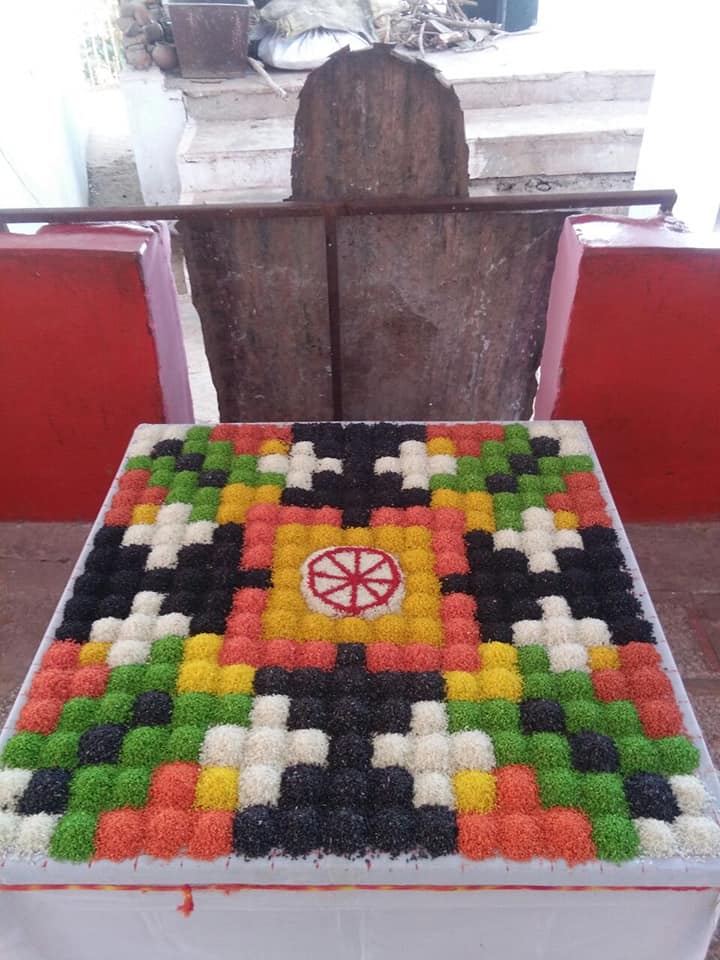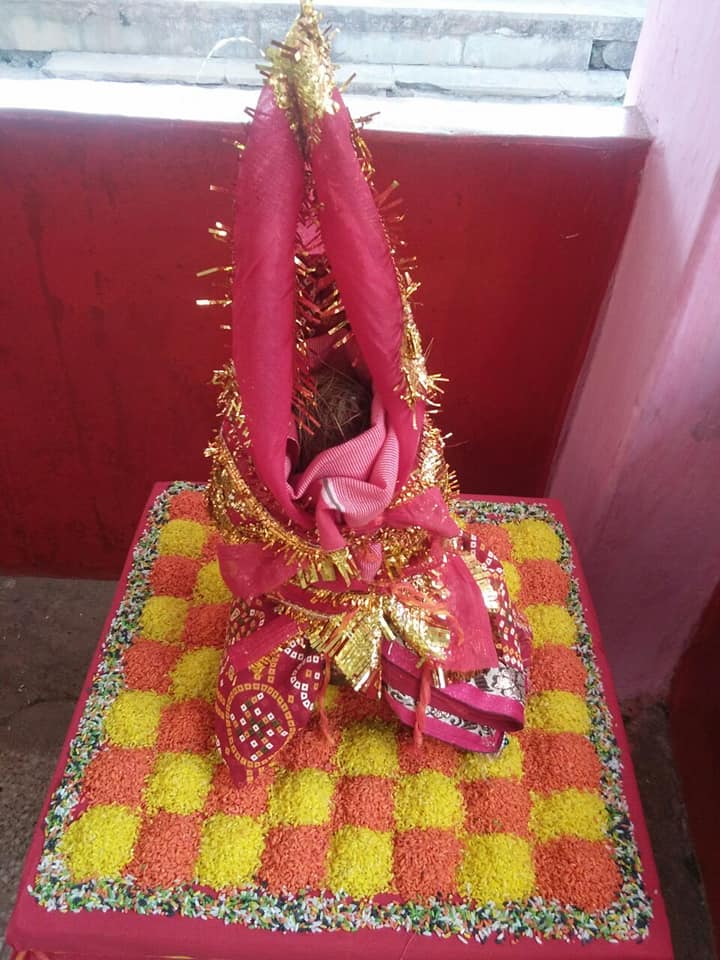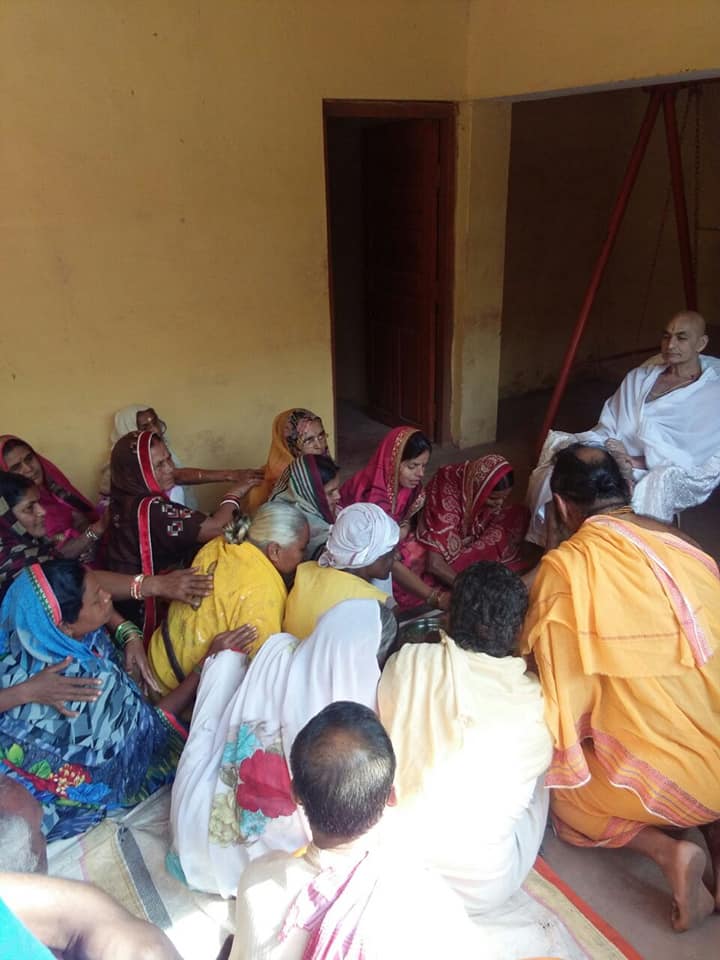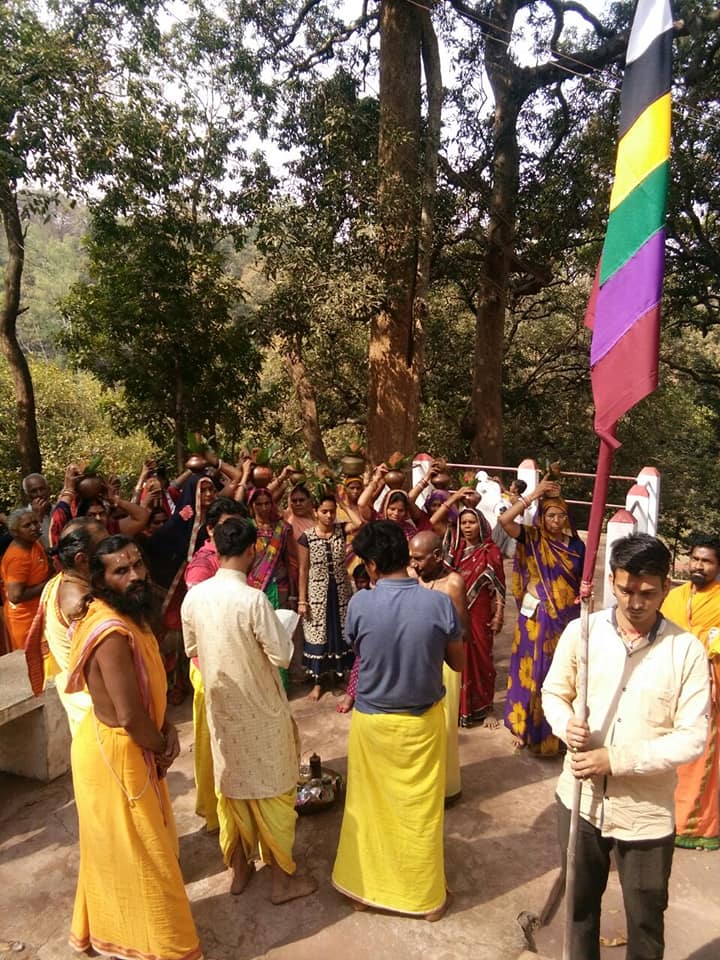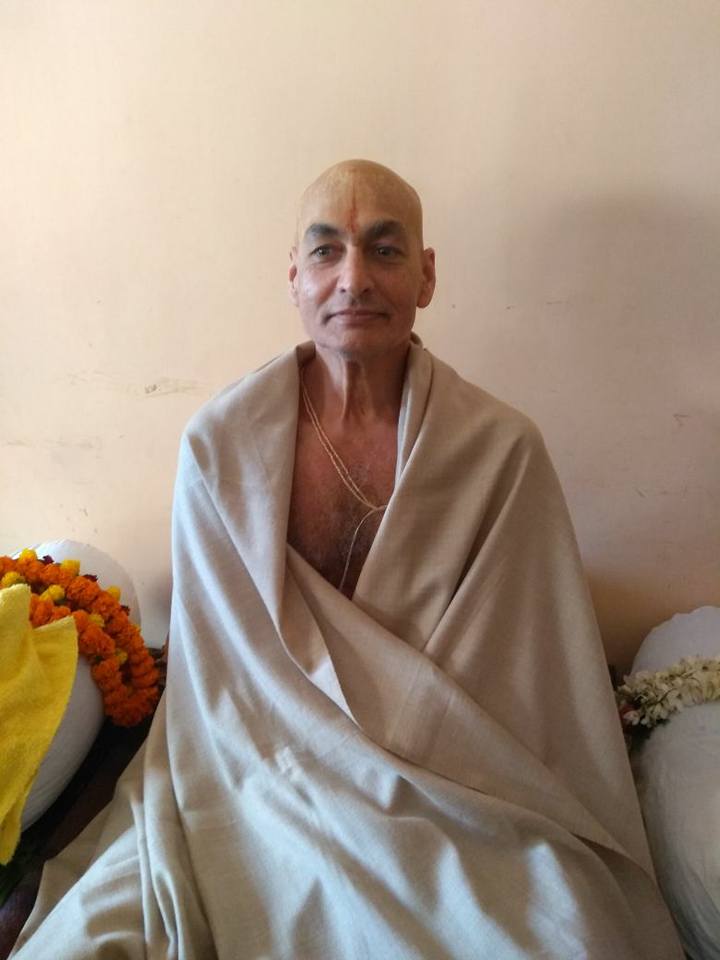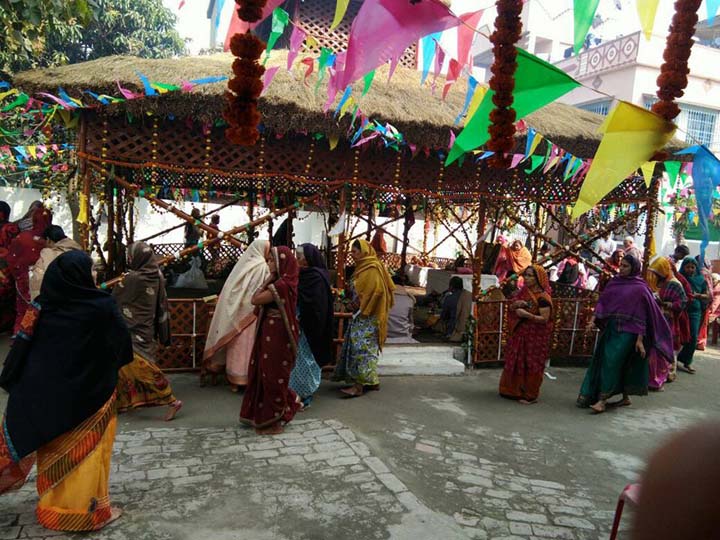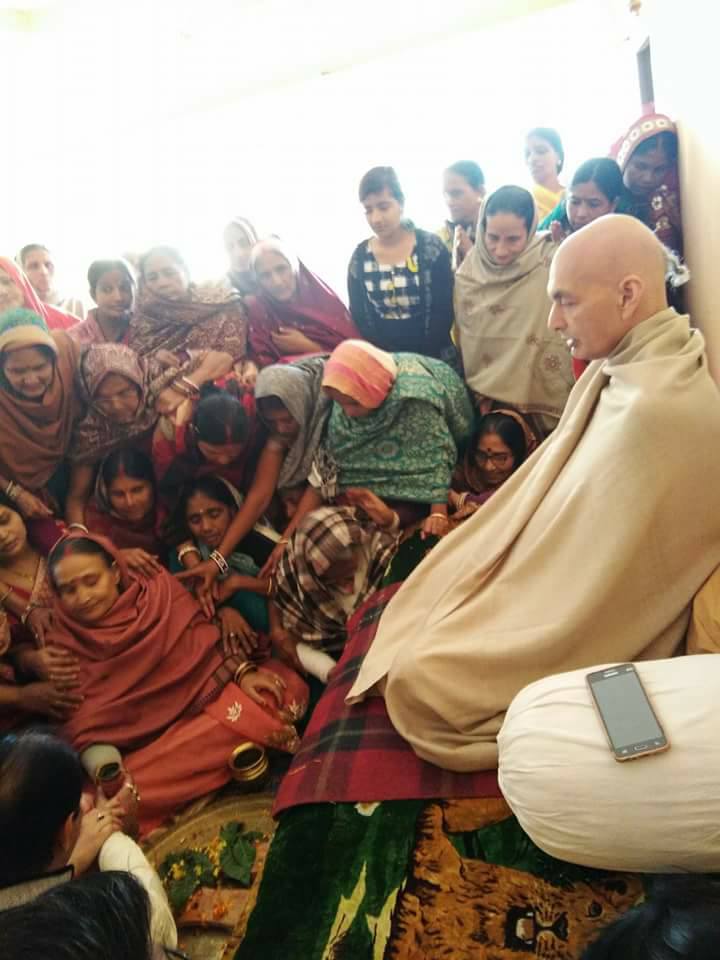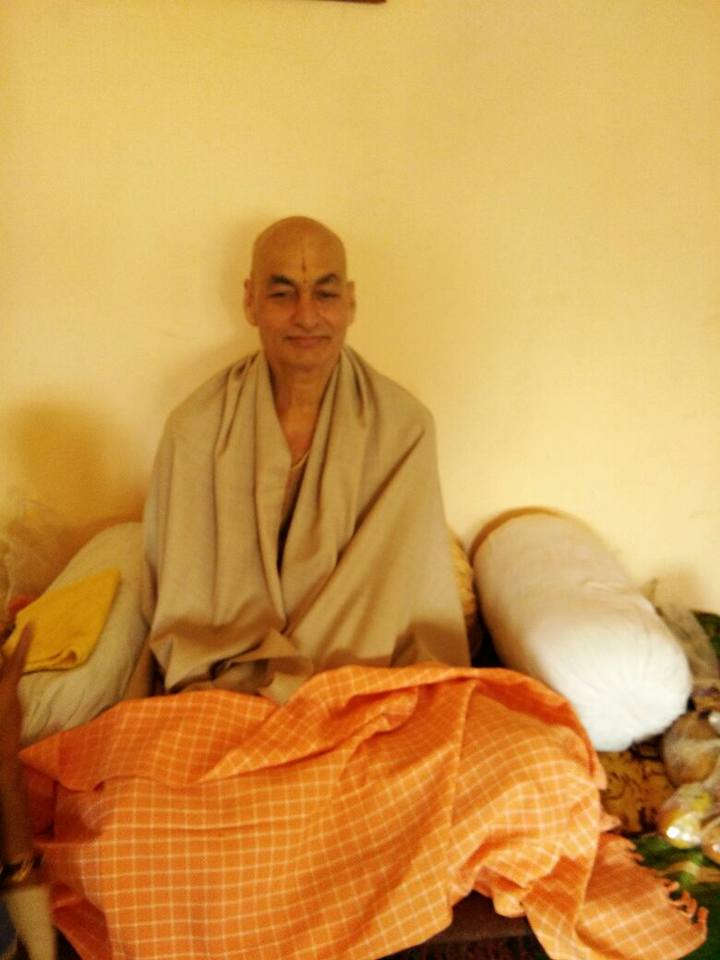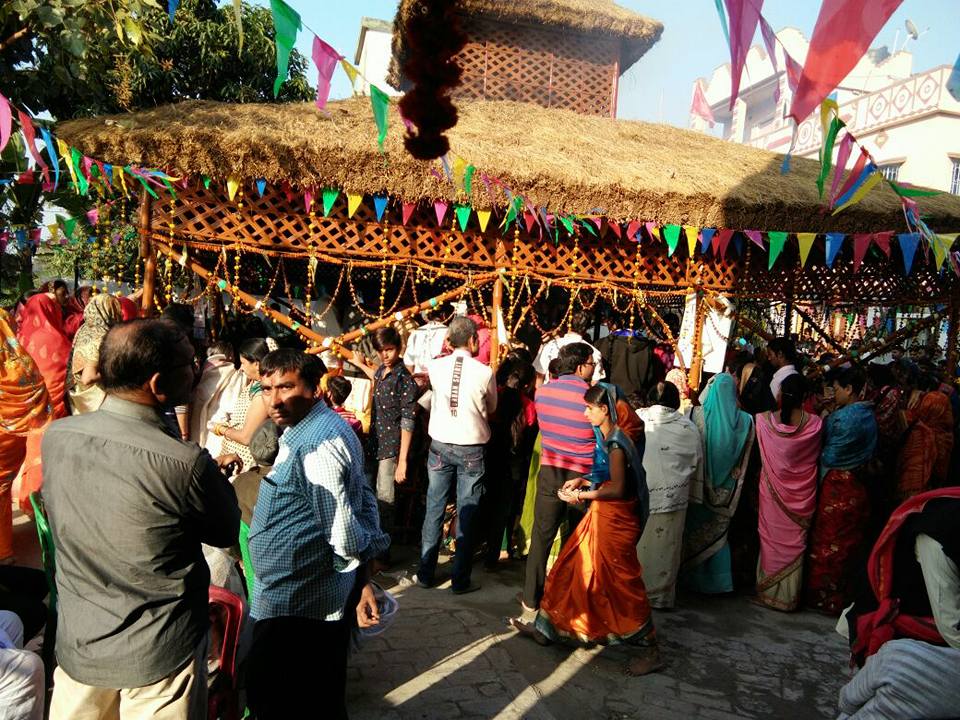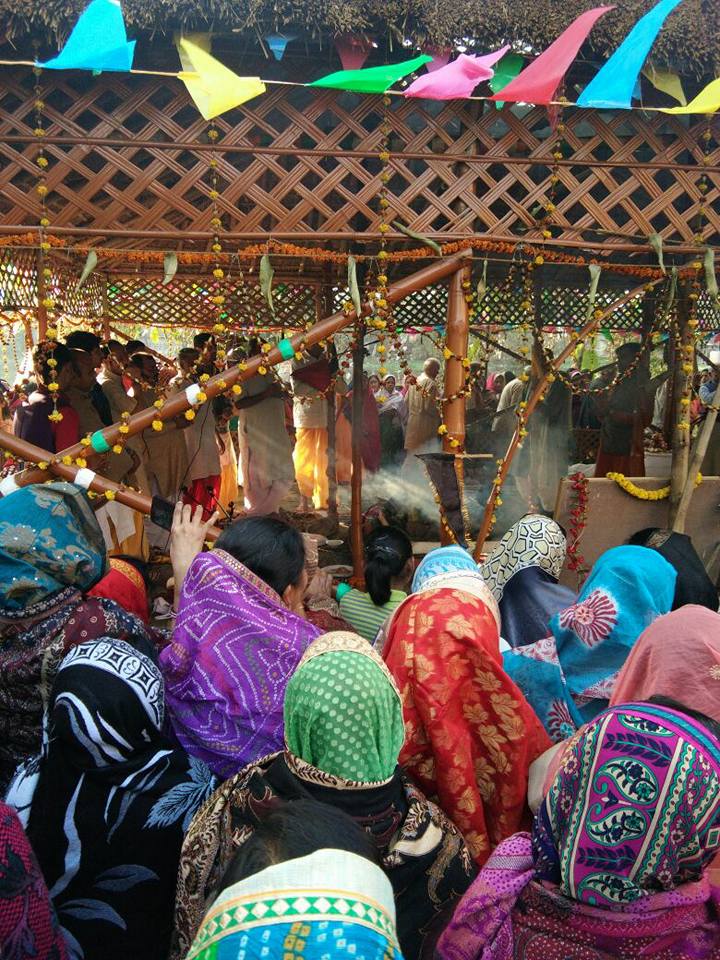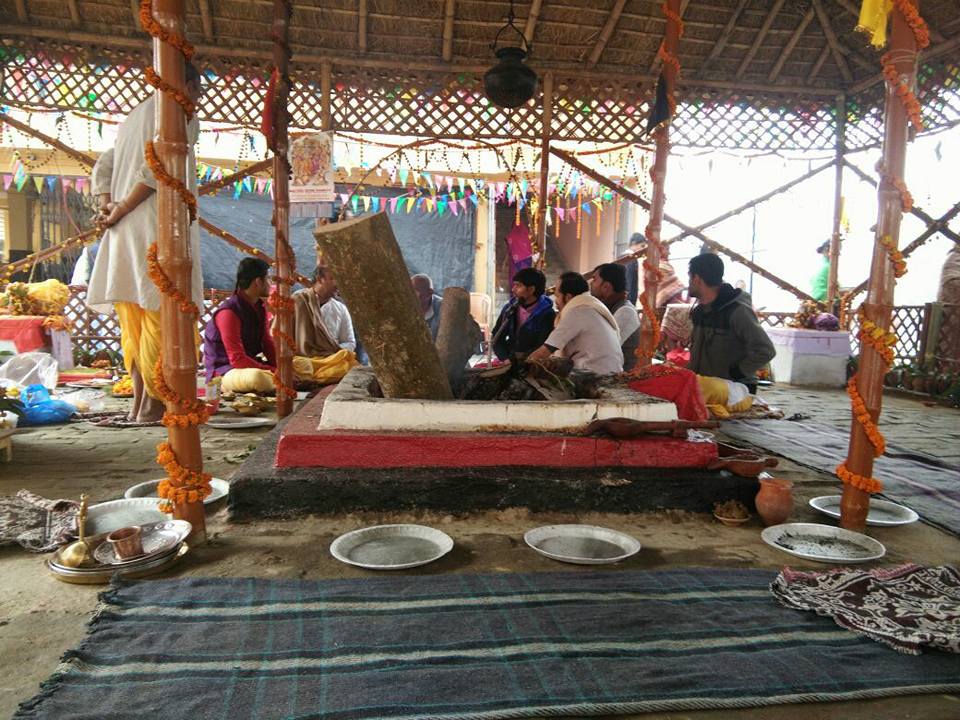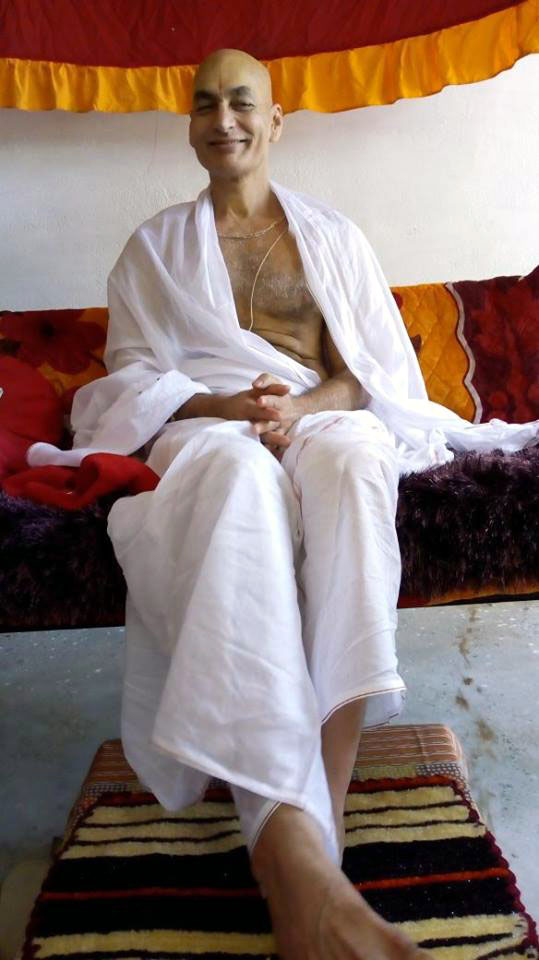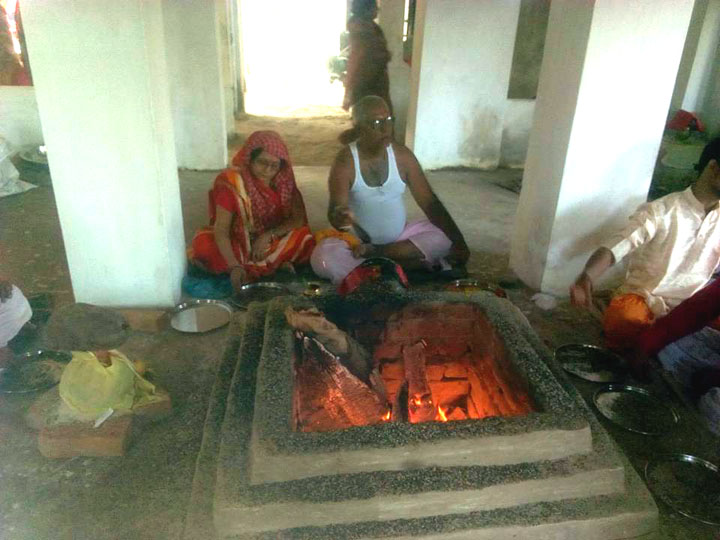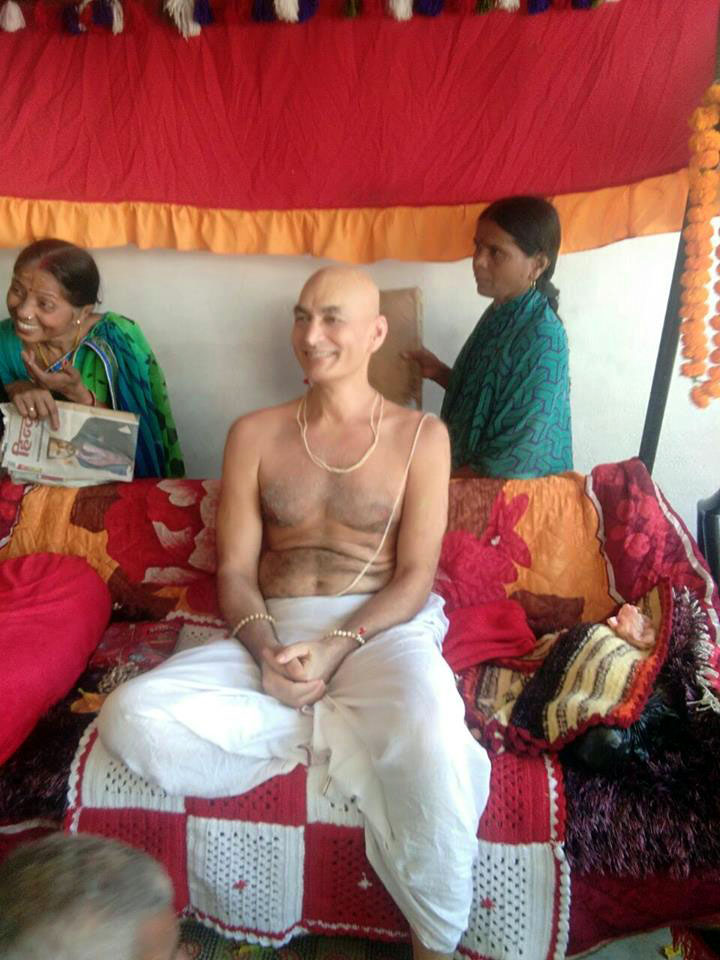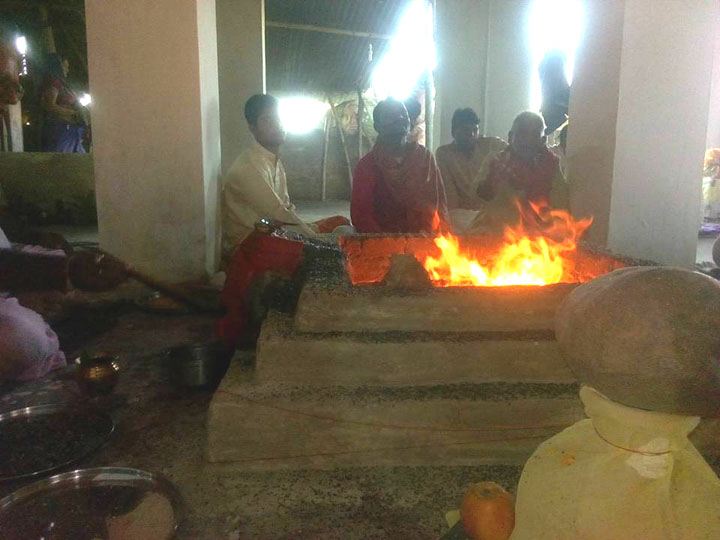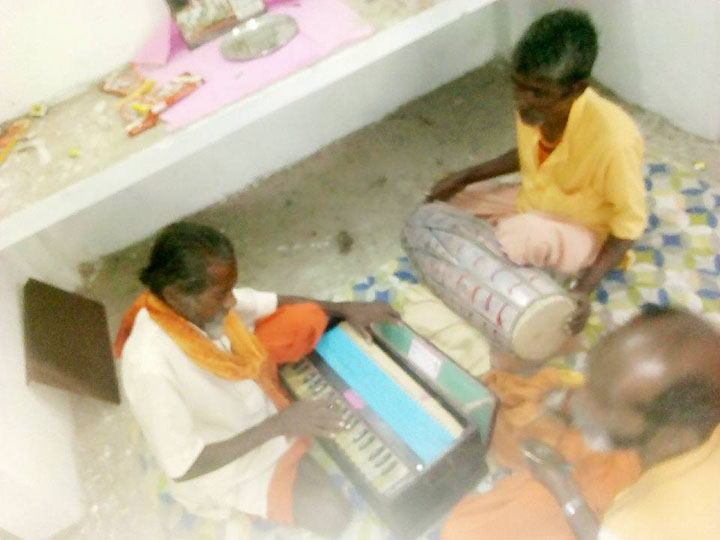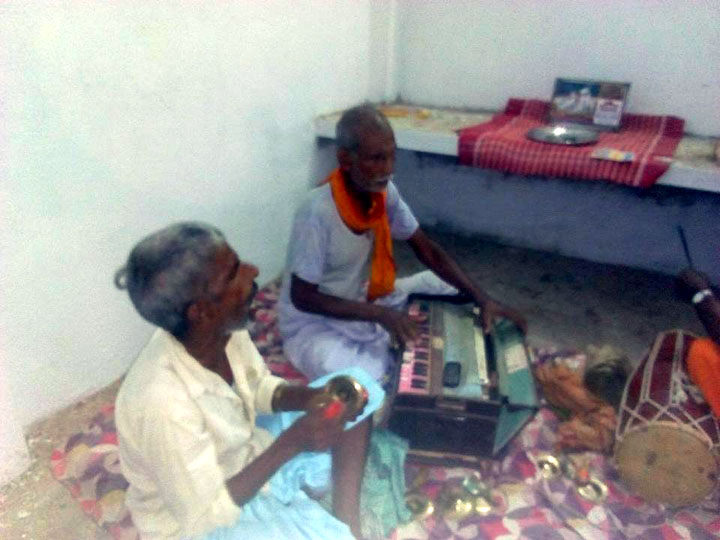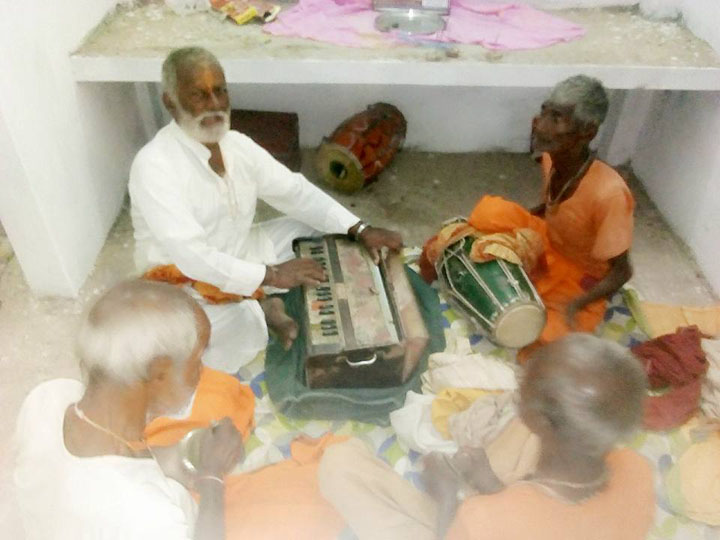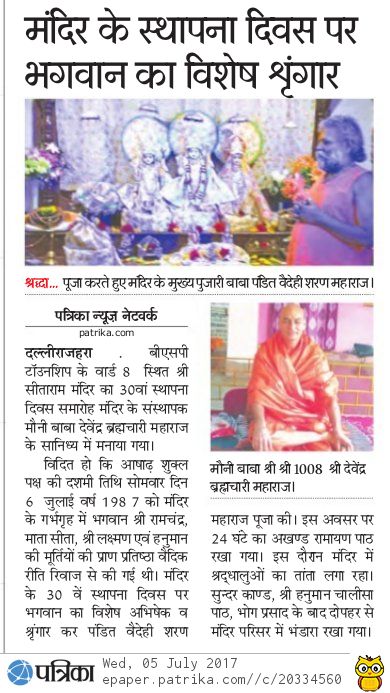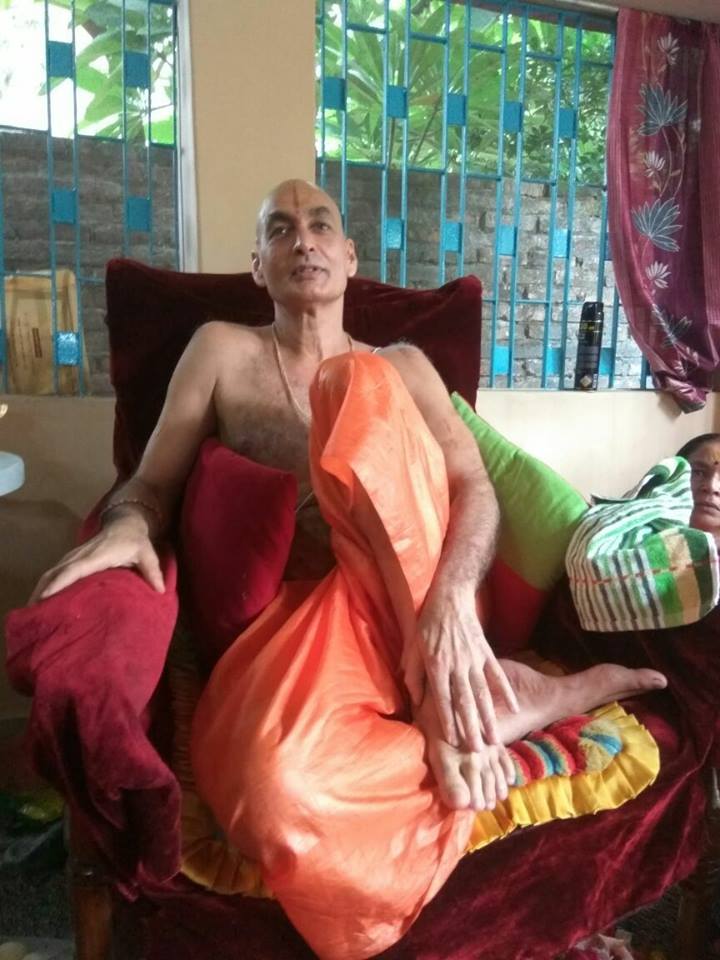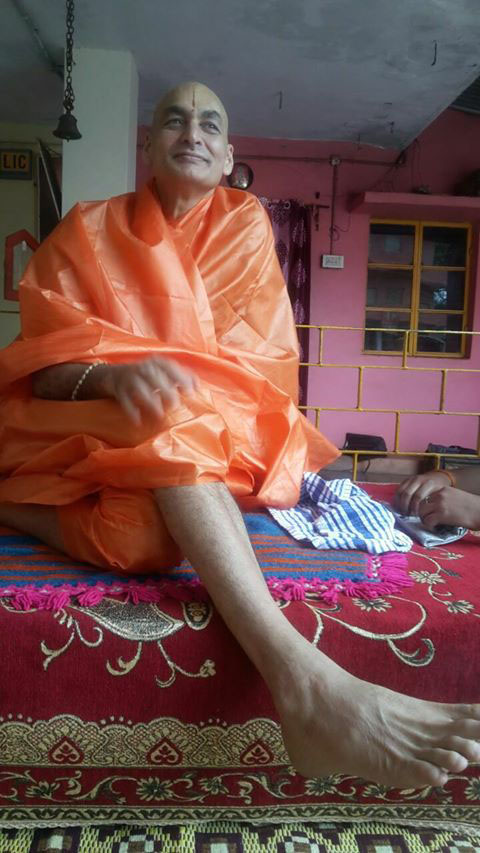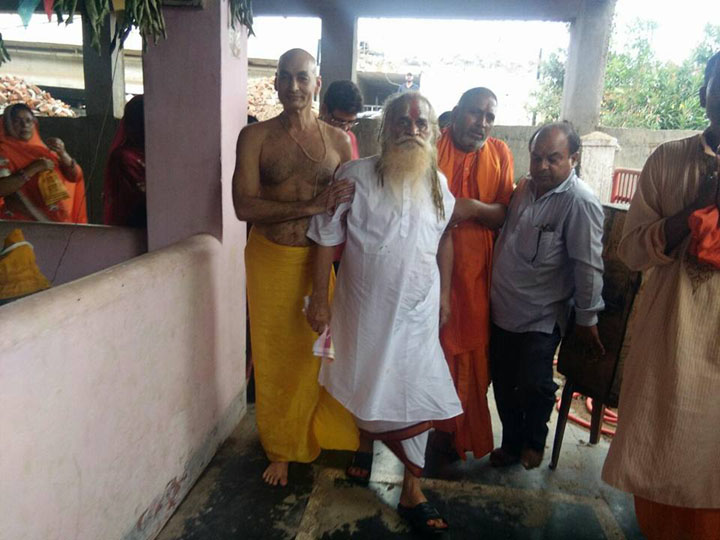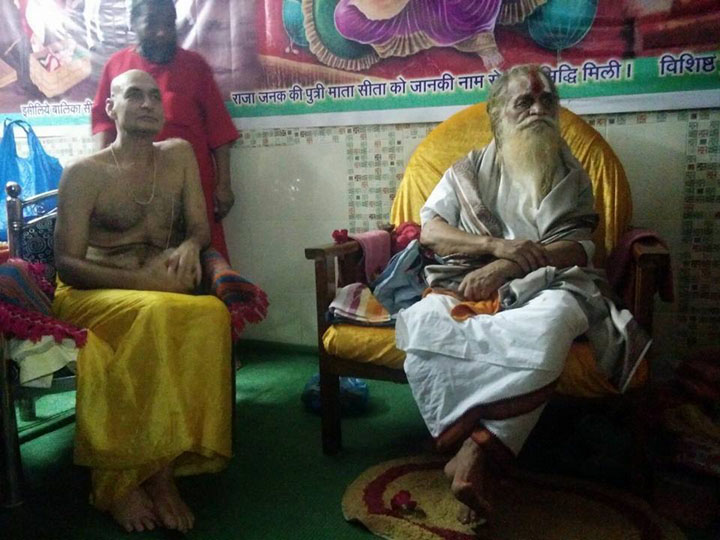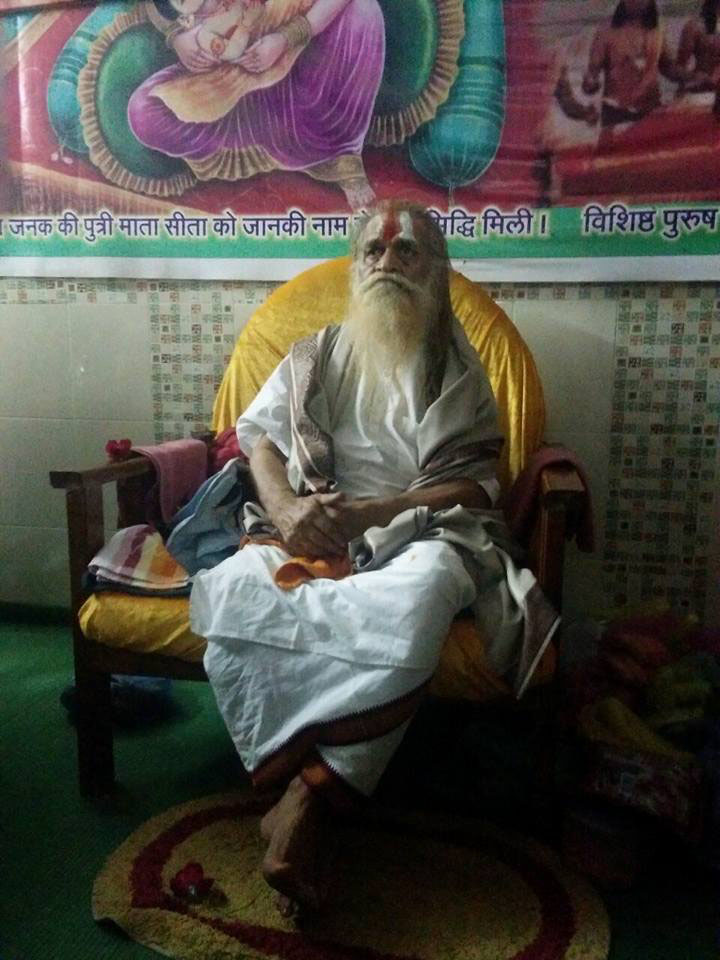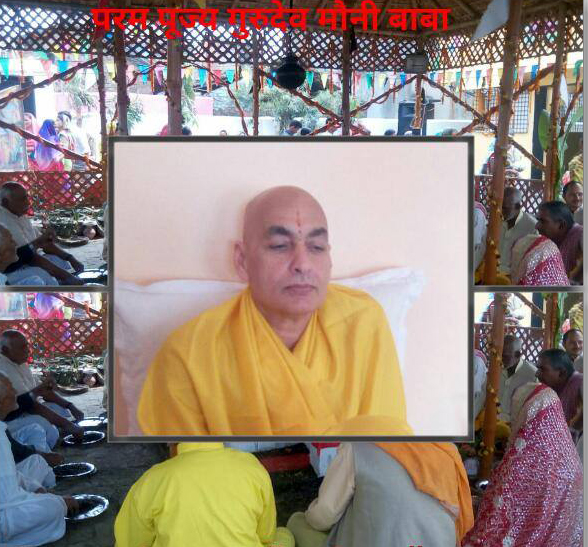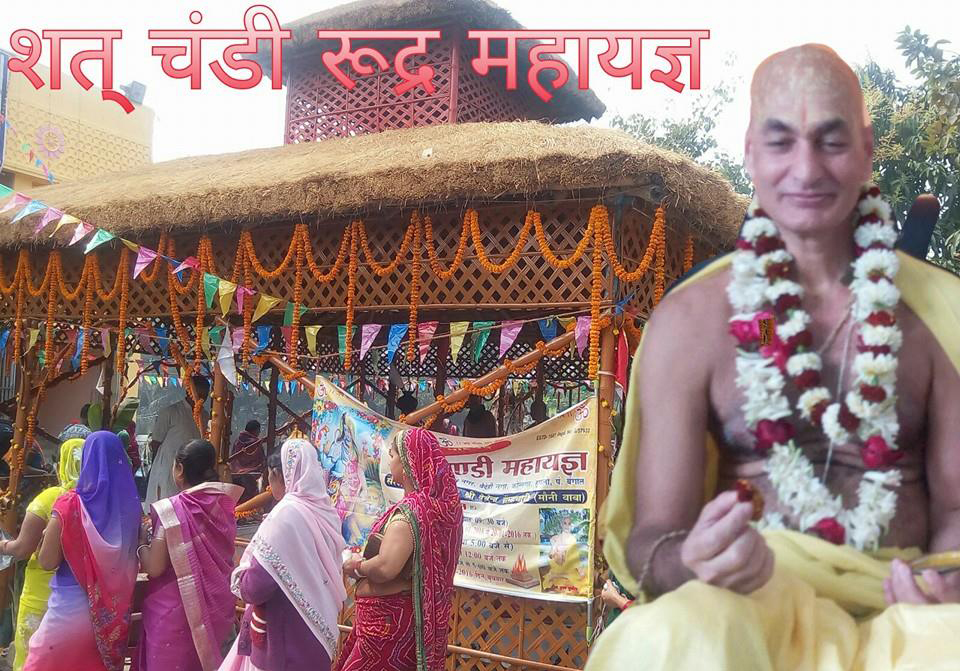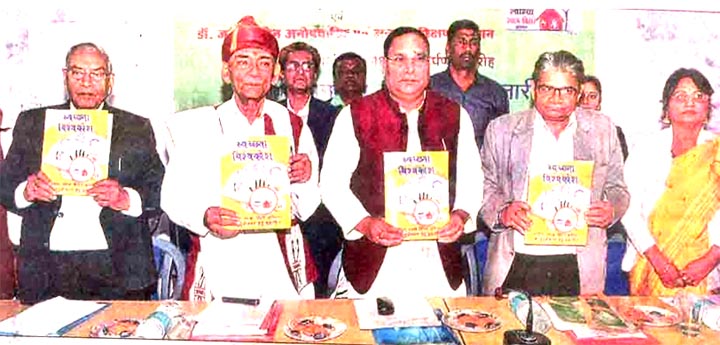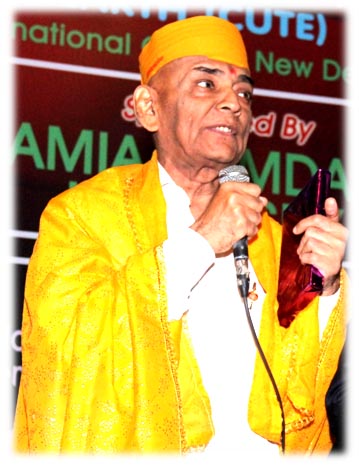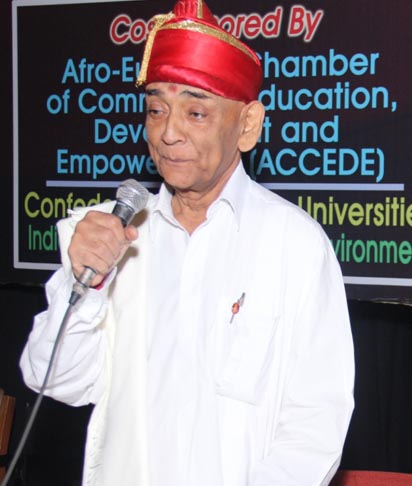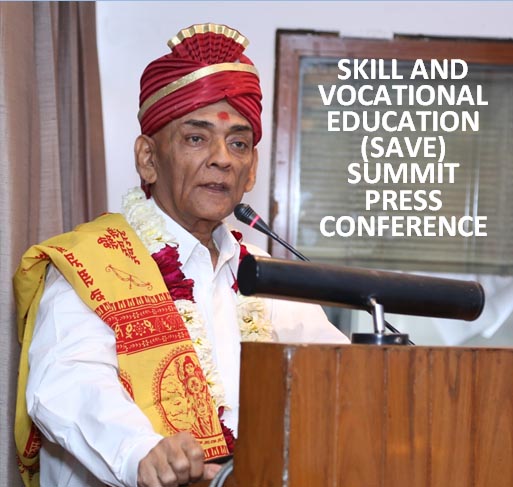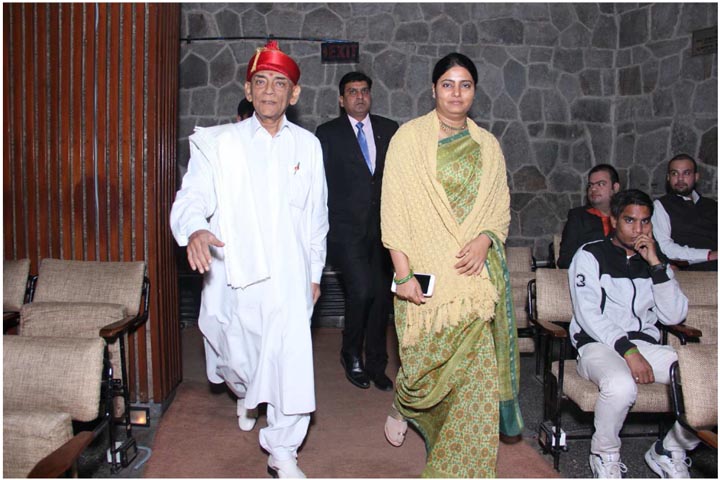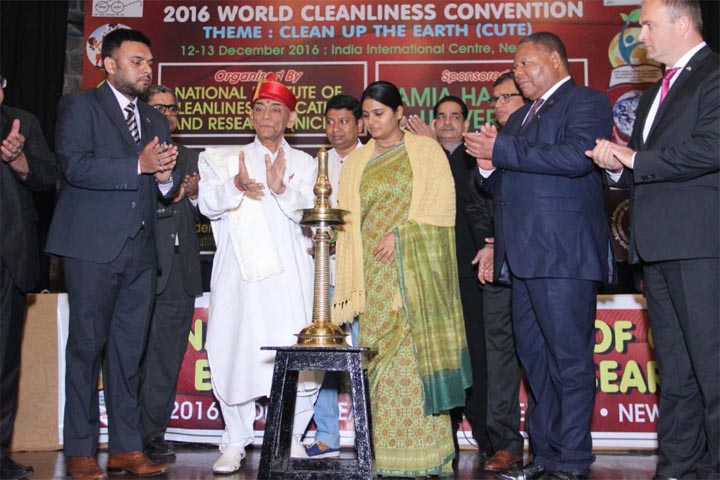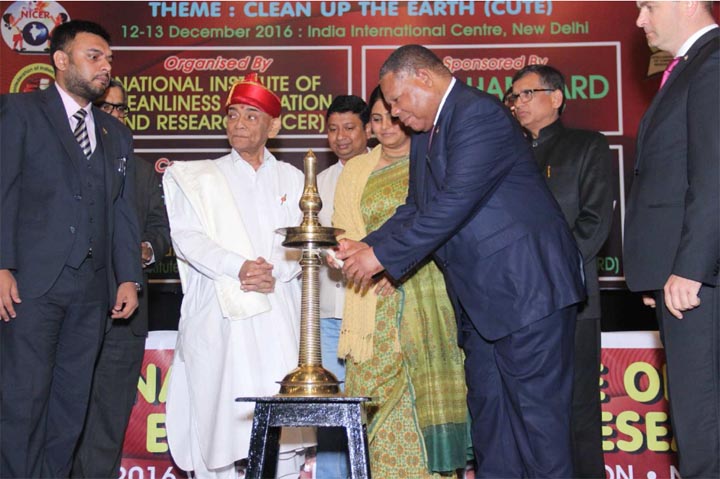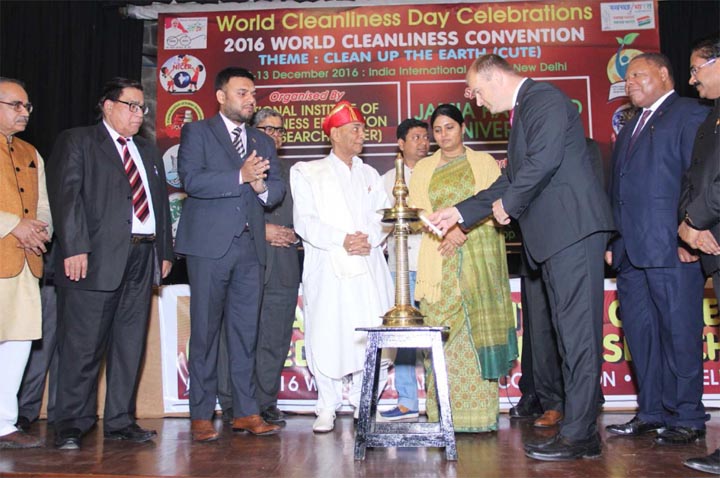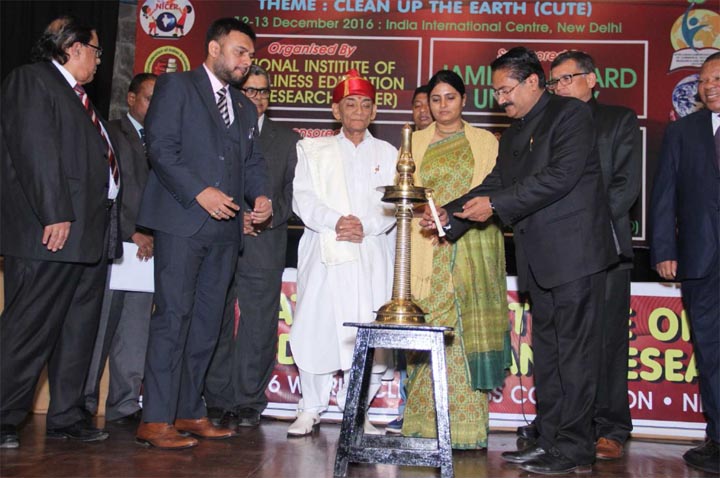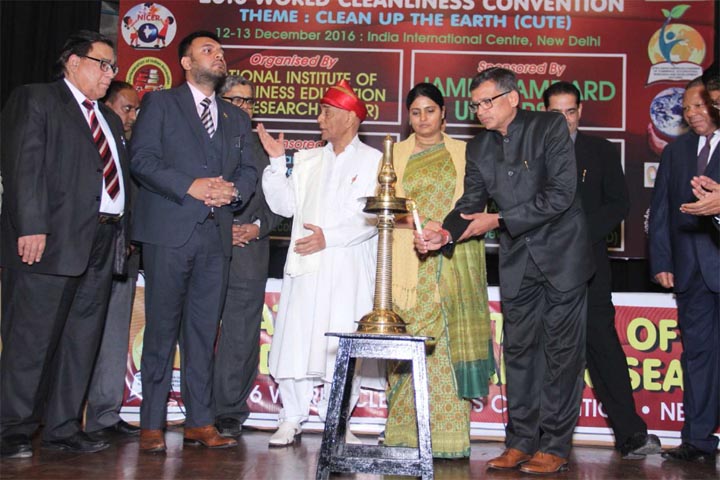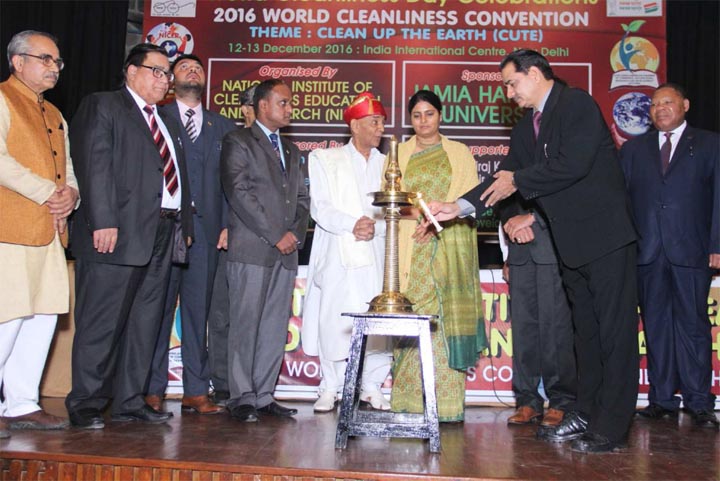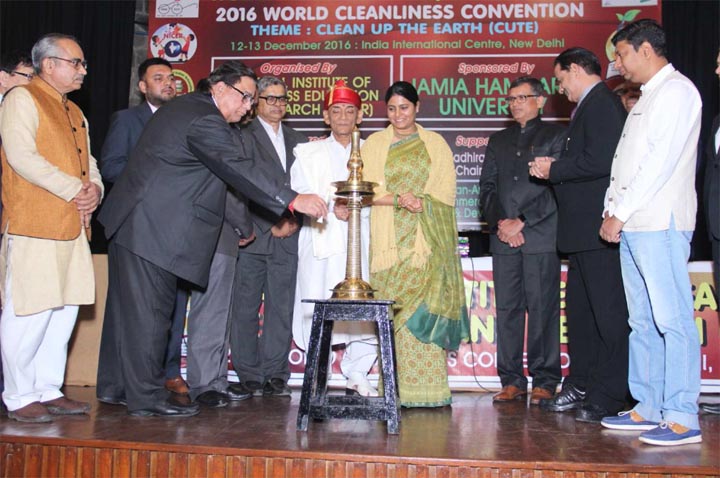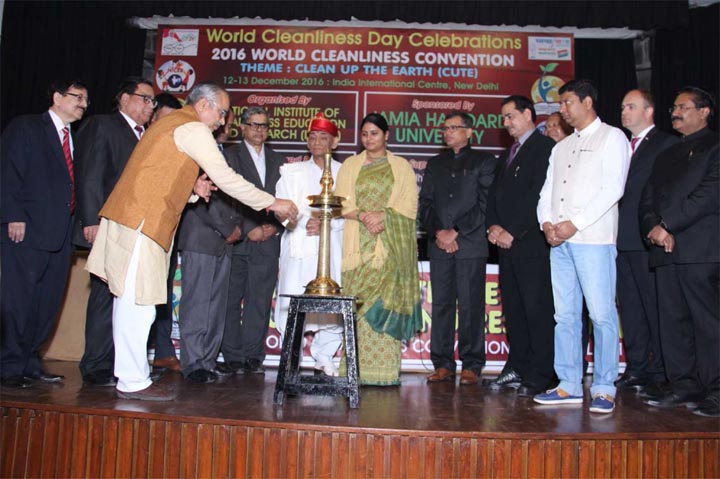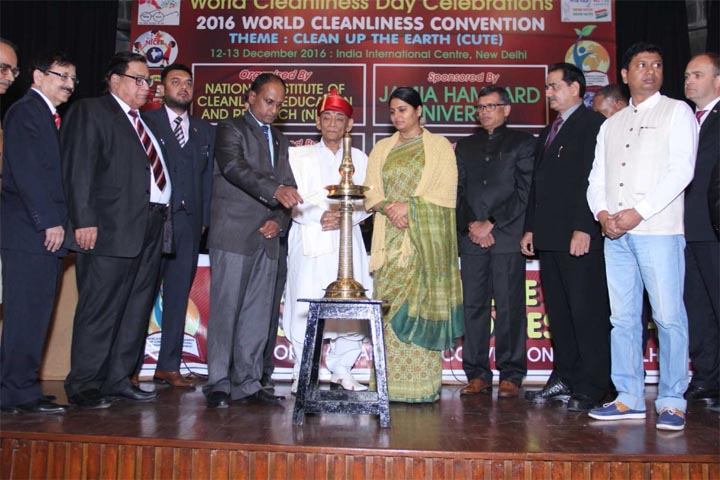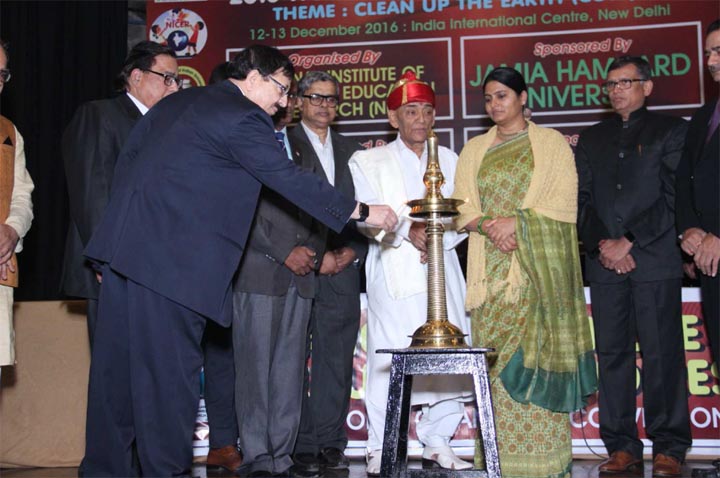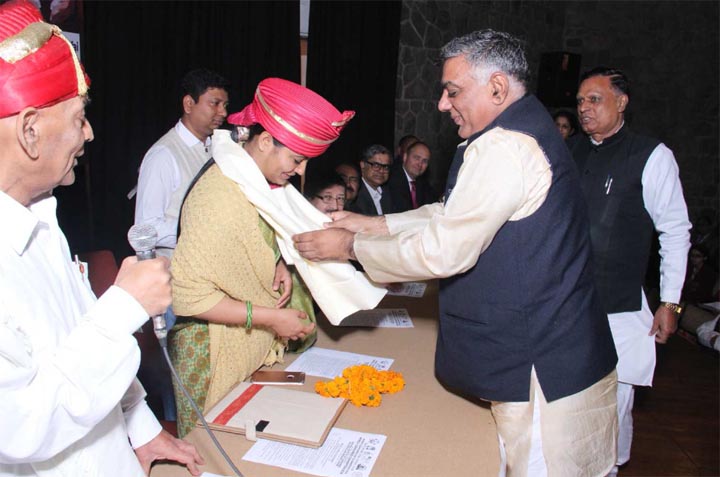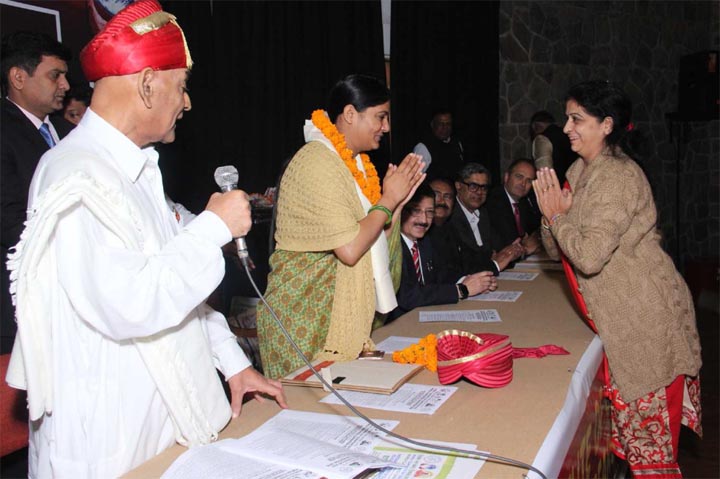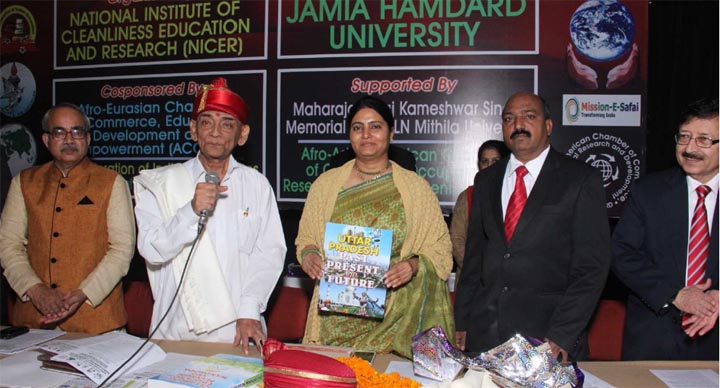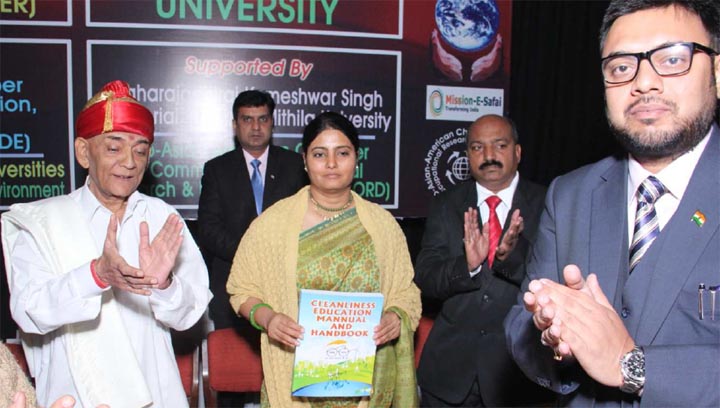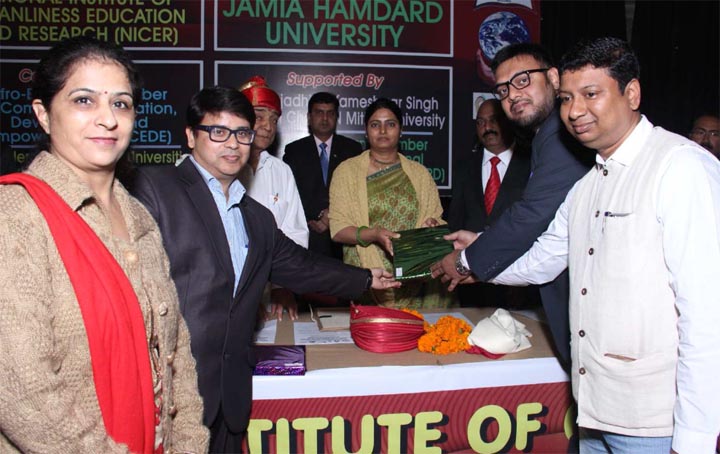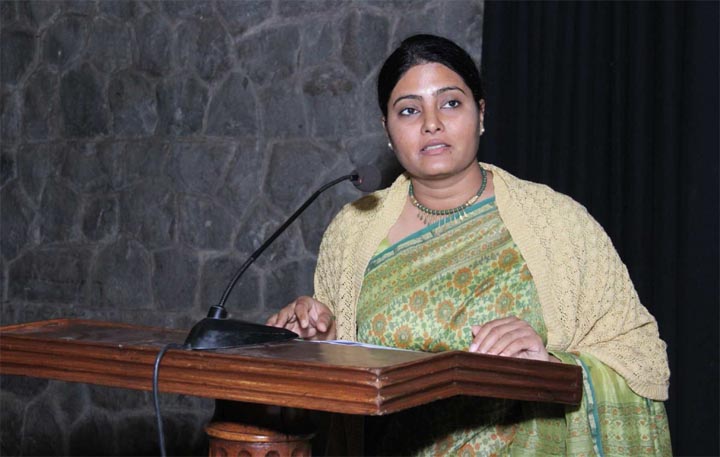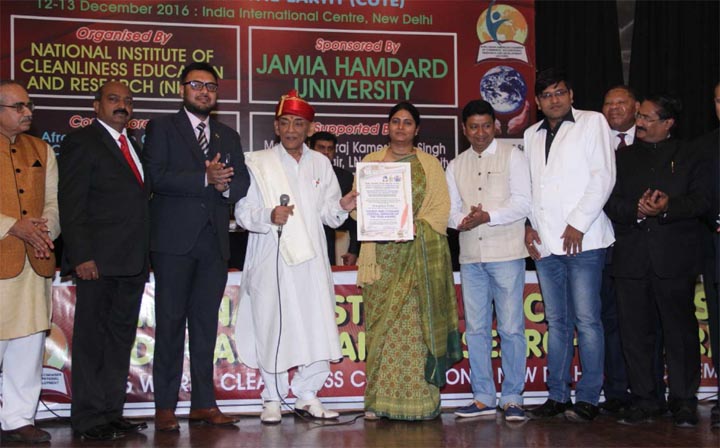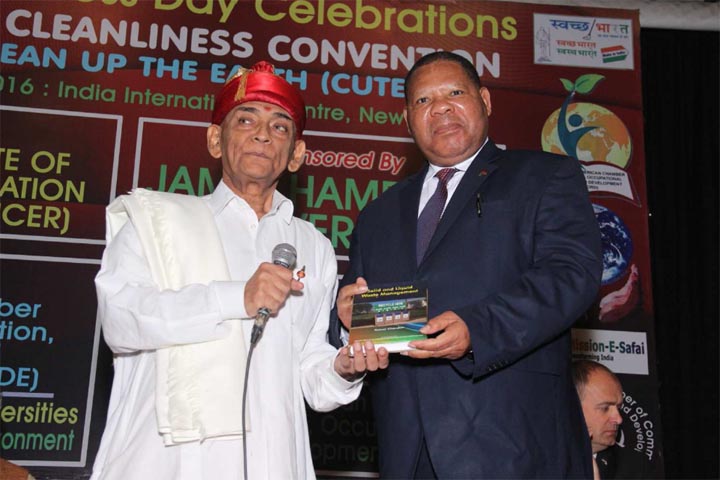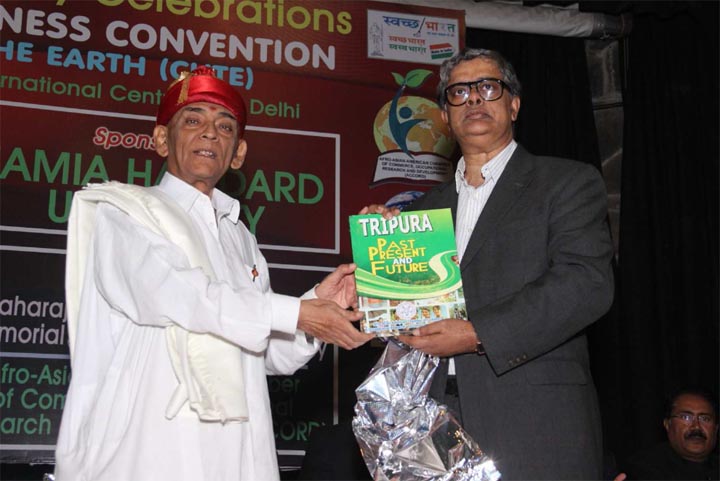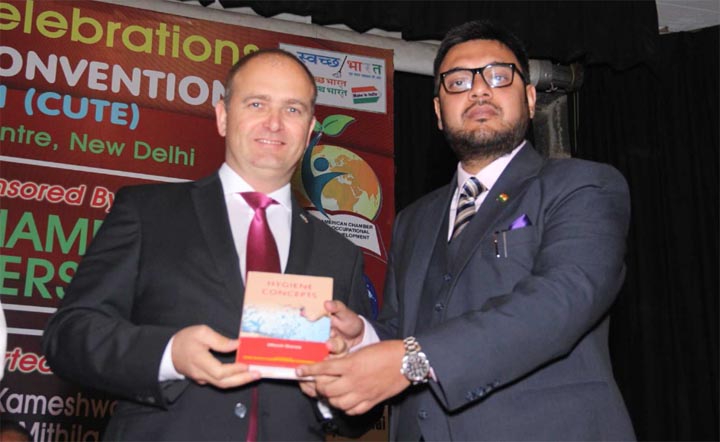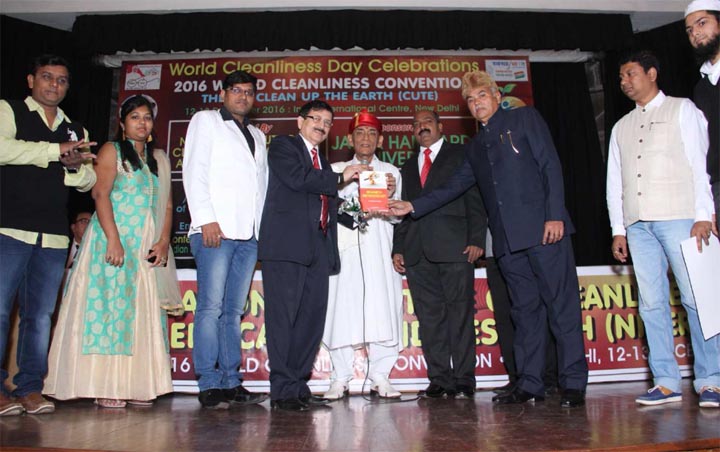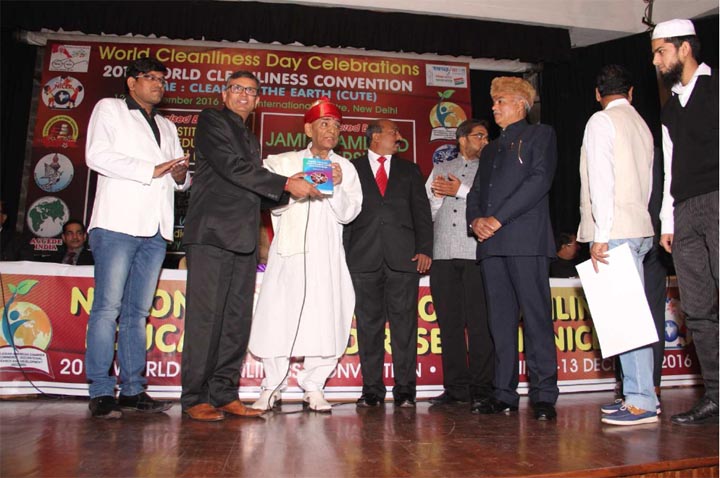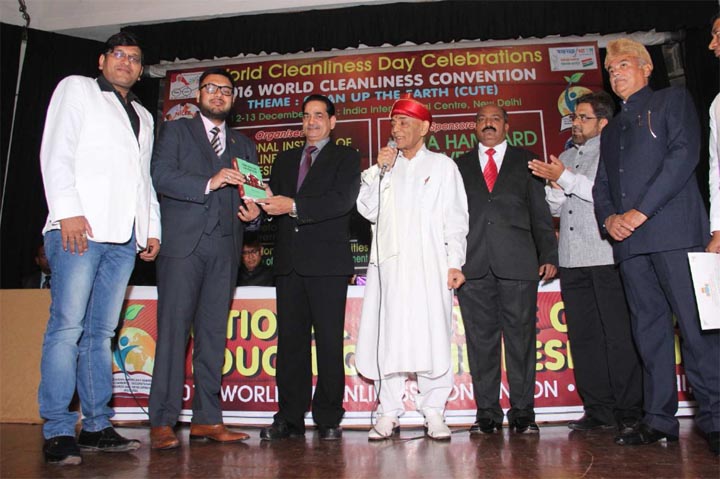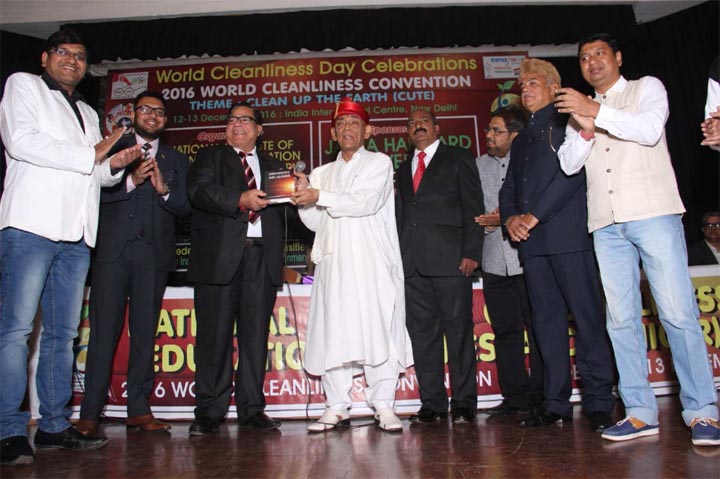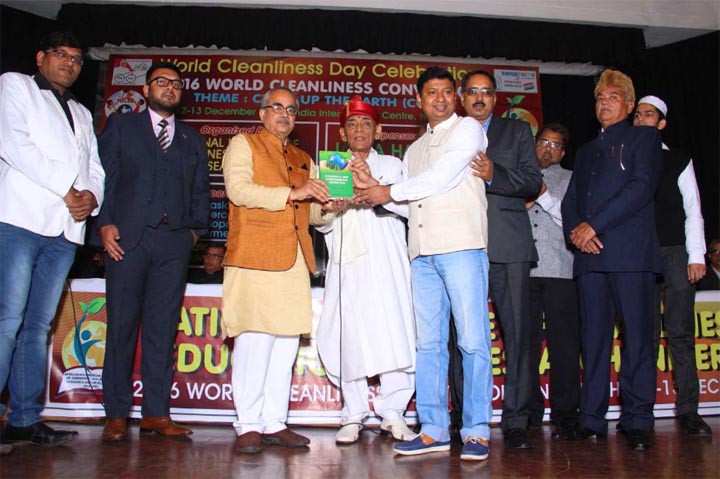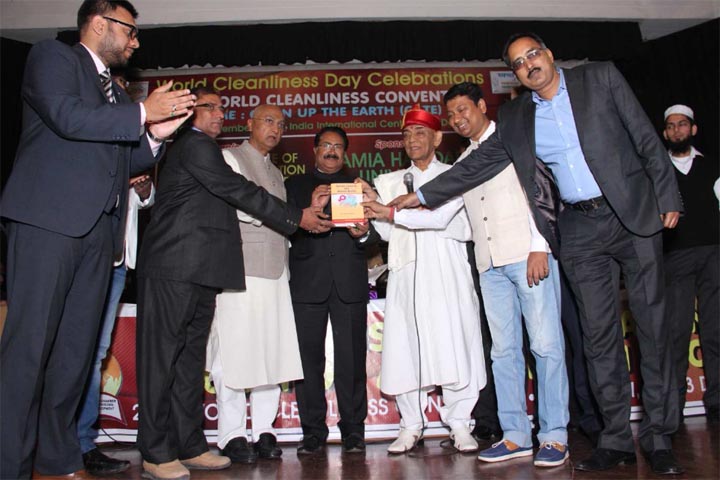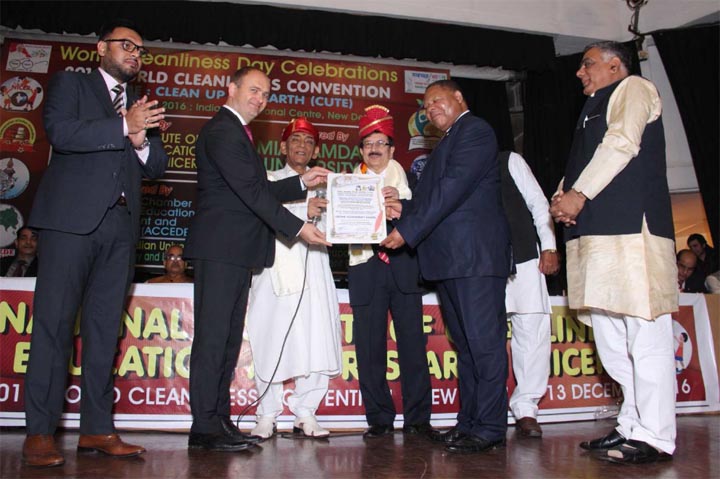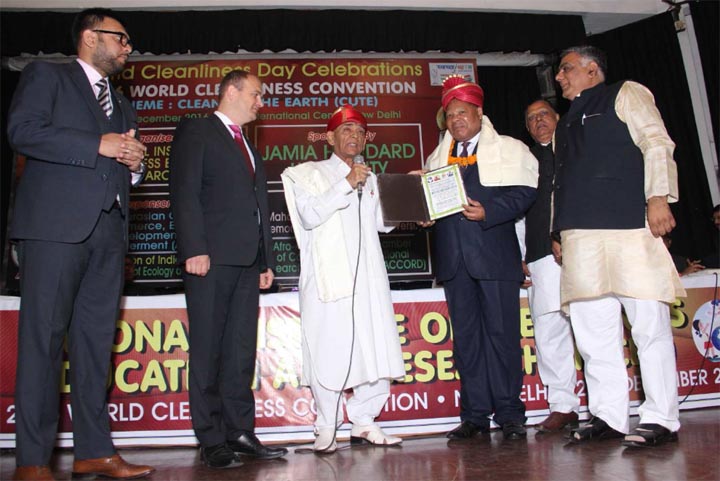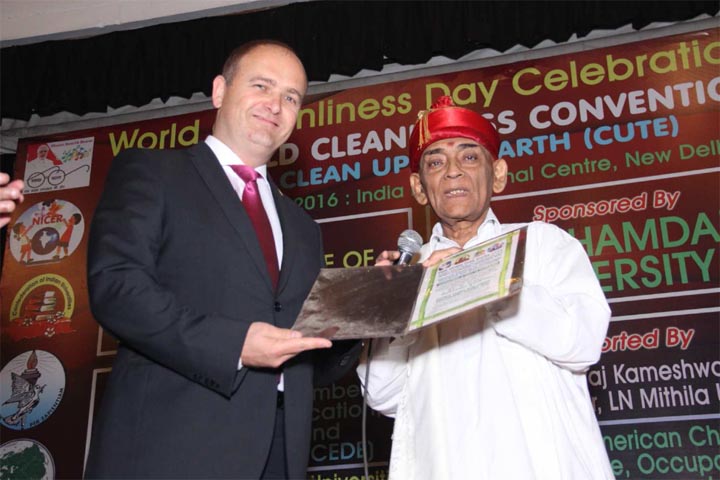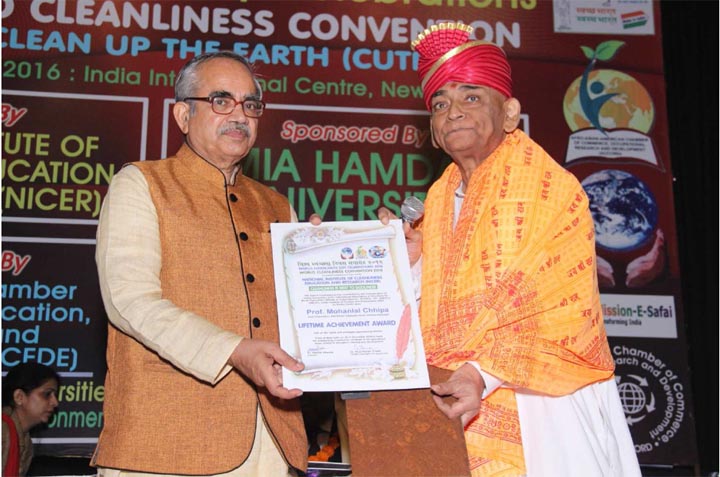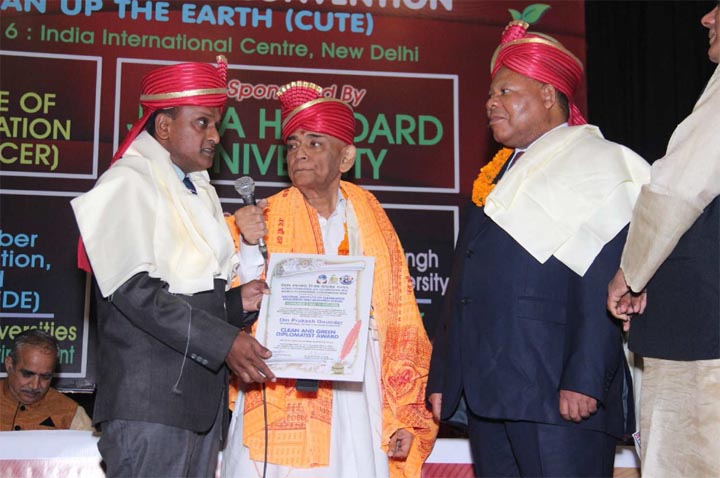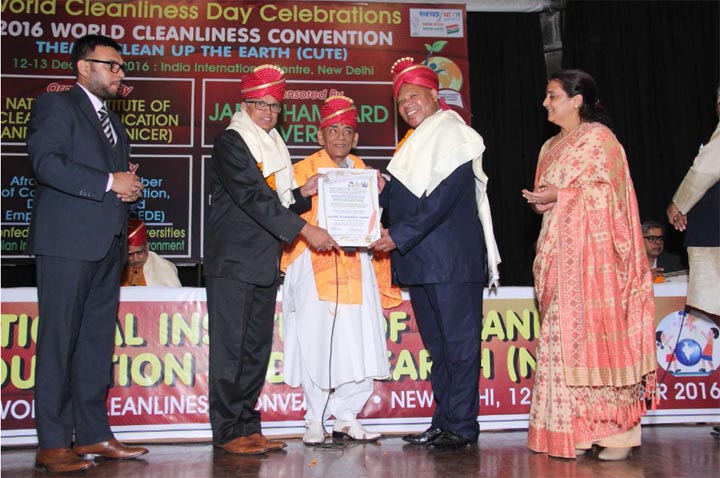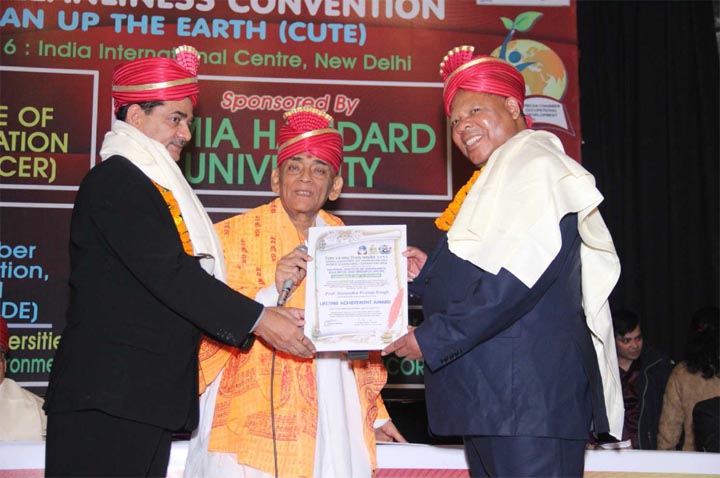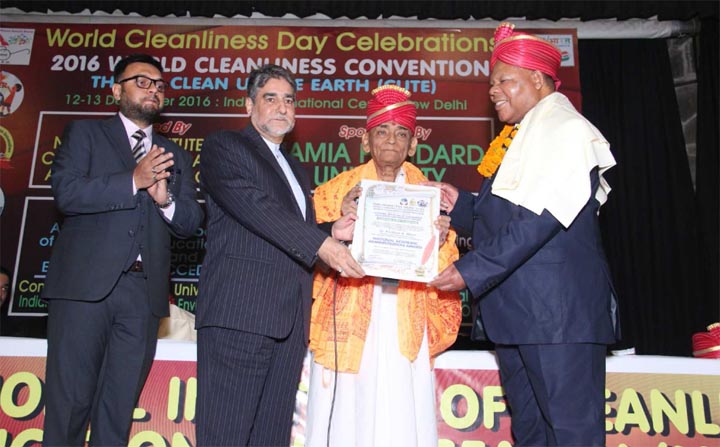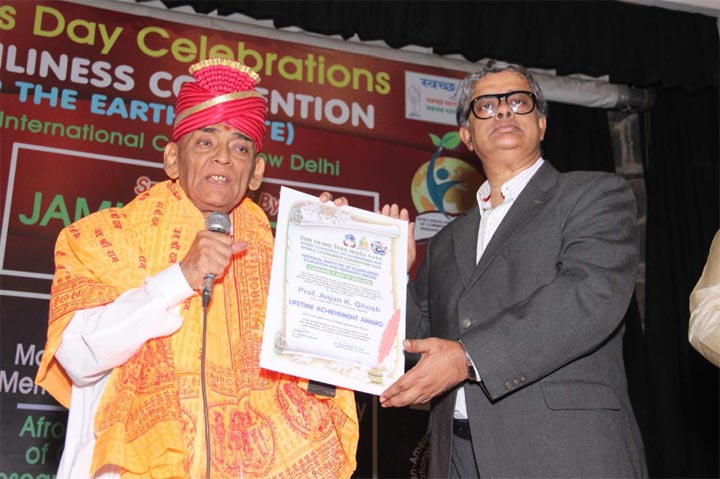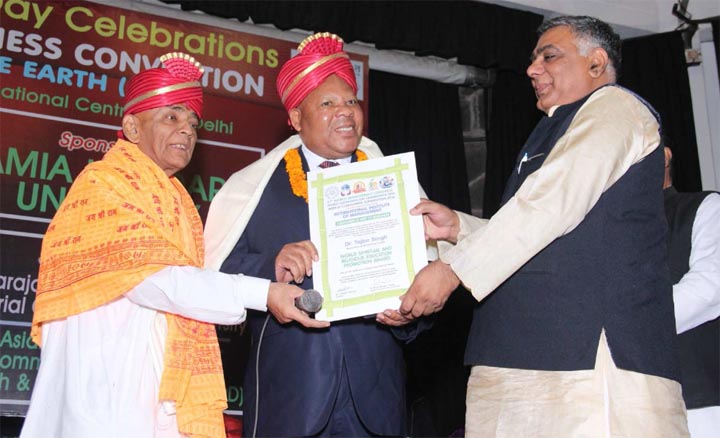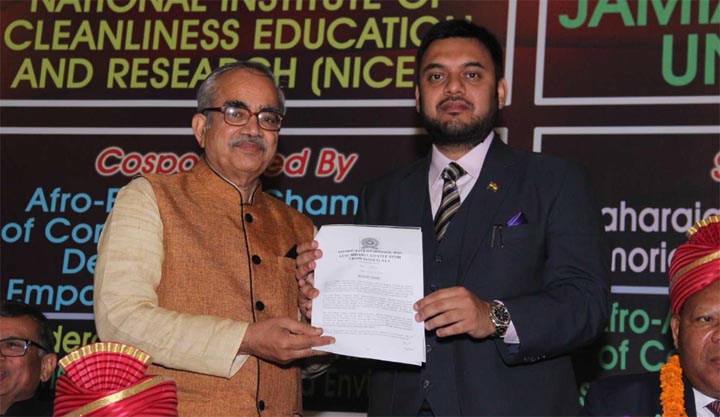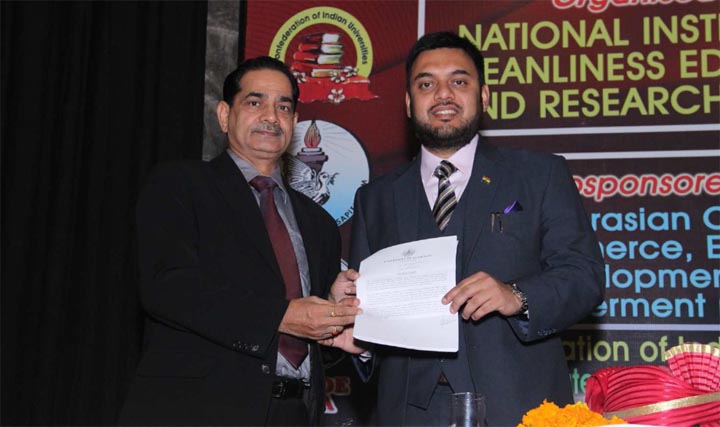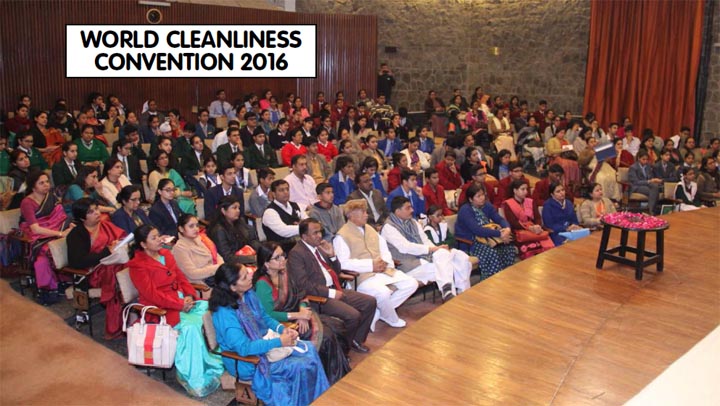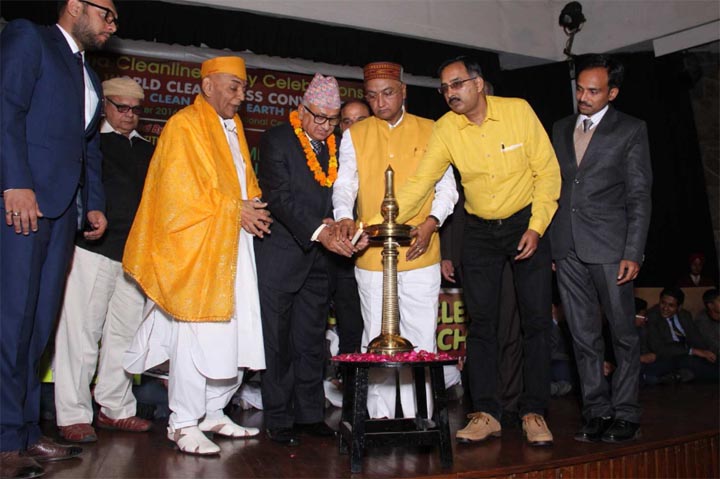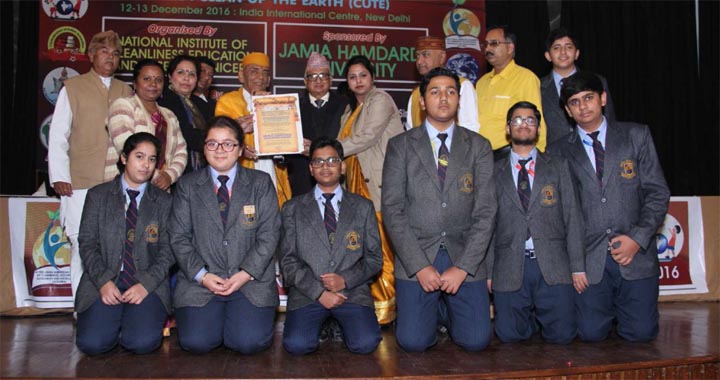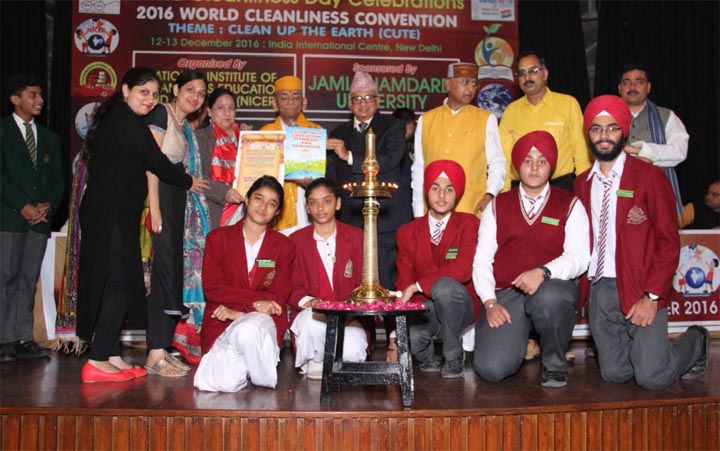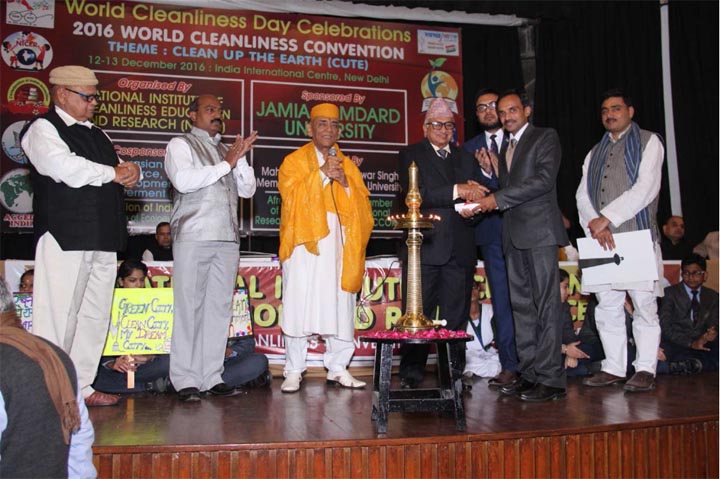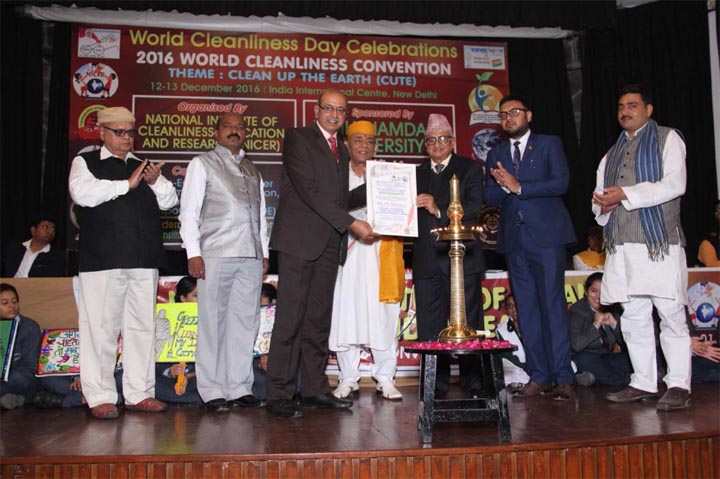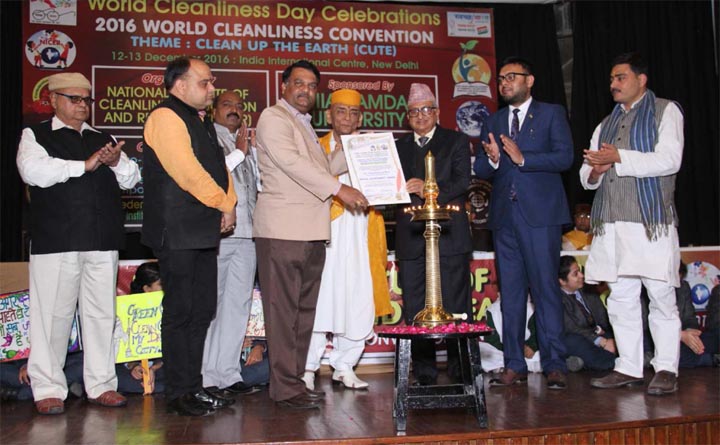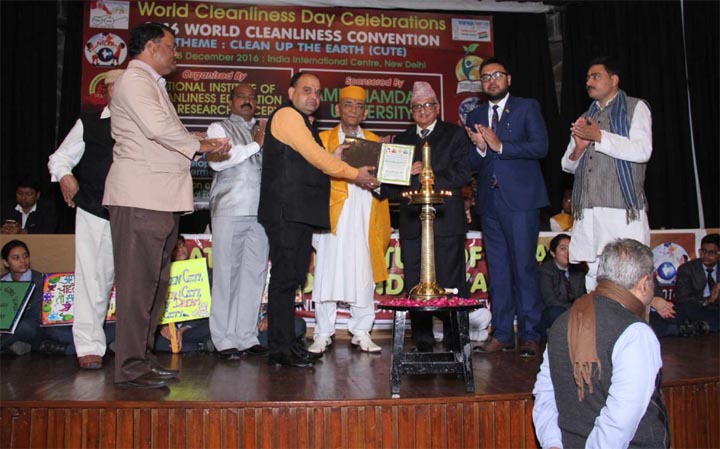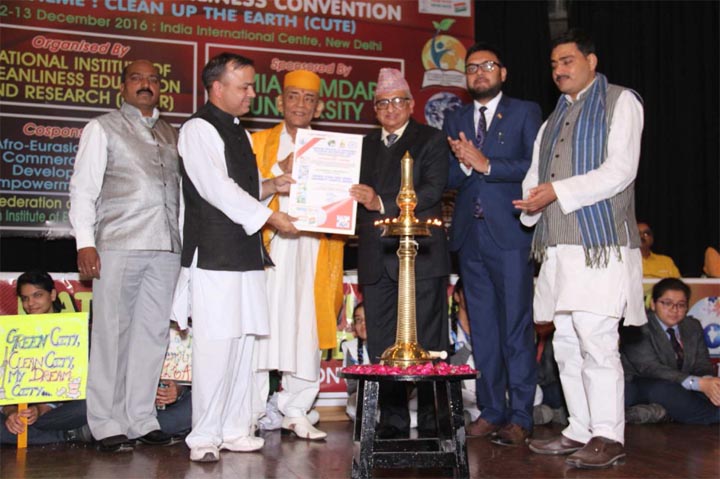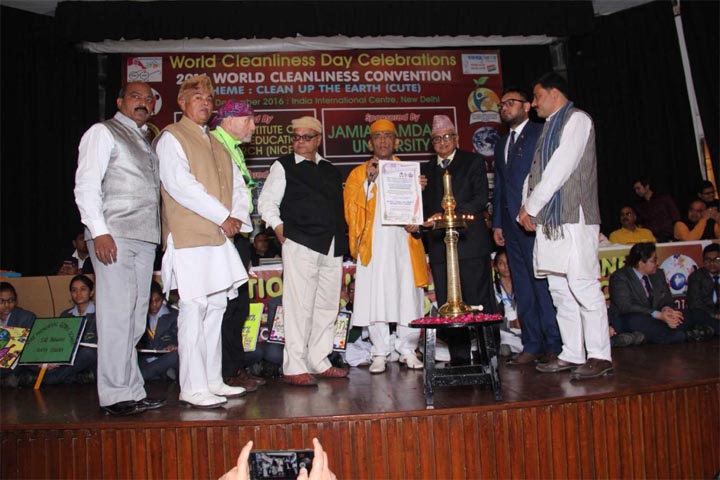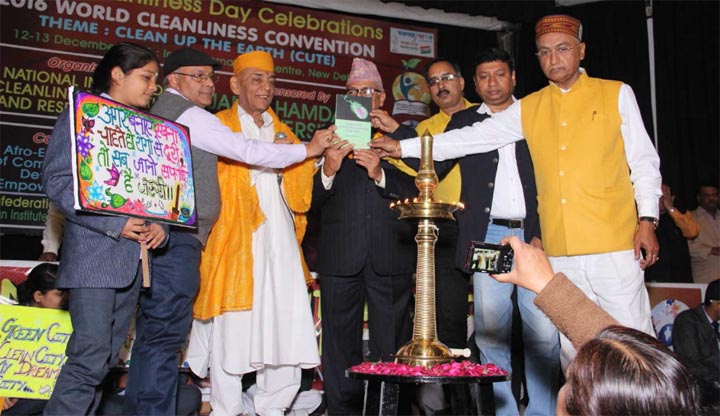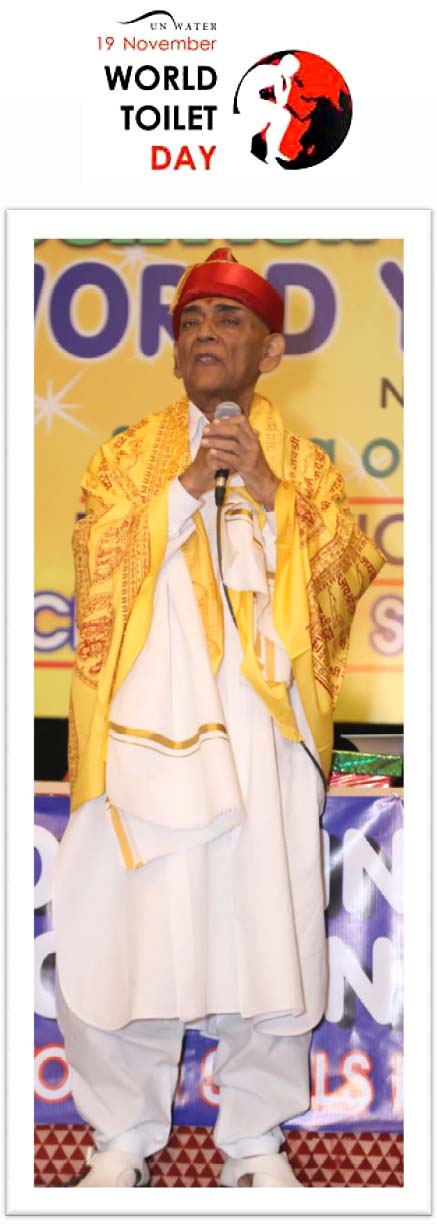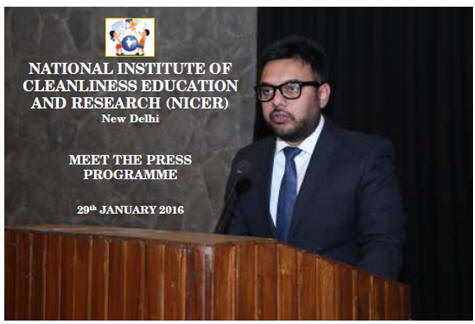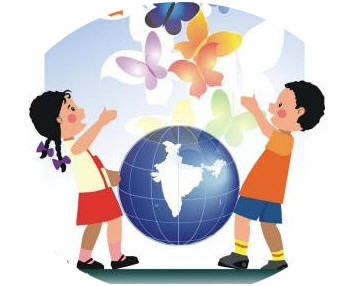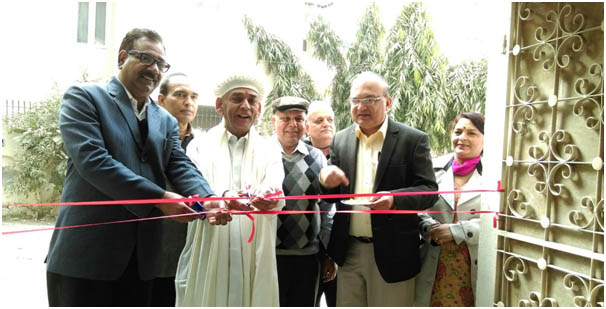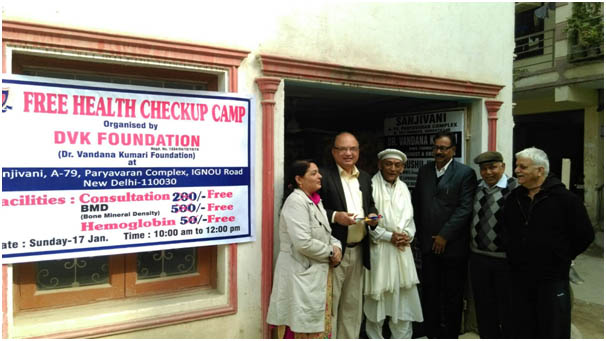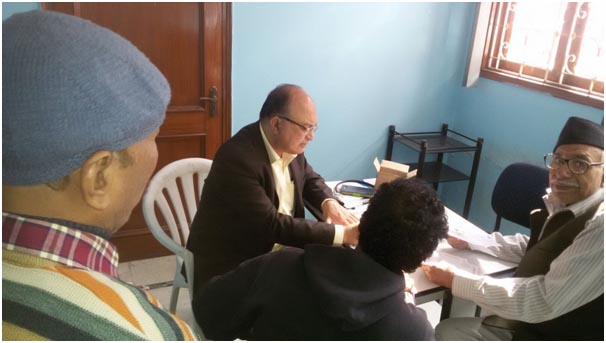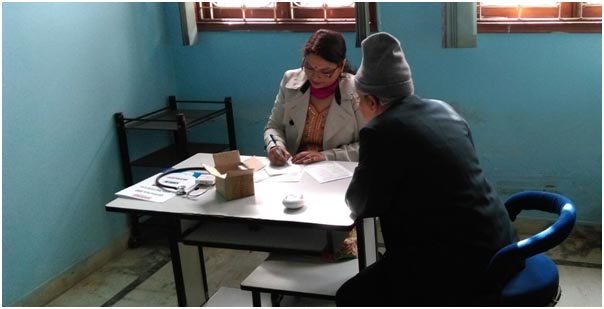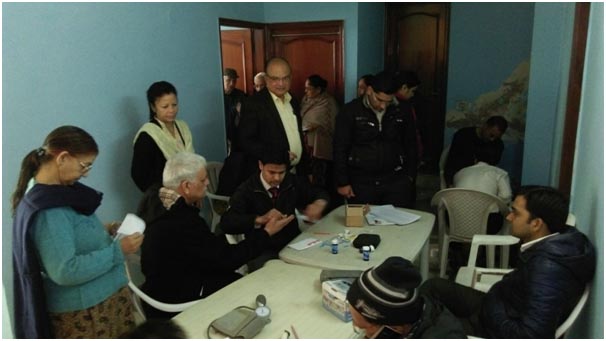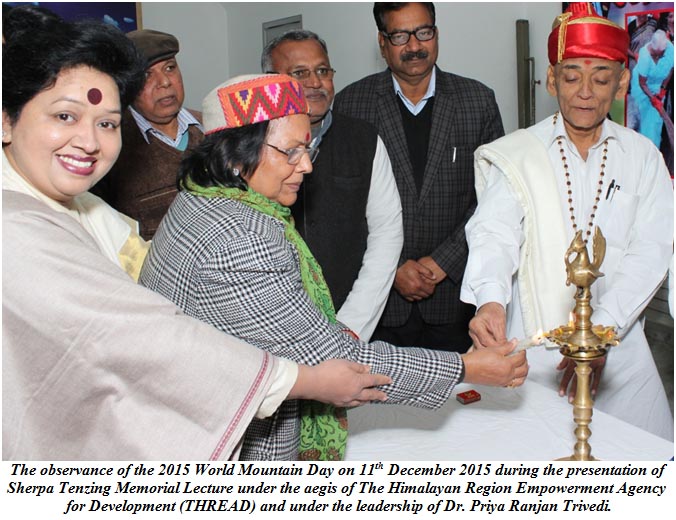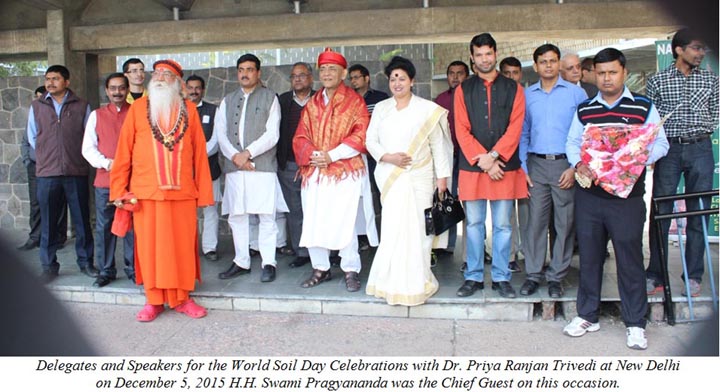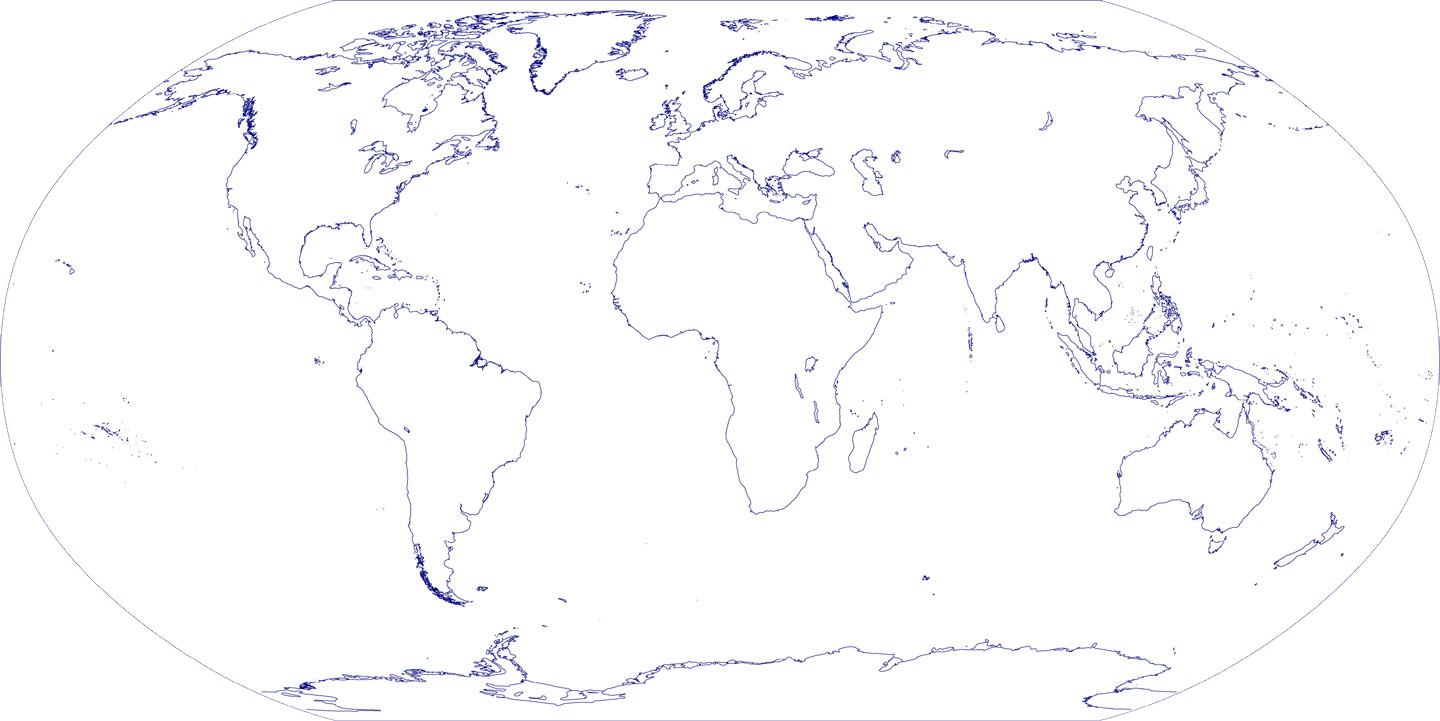INSIST |
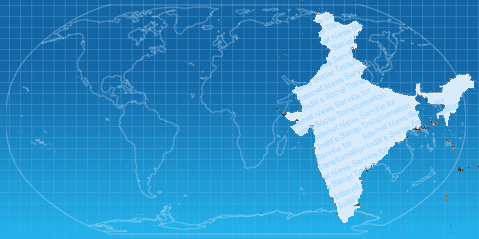 |
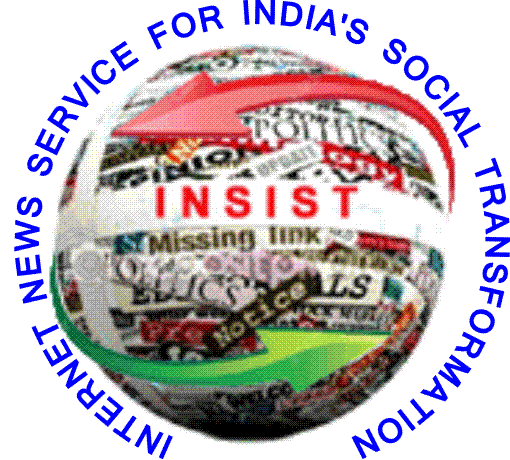 News and Press Release News and Press Release
Internet News Service for India's Social Transformation (INSIST) has been established by leading intellectuals, social scientists, policy makers and educators with a view to propagating news relevant to education and national development. Different types of news, notifications and releases are put on this website. Click any news |
|
|
Deoghar, Jharkhand, 09 March 2018
।। जय गुरु देव ।। ॐ नमो भगवते वासुदेवाय ।।
|
|
|
Deoghar, Jharkhand, 01 March 2018
।। जय गुरु देव ।। ॐ नमो भगवते वासुदेवाय ।। परम पूज्य गुरुदेव मौनी बाबा जी महाराज के दिव्य संरक्षण में पंच दिवसीय महाविष्णु यज्ञ का भव्य आयोजन भोलेबाबा की पावन नगरी बैद्यानाथधाम(देवघर)में दिनांक 6 मार्च 2018 ,से 10 मार्च 2018 तक हो रहा है I (स्थान --मौनी बाबा आश्रम, चांदपुर डाबर ग्राम ,बैद्यनाथधाम ,झारखंड)
|
|
|
Muraitha Dham, Darbhanga, Bihar, 26 February 2018 News on 6 days Sree sree 1008 maharudra YAJNA (YAGYA), srimadbhagwat katha akhandram dhun ramayan path, pravachan evam kirtan BEING PERFORMED UNDER THE DIVINE PATRONAGE OF MAUNI BABA FOR BRINGING WORLD PEACE ON THIS MOTHER EARTH AND FOR WELFARE ORIENTED WELTANSCHAUUNG (कल्याणमुख विश्वदृष्टि) at MAUNI BABA ASHRAM, mahadev sthan, muraitha dham, darbhanga, bihar between 23 February to 01 march 2018.
|
|
|
Dalli Rajhara, Mahamaya, Chhattisgarh, 12 February 2018 News on 5 days shivashakti MAHA YAJNA (YAGYA), manas parayan and ram nam maha yajna (yagya) BEING PERFORMED UNDER THE DIVINE PATRONAGE OF MAUNI BABA FOR BRINGING WORLD PEACE ON THIS MOTHER EARTH AND FOR WELFARE ORIENTED WELTANSCHAUUNG (कल्याणमुख विश्वदृष्टि) at MAUNI BABA ASHRAM, MAHAMAYA MANDIR, MAHAMAYA MINES, NEAR DALLI RAJ HARA, CHHATTISGArh. between 10 - 14 February 2018.
|
|
|
Dalli Rajhara, Chhattisgarh / Kolkata, 18 January 2018
|
|
|
Laganama Dham, Muraitha, Darbhanga, Bihar 4 November 2017 sitaram nam mahayagya BEING PERFORMED uNDER THE DIVINE PATRONAGE OF MAUNI BABA FOR BRINGING WORLD PEACE ON THIS MOTHER EARTH AND FOR WELFARE ORIENTED WELTANSCHAUUNG (कल्याणमुख विश्वदृष्टि) at Laganama Dham, Muraitha, Darbhanga, Bihar between 1-4 November 2017. |
|
|
|
|
| Dalli Rajhara, Chhattisgarh, 5 July | |
|
|
|
| Sitamarhi, Bihar, 5 July 2017 | |
| Guru Purnima Mahotsav | |
Ceremony of Charan Paduka poojan will be held in Mauni Baba Ashram, Sita Ghat, Sitamarhi, Bihar |
|
Ceremony of Charan Paduka poojan of His Holiness Shri Shri 1008 Shri Mauni Baba Ji Maharaj will be held on 9th July 2017, Sunday at 9.30 am at Mauni Baba Ashram, Sita Ghat, Sitamarhi, Bihar. On this auspicious occasion you all are invited to join the ceremony. |
|
|
|
|
| Dalli Rajhara, Chhattisgarh, 4 July 2017 | |
|
Foundation Day Celebration of Shri Ram Mandir Dalli Rajhara today on 3 July 2017, It has completed its 30th year of glory at Dalli Rajhara, Chhattisgarh. |
|
| On this special occasion His Holiness Mauni Baba has visited the Shri Ram Mandir on 3 July 2017 blessed the august gathering. The Ramayan and Sundar Kand has been read out. On this day Sant Vaidehi Sharanji Maharaj organised a Bhandara. | |
|
|
|
|
|
|
| Rajnand Gaon., Chhattisgarh, 3 July 2017 | |
|
|
|
|
Dalli Rajhara, Chhattisgarh / Kolkata, 18 January 2016 |
|
|
To know about Mauni Baba please visit the website www.maunibaba.net / www.maunibaba.in |
|
|
Patna, 22 December 2016
Hindi Edition of Cleanliness Manual and Handbook Brought out for Strengthening “Lohia Swachchh Bihar Abhiyan” released by the Urban Development Minister of Bihar Shri Maheshwar Hazari |
|
|
The specially designed Book in Hindi running into more than 500 pages dealing with all aspects of cleanliness, hygiene and sanitation education brought out in Hindi language for the first time in the country jointly by the National Institute of Cleanliness Education and Research (NICER) with technical guidance from the Confederation of Indian Universities was released today at the IIBM Auditorium by the Urban Development Minister Shri Maheshwar Hazari with a view to strengthen the implementation of Lohia Swachchh Bihar Abhiyan.
In his inaugural address Shri Maheshwar Hazari said that this compendium of information on cleanliness written in simple Hindi language by the two great institution builders Dr. Priya Ranjan Trivedi and Dr. Uttam Kumar Singh will go a long way in the successful organization and implementation of Lohia Swachchh Bihar Abhiyan as envisaged by the Chief Minister Shri Nitish Kumar.
Shri Hazari further added that the Municipal Corporations will be buying garbage and wastes from the household so that the same is reused and recycled with the technologies detailed in this Book and as per the suggestions to be given by the Authors for ensuring generation of environment friendly jobs in the State of Bihar.
The Minister also announced that the dustbin will also be provided among the households provided they keep them safely for further use. Discussing the utility of garbage the Minister said that garbage and wastes are now important components for producing organic fertilizers and generating alternate energy.
Thanking the State Government for taking initiatives for bringing cleanliness in the State of Bihar, the Author of the Book and the President of the Confederation of Indian Universities (CIU), Chancellor Dr. Priya Ranjan Trivedi said that he is longing for a day when garbage will be stolen if not smuggled. He hoped that the young boys and girls from Bihar will acquire specialized skills in the areas of garbage management and waste recycling by becoming job givers rather than job seekers by venturing into entrepreneurial leadership. He also assured the Minister for providing fuller guidance for the establishment of a State level Apex Institution and a resource centre to be legislated by the State Legislated Assembly for teaching and research in the areas of cleanliness, hygiene and sanitation education right from school level to college and university levels for effective utilization of the natural resources besides the appropriate use of garbage and waste materials through new technologies related to recycling.
Appreciating the excellent contribution of Dr. Priya Ranjan Trivedi and Dr. Uttam Kumar Singh in the areas of institution building, planning and development not only in India and Bihar but all over the world, the world renowned Linguist Dr. Damodar Thakur said that from generations Indians have been maintaining cleanliness while worshiping specially in their homes. He also hoped that Indians learn as to how to clean up the neighbourhood which is very important and in this context their was an urgent need for cleaning up the temples, mosques, churches, monasteries, gurudwaras and other religious outfits.
The Co-Author of the Book and Director General of IIBM-Zakir Husain Group of Institutions, Colleges and Universities, Dr. Uttam Kumar Singh said that plans have been designed by his Group of Institutions for covering the entire State for teaching cleanliness as a mass movement. He invited all the District Magistrate to seek cooperation from the National Institute of Cleanliness Education and Research (NICER), New Delhi for signing an MoU for mutual an technical cooperation on a continuing basis.
The Master of Ceremonies Dr. Samir Kumar Singh lauded the efforts of the Minister Shri Maheshwar Hazari in bringing sanitation education in the State and hoped that he will be successful in his efforts in providing a better habitat and shelter for all in the coming decade in the State where cleanliness, hygiene and sanitation will be the topmost priority. At the end, Dr. Jagadanand Jha, Director of Dr. Zakir Husain Institute and the Former Registrar of L.N. Mishra Institute of Economic Development and Social Change proposed a hearty vote of thanks.
|
|
|
New Delhi, 31 December 2016
|
|
|
Dedicating the 24 Volume World Encyclopaedia of Nanoscience and Nanotechnology to the world citizenry on the eve of the New Year 2017, the world renowned environmental scientist and didactics Dr. Priya Ranjan Trivedi said that under the aegis of the World Institute of Nanotechnology (WIN), established as a CSR initiative of Computers (India) Limited, more researches will be conducted in the areas of nanoscience and nanotechnology and that the entire lifestyle and the manufacturing processes will be revamped by the effective use of small apparatus and equipment by using the art and science of nanotechnology.
Dr. Priya Ranjan Trivedi added that research based volumes in the specialized areas of (i) Nanotechnology Today; (ii) Emerging Areas of Nanotechnology; (iii) Applied Areas of Nanotechnology; (iv) Future of Nanotechnology; (v) Nanotechnology Concepts; (vi) Nanoparticles and Nanomaterials; (vii) Nanoelectronics and Nanomaterials; (viii) Nanotechnology Revolution; (ix) Nanomachanics and Nanomachines; (x) Recent Advances in Nanotechnology; (xi) Nanotechnology Information Resources; (xii) Health and Safety Applications of Nanotechnology; (xiii) Historical Developments in Nanotechnology; (xiv) Nanobiology and Nanomachines; (xv) Nanochemistry; (xvi) Nanophysics; (xvii) Nanoengineering; (xviii) Nanocomputers; (xix) Nanoelectronics; (xx) Nanobiotechnology; (xxi) Nanoeducation; (xxii) Nanolab; (xxiii) Nanoresearch; and (xxiv) Lexicon on Nanotechnology have been brought out for the benefit of scientists, researchers, policymakers, educators, professors and industry based professionals.
He invited the universities, colleges, institutions, ministries, departments and autonomous organizations to take benefit from this Encyclopaedia of 24 Volumes costing Rs. 58,500 only. He suggested that contact could be made through email on Email ID : [email protected] for placing orders and for receiving the Set of Encyclopaedia on a priority basis.
He predicted that different components produced with the help of nanoscience and nanotechnology will create a business of one trillion dollars and employment for at least two million young boys and girls in India.
Appreciating the researches in the areas of nanoscience and
nanotechnology,
Stressing the need for studies, teaching, training and applied researches in the specialized areas of nanoscience and nanotechnology, Dr. Trivedi said that there will be a revolution in the area of agriculture, farm management, pomology, food processing very soon with the introduction of nanotech based technologies to be transferred with a view to increasing productivity in the agriculture sector with a view to bringing the farmers above the poverty lines.
Advocating to strengthen the cause of Skill India, Make in India, Start Up India, Clean Up India and similar campaigns and announcements made by the Prime Minister Hon’ble Shri Narendra Modi and his Cabinet Colleagues for making the prosperous India, Dr. Trivedi said that the emerging appropriate techniques being developed in the areas of nanoscience will revolutionize the new and emerging area of rural and urban entrepreneurship. The problems relating to unemployment, peacelessness, pollution and population explosion will be reduced by creating alternative and sustainable jobs in India with the help of nanotechnology, Dr. Trivedi finally opined. |
|
|
New Delhi, 28 December 2016 CLEANING THE IVORY TOWERS : CLEANLINESS RELATED TRACK RECORDS OF UNIVERSITIES (CIU’s 13th Anniversary to be observed on 12th March 2017) |
|
Giving fuller details regarding the publication of The Indian Universities Directory 2017 to be brought out by the Confederation of Indian Universities (CIU) on 12th March 2017 during the 13th Anniversary of CIU, its President and Plenipotentiary Dr. Priya Ranjan Trivedi said that the 13th Annual Day Theme will be relating to cleaning up of the Ivory Towers (i.e. university campuses) by designing a masterplan paradigm for tracking the environmental and cleanliness trace records of the university campuses by also proposing a Set of Action Plans for promoting education relating to cleanliness, hygiene, sanitation and other activities for ensuring a greener and a cleaner environment.
Further elaborating on the theme to be discussed before the release of The Indian Universities Directory 2017, Dr. Trivedi said that the Universities, Colleges, Schools and other educational institutions should teach and demonstrate cleanliness, hygiene, sanitation, environmental and mother earth protection principles and stewardship by taking action to understand and reduce the ecological impacts of their own activities.
He further added that CIU will help cooperate with all the 875 recognised universities in India by guiding the staff, faculty and students by offering detailed “Greening and Cleaning” strategies for those who may have little knowledge and experience with institutional change or with latest eco-friendly technologies.
Dr. Trivedi further explained that in the light of several crores meals served before the students in the hostels besides lakhs of pages of photocopies and several crores gallons of water and several lakhs kWh of electricity and lakhs of tones of solid wastes, there is an urgent need to really focus on food waste, transportation, energy efficiency and procurement practices.
Dr. Trivedi also suggested for changing the practices requiring the personal commitment and direct involvement of all those who have the responsibility for operating in the campuses for maintaining cleanliness, hygiene, sanitation and garbage management.
Dr. Trivedi also invited the Chancellors, Vice Chancellors and other academic leaders from the universities to forward their achievements so that the accomplished individuals and the concerned universities may be felicitated for their contribution towards cleaning and greening besides making a name for their Ivory Towers.
|
|
New Delhi, January 1, 2017
SKILL AND VOCATIONAL EDUCATION (SAVE) SUMMIT TO BE HOSTED JOINTLY BY CIU AND NICER AT NEW DELHI ON 12 MARCH 2017 |
|
During the special press breafings for highlighting the importance of skill based education and training in all countries of the world and for vocationalising the existing careers of the young boys and girls, the President and Plenipotentiary of the Confederation of Indian Universities (CIU), Chancellor Dr. Priya Ranjan Trivedi announced the official hosting of the Skill and Vocational Education (SAVE) Summit under the joint auspices of the National Institute of Cleanliness Education and Research (NICER) and the Indian Institute of Ecology and Environment (IIEE) under the expert guidance from the Confederation of Indian Universities (CIU).
Giving further details of the Skill and Vocational Education (SAVE) Summit, Dr. Trivedi added that the Summit to be held at 9 am on 12 March 2017 in the Auditorium of India International Centre, 40 Lodi Estate, New Delhi will mainly stress upon locating environment friendly and sustainable jobs in the specialised areas related to cleanliness, hygiene, sanitation, garbage management, recycling, renewable energy resources development besides brain storming discussion on employment generation through entrepreneurship development by developing a neological and neocratic approach with a view to producing more number of job givers rather than job seekers in all parts of the world.
Dr. Trivedi further added that more than 50 Universities from India have been selected and shortlisted for getting the appropriate technologies transferred from the Afro-Asian Centre for Transfer of Technology and the Confederation of Indian Universities (CIU) through the good offices of the National Institute of Cleanliness, Hygiene and Sanitation Education (NICER), New Delhi.
Under this scheme a Memorandum of Understanding / Agreement will be signed with the respective universities for joint implementation of eco-friendly practices and technologies including eco-philosophy, eco-dharma, eco-ethics, eco-metaphysics, eco-culture, eco-wisdom, eco-technology, eco-mind, eco-justice, eco-development, eco-feminism, eco-politics besides cleanliness, hygiene, sanitation, water quality monitoring and surveillance, disaster management, sustainable development, peace studies, conflict resolution, drugless therapies etc., Dr. Trivedi further explained.
Discussing the role of the State Governments for ensuring the success of the Swachchh Bharat Abhiyan announced by the Prime Minister Shri Narendra Modi more than two years ago, Dr. Trivedi observed that all the State Governments in India are being contacted and informed regarding the special package being offered in the year 2017 for funding of such projects after the respective State Governments pass separate legislations in support of the establishment of institutions for taking care of cleanliness education and research in the country and for mass absorption of the successful graduates and post graduates for enabling them to organize and implement programmes having social, cultural, educational, scientific, technological, environmental, economic and positive contents for optimizing the available resources of all countries in general and of India in particular.
Dr. Trivedi also assured to the State Government that no funding will be asked from the State Governments, rather the entire funding will be organized from external sources and from the CSR support activities from the leading public and private sector organizations besides independent funding agencies.
Endorsing the statements, the Director of the National Institute of Cleanliness Education and Research (NICER) Dr. Utkarsh Sharma said that all the schools, colleges and universities will be associated for this noble cause of maintaining cleanliness everywhere including the launching of action oriented programmes for cleaning up the temples, mosques, gurudwaras, monasteries, churches, ponds, rivers, mountains, parks and other public places. He also added that the Certificate, Diploma, Post Graduate Diploma, Master’s and Doctoral Degree Programmes launched in association with the selected university level institutions will go a long way in preparing a competent cadre of young professionals for Cleaning Up The Earth (CUTE) in general and India in particular.
|
|
New Delhi,
12th December 2016
|
|
The Union Minister of State for Health and Family Welfare, Government of India Ms. Anupriya Patel while inaugurating the 2016 World Cleanliness Convention advocated among the policymakers, diplomats, academicians, students and activists to design and implement cleanliness friendly activities with a view to giving a boost to the Swachchh Bharat Abhiyan launched by the Hon’ble Prime Minister of India Narendra Modi.
She thanked the National Institute of Cleanliness Education and Research (NICER) for working day and night in association with the Confederation of Indian Universities (CIU), the Afro-Asian-American Chamber of Commerce, Occupational Research and Development (ACCORD) and Jamia Hamdard University for monitoring and evaluating the Swachchh Bharat Abhiyan implementation schedule in the schools, colleges and universities.
She further added that she has been keenly interested in the fields of cleanliness, hygiene and sanitation since her childhood. Even during my college and university education and training, she had been stressing on the urgent need of bringing cleanliness in the family and at home by empowering all the family members specially the women.
The Union Minister of State for Health and Family
Welfare Hon’ble Smt. Anupriya Patel
She was also overwhelmed to know from the organisers that 51 reputed universities of our country had joined hands under G-51 (Group of 51 Universities for bringing awareness regarding Cleanliness, Hygiene and Sanitation Education - CHASE) in all States as well as Union Territories. I am sure that the remaining universities, colleges and schools will get proper guidance from G-51 for implementing Swachchh Bharat Abhiyan in an optimum manner.
She also released two important Manuals and Handbook namely "Swachchh Bharat Vishwakosh" and "Cleanliness Handbook and Manual". She admired the hard work put in by the authors, editors and contributors in this important publication.
She lauded the efforts of CIU and NICER for jointly publishing the 11 Volume World Encyclopaedia of Cleanliness, Hygiene and Sanitation Education (WE-CHASE).
While appreciating the publications she said that the topics included for training among the young boys and girls specially in the specialised areas of Cleanliness; Hygiene Concepts; Sanitation Education; Public Health; Solid and Liquid Waste Management; Water Quality Monitoring and Surveillance; Ecological and Environmental Protection; Water and Sanitation related Diseases; Gender Equality and Human Rights etc. will go a long way in making a cleaner and greener country in general and our schools, colleges, universities, temples, gurudwaras, mosques, churches, offices, rivers, ponds, mountains, industries more cleaner by also providing training in the areas of attitudinal and behavioural change among the Indian as well as the world citizenry.
The High Commissioner of Malawi lighting the lamp on 12 December 2016.
She further explained while observing the delegates that many school children accompanied by their teachers in this auditorium as they have come to get felicitated for their active participation in the cleanliness related activities at their respective schools. She congratulated each one of them and she was confident that these school children will finally become change agents for making the entire country more cleaner.
She also thanked the National Institute of Cleanliness Education and Research for their slogan "Catch Them Young" and hoped that the idea was to catch the children young so that they could become didactics and educators to finally educate and guide their fathers, mothers, teachers, guardians, colleagues and rather the entire neighbourhood.
While connecting this movement to her Ministry she said that cleanliness has a direct bearing on my Ministry of Health and Family Welfare as there can be an immediate control on diseases the movement we learn as to how to remain cleaner with proper hygiene and sanitation.
The Ambassador of Estonia lighting the lamp on 12 December 2016.
She also discussed that her ministry had already asked the States to work resolutely on improving cleanliness at all levels. The State Governments have been informed that the Ministry of Health and Family Welfare would be supporting the States in their endeavours and accordingly two hospitals in large States would get cash awards of Rs. Fifty Lakhs for the Best Hospital and Rs. Twenty Lakhs for the runner-up award. The Best District Hospital in a small States would be awarded Rs. Fifty Lakhs. These awards have been instituted by the Ministry of Health and Family Welfare under the Swachchh Bharat Abhiyan launch by our Prime Minister on 2nd October 2014 to focus on promoting cleanliness in public places.
She further elucidated that the Ministry of Health and Family Welfare had also launched a national initiative for awards to Swachchh Public Health facilities on 15 May 2015 under the National Health Mission for promoting a cleaner environment in public health facilities which are essential to the dignity, comfort and speedy recovery of the patients.
She said that her Ministry had also issued Swachchh Hospital Guidelines by laying out the protocol and processes for maintaining cleanliness and hygiene at public health facilities. Guidelines containing protocols for objective assessment of health facilities allowing for comparison of two or more health facilities within a District or State for the purpose of giving the Awards. The idea is to help improve public health facilities to attain National Quality Standards pertaining to cleanliness.
The Vice Chancellor of LNMU, Darbhanga lighting the lamp on 12 December 2016.
Talking of employability research she said that these days everybody was talking about the problem of unemployment and that is why the need for employment generation. She wanted to must tell the audience that there were millions of jobs in the areas of cleanliness, hygiene and sanitation. The need is to vocationalise these careers by launching employment centric training programmes in the areas of cleanliness, hygiene, sanitation, garbage, solid and liquid waste management, hazardous waste management, hospital waste management, recycling, alternate energy resource development from human wastes etc.
Delivering his presidential address Chancellor Dr. Priya Ranjan Trivedi, President of the Confederation of Indian Universities said that the Agenda envisaged by his team was to support green, clean, resilient paths for developing as well as developed countries, as the idea was to pursue poverty alleviation and development in an increasingly fragile environment.
The Vice Chancellor of Manipal University, Jaipur lighting the lamp on 12 December 2016.
He further added that the words “Clean” and “Green” referred to a world in which natural resources, including oceans, land, and forests, where sustainably managed and conserved to improve livelihoods and to ensure food security for longing to have a world in which healthy ecosystems increase all the economic returns from the activities they support. Growth strategies are focused on overall wealth rather than GDP as it was currently measured. Governments pursue regulations that encourage innovation, efficiency, sustainable budgeting, and green growth. Biodiversity is protected as an economically critical resource. In this world, good policies enable the private sector to use natural resources sustainably as part of good business, creating jobs and contributing to long-term growth, he further explained.
Biodiversity continues to decline as a result of habitat destruction and degradation. Over the past 40 years, there have been significant declines in healthy ecosystems-e.g., forests, mangroves, sea grass beds, coral reefs-and their flora and fauna populations, with species loss affecting everything from fungi to insects, plants, frogs, tigers, and gorillas. Forests have seen annual losses of 7.5 million hectares between 2000 and 2015, despite declines in deforestation rates and increased forest plantations. As a result, the capacity of ecosystems to provide services such as water provisioning and flood control has declined significantly. Land degradation is also worsening as a result of deforestation and poor agricultural practices, with soil erosion, salinization, and nutrient depletion contributing to desertification. Freshwater supplies are seriously stressed, with 1.4 billion people living in river basins in which water use exceeds recharge rates. Oceans and shared seas are also under stress from climate change, overharvesting, pollution, and coastal development. The decline of marine resources threatens the livelihoods of over 100 million men and women involved in fish processing, he said while explaining his keynote speech.
The Vice Chancellor of Lucknow University lighting the lamp on 12 December 2016.
Dr. Trivedi also said that “Clean” referred to a low-pollution, low-emission world in which cleaner air, water, and oceans enable people to lead healthy, productive lives. It is a world where development strategies put a premium on access-so that rural women no longer spend their days hauling wood-alongside options for low-emission, climate-smart agriculture, transport, energy, and urban development. Cleaner production standards spur innovation, and industry is encouraged to develop clean technologies that provide jobs and support sustainable growth. Companies and governments are held to account on their low-emission, low-pollution commitments, and innovative financing helps to spur change.
The poorest countries suffer directly and measurably from an increasingly polluted and degraded environment, with women and children disproportionately affected. Air and water pollution are rising sharply in cities in lower- and middle-income countries, and developing countries' water resources are under threat from drawdown and pollution-human waste, phosphorus, and nitrogen that deplete waterways of oxygen and causing the death of fish and invertebrates. The increased use of fertilizers for food crops over the next 30 years is expected to result in a 10- to 20-percent global increase in river nitrogen flows to coastal ecosystems (UNEP 2007). In some regions, levels of heavy metals, stockpiles of persistent organic pollutants (POPs), and other chemical wastes from industry, which affect human and animal health, water supplies, and land, are increasing. Meanwhile, carbon dioxide emissions continue to rise, reaching a record high in 2010 and making it more challenging to limit the rise in global temperatures to 2 degrees by 2100.
The Vice Chancellor of Glocal University, Saharanpur lighting the lamp on 12 December 2016.
Recognizing that countries cannot "grow dirty and clean up later," the Bank Group is encouraging low-emission development strategies and innovative financing for renewable energies, climate-smart agriculture, and lower-carbon cities. It is also supporting pollution management through river clean-up and legacy pollution projects, using carbon finance funds to scale up use of cleaner stoves to reduce indoor pollution for women and children, and developing partnerships with the private sector to spur cleaner production standards and strategies.
“Resilient” means being prepared for shocks and adapting effectively to climate change. In a resilient world, countries are better prepared for more frequent natural disasters, more volatile weather patterns, and the long-term consequences of climate change. Healthy and well-managed ecosystems are more resilient and so play a key role in reducing vulnerability to climate change impacts. Climate resilience is integrated into urban planning and infrastructure development. Through effective social inclusion policies, countries and communities are better prepared to protect vulnerable groups and fully involve women in decision-making.
The Vice Chancellor of Atal Bihari Vajpayee Hindi
Vishwavidyalaya, Bhopal
Climate change will increase the vulnerability of human and natural systems. The economic costs of climate change and variability will be large, making it even more challenging to address issues of poverty and environmental degradation. Natural hazards-earthquakes, droughts, floods, and storms-continue to cause significant loss of life and economic damage, with women and children the most affected by disasters. Cities and Small Island Developing States are also particularly vulnerable.
The important countries participating in the World Cleanliness Convention were Nepal, Malawi, Fiji and Estonia from where the respective Ambassadors and High Commissioners participated and presented their views.
The High Commissioner of Malawi H.E. Dr. Mbuya Isaac G. Munlo announced that his country had already started cooperating with the National Institute of Cleanliness Education and Research (NICER) for having an outfit of NICER in Malawi for covering entire Africa for launching cleanliness activities. He further added that the Her Excellency first lady of Malawi had taken keen interest in this proposal and that the senior diplomats of Malawi stationed at New Delhi had been camping in Malawi for giving a final shape to this proposal.
The Deputy Head of Fiji High Commission lighting the lamp on 12 December 2016.
The Ambassador of Estonia H.E. Mr. Riho Kruuv while presenting his views on cleanliness, hygiene and sanitation in his country told that his country had to work hard to bring cleanliness to his country but after the citizenry have understood its important, they maintained cleanliness everywhere. He hoped that India and Estonia would exchange information in this regard and accordingly invited the National Institute of Cleanliness Education and Research (NICER) to join hands with Estonia in this regard.
The Valedictory Address was presented by H.E. Mr. Deep Kumar Upadhyay, the Ambassador of Nepal who wished that India and Nepal could strengthened its ties with a view to solving the problems related to higher education, employment, entrepreneurship and peace building. He was congratulated by the CIU President Chancellor Dr. P R Trivedi for the commitment of the Ambassador of Nepal to house the proposed tertiary level institution by the name of “South-Asian Vocational University” at Kapilvastu, Lumbini area in Nepal for enabling the students from all the SAARC countries to study vocational and employment centric courses specially for becoming job givers, rather than job seekers.
The Official Representative of the Government of Fiji Mr. O.P. Goundar appreciated the efforts of the National Institute of Cleanliness Education and Research (NICER) and hoped that appropriate support will be available to Fiji from India for different academic, vocational and professional teaching, training and research.
The Vice Chancellor of Jamia Hamdard University, New
Delhi
Many universities announced cooperation with NICER on this occasion. Those who were felicitated with the Lifetime Achievement Awards were Prof. Anjan K. Ghosh, Vice Chancellor, Tripura University, Agartala; Prof. Seyed Ehtesham Hasnain, Vice Chancellor, Jamia Hamdard University, New Delhi; Dr. Firdous A. Wani, Registrar, Jamia Hamdard University, New Delhi; Prof. Sandeep Sancheti, Vice Chancellor, Manipal Univeristy, Jaipur; Prof. Gurdeep Singh,
The Chief Guest Smt. Anupriya Patel, Union Minister
of State for Health and Family Welfare Organized by the National Institute of Cleanliness Education and Research (NICER).
Vice Chancellor, Vinoba Bhave University, Hazaribag; Prof. Surendra Pratap Singh, Vice Chancellor, University of Lucknow; Prof. Mohanlal Chhipa, Vice Chancellor, Atal Bihari Vajpayee Hindi Vishwavidyalaya; Prof. S. Subbiah, Vice Chancellor, Alagappa University, Karaikudi; Prof. Akhilesh Waoo, A.K.S. University, Satna; Dr. Pawan K. Aggarwal, Vice Chancellor, ICFAI University, Dehradun; Major V.N. Saxena, Professor, ICFAI Business School, Dehradun; Dr. Davinder Singh, Secretary, Kalgidhar Trust and Director Principal, Akal Academies; Shri Deshpande Zakir Hussain; Ms. Deshpande Amina Zakir; Mr. K.C.R. Devendranath Tagore; Ms. Ishwariya Lakshmi; Prof. (Dr.) B.L. Raina, Vice Chancellor, The Glocal University, Saharanpur; Prof. Saket Kushwaha, Vice Chancellor, L.N. Mithila Unaiversity, Darbhanga; Prof. Aftab Anwar Shaikh, Pro Chancellor, Commonwealth Vocational University, Tonga; Dr. Rakesh R. Mittal, Pro Vice Chancellor, Commonwealth Vocational University, Tonga; Dr. Vinod K. Choudhary, Maharajadhiraj Kameshwar Singh Darbhanga Chair on Sociology, LNMU, Darbhanga; Dr. Vidyanath Jha, Principal, MRM Collge, LNMU, Darbhanga; Prof. Dr. C. Swaminathan, Vice Chancellor, Periyar University, Salem; Dr. R.P.P. Singh, Vice Chancellor, Kolhan University, Chaibasa; Dr. Gopal Krishna, Director and Vice Chancellor; CIFE, Mumbai; Dr. N.K. Agrawal, PIO and Associate Professor, LNMU, Darbhanga; H.E. Deep Kumar Upadhyay, Ambassador of Nepal at New Delhi; H.E. Milan Hovorka, Ambassador of Czech Republic at New Delhi; Mr. Om Prakash Goundar, Second Secretary, Fiji High Commission at New Delhi; Dr. (Lt. Col.) G.P.I. Singh, Vice Chancellor, Adesh University, Bathinda; Dr. K. Sathiyanarayanan, Registrar, VIT University, Vellore; Dr. Chandrakant M.H., Central Institute of Fisheries Education, Mumbai; Dr. Swadesh Prakash, CIFE, Mumbai; Dr. S.K. Agarwal, Chancellor, Pragyan International University, Ranchi; and Prof. Anisa Basheer Khan, Vice Chancellor (Offtg.), Pondicherry University, Puducherry.
The Chief Guest Smt. Anupriya Patel, Union Minister
of State for Health and Family Welfare ConventionOrganized by the National Institute of Cleanliness Education and Research.
The Director of National Institute of Cleanliness Education and Research (NICER) Dr. Utkarsh Sharma while announcing his future action plans said that the next programme of NICER will be on the occasion of the National Cleanliness Day on 12th March 2017 at India International Centre, 40 Lodi Estate, New Delhi with the theme of “Beginning the Cleanliness Decade : 2017-2027. The sub themes of the Cleanliness, Hygiene and Sanitation Education (CHASE) Summit to be held on 12th March 2017 will be “Preparing for the Cleanliness Decade” and “Implications of the Cleanliness Decade”, Dr. Sharma added and opined.
The Chief Guest Smt. Anupriya Patel, Union Minister of State for Health and Family Welfare
receiving the revised edition of the Book “Uttar
Pradesh : Past, Present and Future”
The Chief Guest Smt. Anupriya Patel, Union Minister of State for Health and Family Welfare releasing the “Cleanliness Education Manual and Handbook” brought out by the National Institute of Cleanliness Education and Research (NICER) with the active support and guidance provided by the Confederation of India Universities (CIU) and the G-51 (Group of 51 Universities) for bringing cleanliness all over the country.
In this photographs are (from left to right) Dr.
Priya Ranjan Trivedi, Smt. Anupriya Patel,
The Editorial Board Members for bringing out the Book “Cleanliness, Hygiene and Sanitation Education”
presenting the Book to be released by the Chief
Guest Smt. Anupriya Patel,
Hon’ble Smt. Anupriya Patel, Union Minister of State for Health and Family Welfare delivering her inaugural address on 12 December 2016 on the occasion of the World Cleanliness Convention at New Delhi.
Hon’ble Smt. Anupriya Patel, Union Minister of State
for Health and Family Welfare
The High Commissioner of Malawi releasing the Book “Solid and Liquid Waste Management” in the august presence of Chancellor Dr. Priya Ranjan Trivedi on 12 December 2016.
Prof. Anjan K. Ghosh, Vice Chancellor, Tripura
University receiving the Book “Tripura : Past,
Present
The Ambassador of Estonia releasing the Book
“Hygiene Concepts” authored by Dr. Utkarsh Sharma.
The Vice Chancellor of Jamia Hamdard releasing the
Book titled “Research Methodology”
The Vice Chancellor of Manipal University Jaipur releasing the Book “Water Quality Monitoring and Surveillance” during the World Cleanliness Convention.
The Vice Chancellor of Lucknow University releasing the Book “Sanitation Education” under the aegis of National Institute of Cleanliness Education and Research (NICER).
The Vice Chancellor of Glocal University releasing the Book “Emerging Religions”.
The Vice Chancellor of Atal Bihari Vajpayee Hindi
Vishwavidyalaya releasing the Book
The Vice Chancellor of Lalit Narayan Mithila University releasing the Book “Gender Equality and Human Rights” during the World Cleanliness Convention on 12 December 2016.
The Vice Chancellor of Jamia Hamdard being felicitated during the World Cleanliness Convention on 12 December 2016 at New Delhi.
The High Commissioner of Malawi being felicitated
during the World Cleanliness
The Ambassador of Estonia being felicitated during
the World Cleanliness
The Vice Chancellor of Atal Bihari Vajpayee Hindi Vishwavidyalaya being felicitated during the World Cleanliness Convention on 12 December 2016 at New Delhi.
The Special Representative of Fiji High Commission
being felicitated during the
The Vice Chancellor Manipal University, Jaipur being
felicitated during the
The Vice Chancellor Glocal University, Saharanpur
being felicitated during the
The Vice Chancellor Lucknow University being
felicitated during the
The Registrar of Jamia Hamdard University, New Delhi
being felicitated during the
The Vice Chancellor of Tripura University, Agartala
being felicitated during the
The Vice Chancellor of Lucknow University Prof. Surendra Pratap Singh and the Director of National Institute of Cleanliness Education and Research(NICER) exchanging MoU for strengthening the cause of Cleanliness Education.
A.K.S. University, Satna represented by Prof.
Akhilesh Waoo getting the Clean and Green
ICFAI University, Dehradun getting Special Award from NICER on 13 December 2016.
The Central Institute of Fisheries Education, Mumbai
represented by Dr. Swadesh Prakash
Dr. Swadesh Prakash being felicitated during 2016 World Cleanliness Convention.
The Special Award for Alagappa University being
presented on 13 December 2016
The World Clean Diplomacy Promotion Award being
conferred upon
|
|
New Delhi,
2016 world cleanliness convention to be held at new Delhi on 12-13 December 2016 |
|
2016 world cleanliness convention to be held at new delhi on 12-13 december 2016
Press release
New Delhi, December 1, 2016
The 2016 World Cleanliness Convention will be held for the first time at New Delhi on 12-13 December 2016 in the Auditorium of India International Centre, 40 Lodi Estate, New Delhi with the theme 'Clean Up The Earth (CUTE)'. This was stated by the Convenor of the Convention and the Director of the National Institute of Cleanliness Education and Research (NICER) Dr. Utkarsh Sharma. He further added that more than 51 Universities from India have joined the G-51 (Group of 51 Universities for Promoting Cleanliness, Hygiene and Sanitation Education (CHASE) all over the Country).
The main sponsor of the Convention is Jamia Hamdard, the renowned Deemed University at New Delhi. Other Universities who have co-sponsors the Convention include MIT University, Shri Gobind Guru University, Gujarat University of Transplantation Sciences, Eternal University, B.S. Abdur Rahman University, Adesh University, ICFAI University, L.N. Mithila University, Atal Bihari Vajpayee Hindi University, Vinoba Bhave University, Lucknow University, Periyar University, Manipal University, Central Institute of Fisheries Education etc.
It may be mentioned that more than 25 countries will be represented by the Ambassadors, High Commissioner and other Diplomats. Out of 860 Universities of India, only 20 Vice Chancellors have been selected for being felicitated for keeping their campuses cleaner and greener.
Out of the 3500 Schools of NCR (National Capital Region), only 60 Schools have been selected for receiving accolades for their contribution towards promoting cleanliness education.
Dr. Sharma further added that the Confederation of Indian Universities (CIU) under the Presidentship of Chancellor Dr. Priya Ranjan Trivedi has allowed NICER to collaborate with CIU for bringing out many more Encyclopaedias related to Ecology, Environment, Cleaning, Greening, Sanitation, Municipal Services, Garbage Management etc.
The Convention to be held on 12-13 December 2016 from 10 am to 1.30 pm will discuss the new paradigm for creating environment friendly and sustainable jobs through the Swachchh Bharat and Swachchh Rajya Abhiyan envisaged by the Prime Minister of India Shri Narendra Modi.
A separate discussion to explain spirituality and cleanliness will be held in the Valedictory Session where a brain storming lecture will be given by Chancellor Dr. P R Trivedi on the subject 'Cleanliness is Godliness', Dr. Utkarsh Sharma opined.
He has also invited all the interested persons to join this Convention by contacting him on the Email : [email protected]
|
|
New Delhi, 19th
November 2016
2016 world cleanliness convention to be held at new Delhi on 12-13 December 2016 |
|
New Delhi, 19th November 2016
Inaugurating the 2016 World Toilet Day Celebrations at New Delhi, the World Renowned Environmental Scientist Dr. Priya Ranjan Trivedi said that more than 240 Crore persons all over the world have been found lacking access to improved sanitation facilities. That means about one out of three persons all over the world lack such facilities, rather one hundred crore out of them defecate openly, Dr. Trivedi added.
If further added that sanitation is a human right just like the human right to water.
He warned that lack of access to sanitation will further impact health, dignity and safety. He was of the view that spreading of many diseases like soil transmitted helminthiasis, diarrhea, schistosomiasis and chronic mal-nutrition in children can be connected to environmental enteropathy and is directly related to exposure to human feces.
Dr. Trivedi estimated that 58% of all cases of diarrhea are caused from unsafe water and poor sanitation and hygiene. Discussing the problems of women, Dr. Trivedi explained that defecating in the open infringes on the human safety and dignity holding true for women and girls in the developing countries including India as they loose privacy and face shame having to defecate in public or after painfully holding their bladder and bowels all day and risk attack by waiting until night falls to relieve themselves.
Dr. Trivedi said that women in the developing countries are increasingly expressing feelings of fear of assault or rape when having to leave the house to use the toilet. He also had reports of attacks or harassment near or in toilet facilities as well as near or in areas where women defecate openly, are not uncommon.
Elaborating this year's Theme focussing on how sanitation, or the lack of it, can impact on livelihoods, Dr. Trivedi substantiated that toilets play a crucial role in creating a strong economy, as well as improving health and protecting people's safety and dignity, particularly of women and girls.
Dr. Trivedi expressed that the a lack of toilets at work and at home has severe impacts upon businesses through problems in the workforce: poor health, absenteeism, attrition, reduced concentration, exhaustion, and decreased productivity. Loss of productivity due to illnesses caused by lack of sanitation and poor hygiene practices is estimated to cost many countries up to 5% of GDP. He advocated for investing in good toilets in workplaces and schools so that women and girls have clean.
|
|
New Delhi, 29th January 2016
national institute of cleanliness education and research (NICER) to clean up india
|
New Delhi, 29 January 2016 : The newly established "National Institute of Cleanliness Education and Research (NICER)" cosponsored by many universities from all over the country and funded by the Afro-Asian-American Chamber of Commerce, Occupational Research and Development (ACCORD) has designed a masterplan paradigm for cleaning up the country by launching districtwise and districtwide action programmes related to training, production and rehabilitation activities by preparing a competent cadre of young boys and girls equipped with expert knowledge of cleaning, greening, hygiene, sanitation, waste management, garbage disposal, vermiculture, organic farming, water management besides designing and organizing the programmes having social, cultural, educational, vocational, professional, scientific, environmental, economic and positive contents for the optimum development of our country as envisaged by the Prime Minister Shri Narendra Modi.
Announcing this during the "Meet the Press Programme" organized by NICER, the Director and Convener Shri Utkarsh Sharma while briefing the Press further added that many Central and State level Universities have already joined hands with NICER for jointly tackling the issues related to pollution, dirt, garbage, sewage, wastes, human excreta, dust, vehicular emission, hazardous chemicals etc. by organizing Certificate, Diploma, Post Graduate Diploma, Master's as well as Doctoral Programmes in the new and emerging fields of cleanliness, hygiene, sanitation, pollution care, sewerage disposal, garbage management, renewable energy including solar and nuclear power development, organic farming etc.
Stressing the need regarding proper education and training regarding water quality monitoring for the functionaries in the Central / State Government and Semi/Quasi Government Organizations, Utkarsh Sharma explained that many public health workers unfamiliar with the water sector assume that the most important characteristic of a water supply is its improved quality. However, most of the benefit is attributable to improved convenience of access to water in quantity. The Global Water Supply and Sanitation Assessment 2000 Report, the most recent compilation of global statistics on water supply, changed the way that such data are compiled, from the previous unreliable estimates by provider agencies to consumers' responses in population-based surveys. The change required a departure from the old definition of reasonable access to safe water, because most consumers cannot tell whether their water supply is safe. They can, however, state the type of technology involved, and that fact was used to define a new indicator of improved water supply. In the main, improved water supplies could be expected to provide water of better quality and with greater convenience than traditional not improved sources. Elaborating on the need for awareness regarding the Swachchh Bharat Abhiyan, he elucidated that sanitation education will be provided initially to the teachers and students of one lakh schools of all the 688 Districts of India in the light of the fact that sanitation is the hygienic means of promoting health through prevention of human contact with the hazards of wastes as well as the treatment and proper disposal of sewage or wastewater. He also advocated for the refresher training for preventing hazards as they can be either physical, microbiological, biological or chemical agents of disease. Wastes that can cause health problems include human and animal excreta, solid wastes, domestic wastewater (sewage or greywater) industrial wastes and agricultural wastes. Hygienic means of prevention can be by using engineering solutions (e.g., sanitary sewers, sewage treatment, surface runoff management, solid waste management, excreta management), simple technologies (e.g., pit latrines, dry toilets, urine-diverting dry toilets, septic tanks), or even simply by behavior changes in personal hygiene practices, such as hand washing with soap, he observed. Outlining the curriculum for "Cleanliness, Hygiene and Sanitation Education (CHASE)" he said that providing sanitation to people requires a systems approach, rather than only focusing on the toilet or wastewater treatment plant itself. The experience of the user, excreta and wastewater collection methods, transportation or conveyance of waste, treatment, and reuse or disposal all need to be thoroughly considered. The main objective of a sanitation system is to protect and promote human health by providing a clean environment and breaking the cycle of disease, he further mentioned. Highlighting the importance of Hygiene, he said that it is a set of practices performed for the preservation of health. According to the World Health Organization (WHO), "Hygiene refers to conditions and practices that help to maintain health and prevent the spread of diseases. While in modern medical sciences there is a set of standards of hygiene recommended for different situations, what is considered hygienic or not can vary between different cultures, genders and etarian groups. Some regular hygienic practices may be considered good habits by a society while the neglect of hygiene can be considered disgusting, disrespectful or even threatening. Critically examining the urgent need for translating the hopes and the aspirations of the Prime Minister Narendra Modi with a view to cleaning the rivers, ponds and mountains, he said that cleanliness is both the abstract state of being clean and free from dirt, and the process of achieving and maintaining that state. Cleanliness may be wed with a moral quality, as indicated by the aphorism "cleanliness is~ next to godliness", and may be regarded as contributing to other ideals such as 'health' and 'beauty'. Emphasizing on the ongoing procedure or set of habits for the purpose of maintenance and prevention, the concept of cleanliness differs from purity, which is a physical, moral, or ritual state of freedom from pollutants, he further described that purity is usually a quality of an individual or substance, cleanliness has a social dimension, or implies a system of interactions. Cleanliness is indispensable to our modern notion of social perfection. A household or workplace may be said to exhibit cleanliness, but not ordinarily purity; cleanliness also would be a characteristic of the people who maintain cleanness or prevent dirtying. Announcing the step-by-step methodologies of locating the didactical process of educating the children under the scheme "Catch Them Young" on a practical level, cleanliness is thus related to hygiene and disease prevention. Washing is one way of achieving physical cleanliness, usually with water and often some kind of soap or detergent. Procedures of cleanliness are of utmost importance in many forms of manufacturing. All announcements regarding signing of collaboration, association, contracts, representation, memorandum of understanding, affiliation, federation etc. will be made during the Afro-Asian Cleanliness Convention 2016 to be held on 21st March 2016 in the presence of national as well as international dignitaries including the Ambassadors, High Commissioners, Vice Chancellors, Members of Parliament, Governors, Union Ministers, Experts from the fields of environment, cleanliness, water management, hygiene and sanitation, he opined.
|
|
New Delhi, 18th January 2016 geriatric care : the need of the hour for taking care of the elderly persons |
|
Viewing the urgent need for taking care of the elderly persons and in order to conduct applied researches in the area of gerontology, a unique Geriatric Care Department under the aegis of NRI Senior Care was inaugurated under the aegis of Dr. Vandana Kumari Foundation at Paryavaran Complex in the neighbourhood of Saket in South Delhi by the Senior Citizens headed by Chancellor Dr. P. R. Trivedi in the presence of the local Ward Councilor Shri Rampal Yadav. This need based Centre will function in the specialized areas of geriatric counseling, geriatric sociology, geriatric medicine, geriatric nursing, geriatric security, geriatric housing and geriatric rights. This was formally announced jointly by the Trustees of DVK Foundation: Dr. Sushil Kumar and Dr. Vandana Kumari while substantiating the need of the proper medical care of the elderly persons of the National Capital Region (NCR).
Recalling the establishment of DVK Foundation, the Founder Trustee and the World Renowned Oncological (Cancer) Surgeon Dr. Sushil Kumar said that the idea and the concept to establish the organization came from the renowned Institution Builder Dr. P. R. Trivedi who had impressed upon the leading medical experts for researching on geriatric care after the establishment of DVK Foundation on October 1, 2015 at New Delhi based on the resolution of 14 December 1990 of the United Nations General Assembly (by resolution 45/106) designated 1st October for holding the International Day of Older Persons. This was preceded by initiatives such as the Vienna International Plan of Action on Ageing - which was adopted by the 1982 World Assembly on Ageing - and endorsed later that year by the UN General Assembly, Dr. Sushil Kumar added. In 1991, the General Assembly (by resolution 46/91) adopted the United Nations Principles for Older Persons. In 2002, the Second World Assembly on Ageing adopted the Madrid International Plan of Action on Ageing, to respond to the opportunities and challenges of population ageing in the 21st century and to promote the development of a society for all ages, Dr. Sushil Kumar further added. For the current year, the entire focus will be based on the suggestions given by Chancellor Dr. P. R. Trivedi in the light of the theme of the 2015 commemoration is "Sustainability and Age Inclusiveness in the Urban Environment", Dr. Sushil Kumar explained. Suggesting a Masterplan Paradigm to the DVK Foundation's functionaries, Chancellor Dr. P. R. Trivedi said that "Leaving No-One Behind" necessitates the understanding that demography matters for sustainable development and that population dynamics will shape the key developmental challenges that the world in confronting in the 21st century. If our ambition is to "Build the Future We Want", we must address the population over 60 which is expected to reach 1.4 billion by 2030.
Recalling the DVKF's Court of Governors' advice that the registration of DVKF be done on another international day, it was decided to register DVKF on 15 October 2015 being the United Nations International Day of Rural Women, in the light of the fact that DVKF has to give priority to the rural women who are deprived of the medical facilities, Dr. Sushil Kumar discussed the future activities with selected rural women. The DVKF feels that rural women, the majority of whom depend on natural resources and agriculture for their livelihoods, make up over a quarter of the total world population. In developing countries, rural women represent approximately 43 per cent of the agricultural labour force, and produce, process and prepare much of the food available, thereby giving them primary responsibility for food security.
Bearing in mind that 76 per cent of the extreme poor live in rural areas, ensuring rural women's access to productive agricultural resources contributes to decreasing world hunger and poverty, and make rural women critical for the success of the new Sustainable Development agenda for 2030, the agenda of DVKF further outlines.
More than 150 Senior Citizens were provided with their detailed health conditions and reports based on the diagnosis by the medical experts of DVKF on this auspicious occasion.
At the outset the renowned Ace Poet Shri Bindeshwar Sharma welcomed the guests by reciting a poem related to health care, wellness and lifestyle. The Resident Consultant (Social Marketing), DVK Foundation Shri L P Singh while proposing a vote of thanks said that the day when DVK Foundation was registered was not only the international day of rural women but this important day also coincided with the World Students Day declared by the United Nations to mark the birthday of President of India Dr. APJ Abdul Kalam. Highlighting the outstanding contribution of Dr. APJ Abdul Kalam in different areas of nation building, Shri L P Singh added that Dr. Kalam wasn't just the People's President, but an inspirational personality who also was a teacher, scientist, author, professor and policy-maker Despite having such great qualities, the most endearing feature of his personality was his simplicity, Shri L P Singh further added. Elucidating the action plan for strengthening the newly created Cell related to Geriatric and Elderly Care with a view to helping the elderly rural women in Nagaland and Assam along with other North Eastern States of India with the active cooperation of the local and grassroot level NGOs namely "Nagaland Empowerment Agency for Transformation (NEAT)" headed by Dr. Imotemsu Longkumer Ao and "Norther Eastern Agency for Revival (NEAR)" headed by Dr. Hemendra Nath Dutt (who are actively engaged in rural health care management), Shri L P Singh said that women and men age differently and that the problems of elderly women are exacerbated by a lifetime of gender based discrimination, often stemming from the deep-rooted cultural and social bias compounded by other forms of discrimination based on class, caste, disability, illiteracy, unemployment and mental status. He further explained that the Patriarchal Hierarchy and access to property rights are also discriminatory. Burdened with household choices for a longer span of time compared to older men, the older women do not have time for leisure or recreational activities. Further elaborating on the health of women, he was of the opinion that they experienced proportionately higher rates of chronic illness and disabilities in old age compared to men and that they also suffer greater non-communicable diseases and experienced lower social and mental health status specially if they are single and / or widowed. Over 50% of women over the age of 80 years in Nagaland are widows, he opined.
|
Dehradun / New Delhi, 11th December 2015encourage sustainable development of mountains |
|
Dehradun/New Delhi, December 11, 2015 : Delivering the first Sherpa Tenzing Memorial Lecture on Integrated Mountain Development, Dr. Priya Ranjan Trivedi announced the opening of "The Himalayan Region Empowerment Agency for Development (THREAD)" for ensuring a foolproof Himalayan Development Policy with a view to assisting the residents of all the Mountain States and countries around the Himalaya Mountain Range. He recalled that "Mountain Day" referred to the International Mountain Day, held each year on 11th December, which was announced and notified by the UN General Assembly in 2003 to encourage sustainable development in mountains. He further added that the International Mountain Day is observed every year with a different theme relevant to sustainable mountain development. FAO is the U.N. organization mandated to lead observance of International Mountain Day.
Announcing the publication of the multi-volume Enyclopaedia of Mountain States of India, Dr. Trivedi said that the States covered under this Encyclopaedia will be Jammu and Kashmir, Himachal Pradesh, Uttarakhand, Assam, Sikkim, Meghalaya, Nagaland, Manipur, Mizoram, Tripura, Arunachal Pradesh besides two countries namely Nepal and Bhutan. He also briefed the media that the Satellite Centre of The Himalayan Region Empowerment Agency for Development (THREAD) will be researching on different aspects of integrated mountain development by collaborating with the universities in the above mentioned States for collecting benchmark information regarding poverty, unemployment, peacelessness, lack of training facilities, need for strengthening entrepreneurship, mitigating the disastrous aspects of insurgency and a masterplan paradigm for producing more number of job givers rather than job seekers in these mountainous States so that the young boys and girls may get involved in medicinal plantation, recycling of wastes, ecological, religious, medical and adventure tourism.
|
|
New Delhi, 5th December 2015
World Soil Day Celebrated at Indian Institute of Applied Agriculture (IIAA), New Delhi |
|
New Delhi, December 5, 2015 Inaugurating the World Soil Day Celebrations today at New Delhi, the renowned environmental scientist and institution builder Karmayogi Dr. Priya Ranjan Trivedi recalled that it was in the year 2002 when the International Union of Soil Sciences proposed December 5 to be "World Soil Day" to celebrate the importance of soil in our lives. Under the framework of the GSP, the sixty-eighth session of the United Nations General Assembly in December 2013 designated December 5th as the World Soil Day and declared 2015 as the International Year of Soils with the aim to raise awareness on the importance of soils for ecosystem functions and food security. He further said that soil governance referred to the policies, strategies, and the processes of decision-making employed by nation states and local governments regarding the use of soil. Globally, governance of the soil has been limited to an agricultural perspective due to increased food insecurity from the most populated regions on earth. The Global Soil Partnership (GSP) was initiated by the Food and Agriculture Organization (FAO) and its members with the hope to improve governance of the limited soil resources of the planet in order to guarantee healthy and productive soils for a food-secure world, as well as support other essential ecosystem services, he added. Discussing the governance angle, he said that governing the soil requires international and national collaboration between governments, local authorities, industries and citizens to ensure implementation of coherent policies that encourage practices and methodologies that regulate usage of the resource to avoid conflict between users to promote sustainable land management. He also mentioned that governance of the soil differs from soil management. Soil management involves practices and techniques used to increase and maintain soil fertility, structure, and carbon sequestration, etc. Soil management techniques are heavily utilized in agriculture, because of the need to regulate the various practices, such as tillage techniques, fertilizer application and crop rotation (among others) by the various stakeholders involved. The need to monitor and avoid the negative effects of agricultural land use such as soil erosion has formed the basis of the discourse and awareness on soil governance, and has also seen the emergence of science and technology as the link between soil management and governance. Soil governance mechanisms are usually encapsulated within the context of land governance, with little focus on urban and industrial soil governance especially in developing countries that have rapid urbanization rates; thus, soil governance is highly interlinked with other atmospheric and anthropogenic processes which may contribute to the difficulty in distinguishing it as an entity.
Warning about the degradation and loss of soil, he was of the opinion that changes in land use, population growth, and the impacts of climate change have led to a gradual process of soil degradation. Soil degradation is a gradual process involving the natural and anthropogenic processes that result in the physical loss (erosion) and reduction in soil quality. The recognition of anthropogenic effects on soil degradation has influenced discourse of urban soil management, and formulation of policies by regional organizations. However, soil remains as the primary medium for food production, thus global soil governance is directed towards the impacts of soil degradation on food production and conflicts that arise between the need for human settlements and space available for food production. The impacts of climate change also contribute to the conflict because carbon dioxide emissions have progressively led to higher average global temperatures, which has led to an increase in soil degradation through erosion, increased salinity, and a reduction in the flora and fauna that contribute to its quality. The GSP's ultimate goal is to achieve food security and restoration of ecosystem services through conserving, enhancing, and restoring soil resources through productive and sustainable use. In addition to being a global partnership, the GSP aims to create Regional Soil Partnerships (RSPs) to provide guidance on goals and priorities within specific regions and develop relevant activities within each region. He suggested a five point vision an action plan, he suggested to promote sustainable management of soil resources for soil protection, conservation and sustainable productivity; Encourage investment, technical cooperation, policy, education awareness and extension in soil; Promote targeted soil research and development focusing on identified gaps and priorities and synergies with related productive, environmental and social development actions; Enhance the quantity and quality of soil data and information: data collection (generation), analysis, validation, reporting, monitoring and integration with other disciplines; Harmonization of methods, measurements and indicators for the sustainable management and protection of soil resources.Highlighting the achievements of the International Year of the Soil (2015), he said that in terms of employment, the agricultural sector is one of the main sectors in the Indian economy. In 2010, the sector employed 58.2% of the nations workforce, and contributed 15.7% to the nations GDP. Cognisant of agriculture's role in the economy, the 11th five-year economic plan that runs from 2007-2012 recognises the importance of proper soil management in agriculture. Soil degradation through excessive and miscalculated fertiliser use because of emphasis on increased output has led to nearly two-thirds of India's farmlands to be classified as either degraded or sick. In attempts to increase knowledge on soils and soil management, the government of Gujarat initiated the Soil Health Cards Programme in 2006 that was "expected to bridge the gap between Scientists, agricultural extension workers, farmers and input-output dealers". The programme relies on technology to disseminate accountable and uncomplicated scientific information that is based on the farmers needs. Farmers take samples of their soil for analysis in a state run laboratory. Based on the sample, farmers get information on the soil mineral and water content, fertiliser application methods, and advice on what crops to grow. In the pilot scheme, collected data was inputted into a web based information system that included the Internet, intranet and GSWAN (Gujarat State Wide Area Network) to build up the state, and national database on soil health. Increasing knowledge on soil management, increased output, and reduced costs for farmers and contributed to Gujarat's agriculture growth rate that was three times the national growth rate in 2009. The success of the scheme has facilitated its implementation at a national level under the Ministry of Agriculture. Each state and union territory is responsible for the set-up and management of the soil testing facilities and maintaining the state soil database so that it is uniform and standardised. The testing, advisory and issuance processes involved are at multi-governance levels involving stakeholders from the private and public sectors. Government approved NGOs, community associations' farmers, the state administration and national administration are all involved in the scheme at different levels. The process begins with the farmers assisted by various NGOs and community groups and involves interactions with more NGOs and state officers at higher levels, as they are responsible for soil sample testing. The impacts of increased global temperatures have had negative effects towards effective soil management techniques in the developing world. Changes in precipitation patterns and an increase in extreme events such as floods and drought have exacerbated issues such as desertification and soil erosion. The effects of such events are further aggravated by resource-deficient farmers and government officials who lack skills to prepare and manage their soils for disasters, and end up relying on relief aid for sustenance. Addressing the Impacts of desertification is a complex multi-level process because of the social, environmental and economic factors he explained. Dr. Trivedi also said that the Government of India ratified the United Nations Convention to Combat Desertification in 1984, and has since instituted the National Programme to Combat Desertification that utilizes an integrated and holistic approach at governing the soil. Through various ministries the national programme aspires to implement the UNCCD by increasing capacity in soil and soil water management, improving access to micro-credit with a focus on women and marginalized groups, promoting alternative energy supplies to reduce reliance on wood increasing soil monitoring and strengthening legislation regarding land management in industrial and mining activities. Feeling sorry about the state of affairs of urbanization and industrialization, he further went on saying that in the developing world, industrialization and urbanization are emerging as significant contributors to land and soil degradation. Lack of sufficient knowledge in soil management and disregard for the environment has been identified as key reasons affecting urban soil degradation. Industrialization alters the chemical aspects of the soil through pollution of heavy metals and effluents. Construction and landfills in urban areas affect soil through compaction and excavation, which affect natural processes such as water purification and storage. In the developing and developing world governance of soils in urban areas requires bespoke policies because of the nature of urban and industrial developments in the cities. In Central Europe, governance of urban soils is facilitated by the urban soil management strategy that aims to design applicable soil management strategies in select European cities. Through networks created with universities and municipal authorities the project aims to research into and develop an interdisciplinary approach to manage urban soils. In the developing world, urban and industrial soil governance is linked to sustainable development of cities to address urban poverty and responsible land use through effective waste management. Often, developing countries lack resources to implement policies governing settlements and industries, thus the soil and water are often heavily polluted. Urban soil management uses an interdisciplinary approach to protect biodiversity reliant upon the soil and land, reduce pollution from industrial effluents, and increase resilience of the soil to stresses such as compaction from construction, he cautioned. He urgently felt the strongly of the effective use of science and technology in soil conservation and management and accordingly suggested that the global soil map is a global consortium between academic, regional and national scientific institutions coordinated by stakeholders according to the respective regions. Using Geographic Information Systems (GIS), Remote sensing and emerging technologies a global soil map will be created to represent different soil types. The consortium is led by the ISRIC-World Soil Information, whose mandate to increase knowledge on soils through data collection and dissemination and development of technologies and methodologies for digital soil mapping. GIS is used to display, analyse and collate soil data and processes, and also identify different types of soils through mapping and web-based software. Soil Science is used in tandem with GIS to identify individual soil properties applicable to agricultural and urban soil management. The Soil Health Card Programme in India utilises soil science to advise farmers on fertiliser usage and crop rotations and records the data on a national network which can be used to map different soil types across the country he finally advised.
|
|
New Delhi, 5th December 2015
Voluntary Action and volunteer efforts discussed during the international volunteer day 2015 |
|
The World Agency for Volunteer Efforts (WAVE), a constituent unit of the World Institution Development Programme (WIDP) organized the 2015 International Volunteer Day for Economic and Social Development on 5th December 2015. Presenting his presidential address and remarks, the President Dr. Priya Ranjan Trivedi observed that voluntary action is an anticipated goal-orientated movement and is a part of cognitive psychology, philosophy, neurology, criminology, and many other fields. He also said that this term is associated with consciousness and will. Voluntary action works with action effect. Action effect is when an individual has learned to associate a particular action with a particular outcome. Thus, voluntary action is demonstrated when one cognitively identifies the desired outcome and pairs it with the action it will take to achieve it, he added.
He, while tracing the history of this day further added that the International Volunteer Day is an international observance designated by the United Nations since 1985. It offers an opportunity for volunteer organizations and individual volunteers to make visible their contributions at local, national and international levels.
He further added that the main focus of the International Volunteer Day should not only celebrate volunteerism in all its facets - but also pay special tribute to people's participation in making a difference locally, nationally and globally. He also further explained that this day highlights the contribution of volunteers in engaging people from the grass-roots in decision-making processes, ultimately creating space for participation that leads to: stronger governance, social cohesion, peace and sustainable development.
He remembered the Secretary General Bank Ki-moon who had said that founded on the values of solidarity and mutual trust, volunteerism transcends all cultural, linguistic and geographic boundaries. By giving their time and skills without expectation of material reward, volunteers themselves are uplifted by a singular sense of purpose.
International Volunteer Day is a chance for individual volunteers, communities and organizations to promote their contributions to development at the local, national and international levels. By combining UN support with a grassroots mandate, International Volunteer Day is a unique opportunity for people and volunteer-involving organizations to work with government agencies, non-profit institutions, community groups, academia and the private sector.
International
Volunteer Day for Economic and Social
Development being observed by lighting the
Dr. Trivedi thanked the United Nations for adopting the International Volunteer Day for Economic and Social Development through the United Nations General Assembly Resolution A/RES/40/212 on 17 December 1985. Through the years, International Volunteer Day has been used strategically: many countries have focused on volunteers’ contributions to achieving the Millennium Development Goals, a set of time-bound targets to combat poverty, hunger, disease, illiteracy, environmental degradation and discrimination against women, Dr. Trivedi observed. The organization of International Volunteer Day is generally the result of a partnership between the UN system, governments, volunteer - involving organizations and committed individuals. Representatives from the media or academia, foundations, the private sector, faith groups, and sports and recreational organizations are often involved too.
Inviting the volunteers from all over the world, Dr. Trivedi said that the UNV Online Volunteering Service connects development organizations directly with online volunteers who can provide services and advice over the internet. Every year, UNV mobilizes more than 11,000 UN Online Volunteers who undertake more than 17,000 online volunteering assignments. 60 percent of online volunteers come from developing countries.
|
|
New Delhi, 3rd December 2015
15th Annual Day of the Indian Institute of Empowerment Celebrated on the occasion of the United Nations' International Day of Persons with Disabilities |
|
The International Day of Persons with Disabilities was observed on the auspicious occasion of the 15th Annual Day of the Indian Institute of Empowerment (IIE) inaugurated 15 years back in the year 2000 by the then Union Minister of Social Justice and Empowerment, Government of India Shri Satya Narayan Jatia.
Presenting the keynote address related to this international day which is an international observance promoted by the United Nations since 1992, the CIU President Dr. P R Trivedi said that it has been celebrated with varying degrees of success around the planet. The observance of the Day aims to promote an understanding of disability issues and mobilize support for the dignity, rights and well-being of persons with disabilities, he added. It also seeks to increase awareness of gains to be derived from the integration of persons with disabilities in every aspect of political, social, economic and cultural life. It was originally called "International Day of Disabled Persons" until 2007, he further added. Remembering the history of this day, Dr. Trivedi informed the audience that in 1976, the United Nations General Assembly proclaimed 1981 as the International Year of Disabled Persons. It called for a plan of action at the national, regional and international levels, with an emphasis on equalization of opportunities, rehabilitation and prevention of disabilities. The theme of IYDP was "full participation and equality", defined as the right of persons with disabilities to take part fully in the life and development of their societies, enjoy living conditions equal to those of other citizens, and have an equal share in improved conditions resulting from socio-economic development. He also informed and described that from 1983 to 1992, the United Nations had declared these ten years as the United Nations Decade of Disabiled Persons to provide a time frame during which Governments and organizations could implement the activities recommended in the World Programme of Action, the General Assembly proclaimed 1983 - 1992 the United Nations Decade of Disabled Persons.
He briefly dwelt upon all the previous themes including 1998: "Arts, Culture and Independent Living"; 1999: "Accessibility for all for the new Millennium"; 2000: "Making information technologies work for all"; 2001: "Full participation and equality: The call for new approaches to assess progress and evaluate outcome"; 2002: "Independent Living and Sustainable Livelihoods"; 2003: "A Voice of our Own"; 2004: "Nothing About Us Without Us"; 2005: "Rights of Persons with Disabilities: Action in Development"; 2006: "E-Accessibility"; 2007: "Decent Work for Persons with Disabilities"; 2008: "Convention on the Rights of Persons with Disabilities: Dignity and justice for all of us"; 2009: "Making the MDGs Inclusive: Empowerment of persons with disabilities and their communities around the world"; 2010: "Keeping the promise: Mainstreaming disability in the Millennium Development Goals towards 2015 and beyond"; 011: "Together for a better world for all: Including persons with disabilities in development"; 2012: "Removing barriers to create an inclusive and accessible society for all"; 2013: "Break Barriers, Open Doors: for an inclusive society and development for all"; 2014: "Sustainable development: The promise of technology"; 2015: "Inclusion matters: access and empowerment for people of all abilities".
The President of the Confederation of Indian
Universities, His Humbleness Dr. Priya
Ranjan Trivedi
Dr. Trivedi also lauded the action programmes cum promotional facilities announced by the Government of India with a view to helping the persons with disabilities.
|
New Delhi, 1st December 2015World Aids day observed at indian institute of health |
|
Inaugurating the World AIDS Day Observance at the Indian Institute of Health (IIH), Karmayogi His Humbleness Dr. Priya Ranjan Trivedi called upon the world citizenry for making them more aware regarding AIDS. He recalled that the World AIDS Day designated on December 1 every year since 1988, is dedicated to raising awareness of the AIDS pandemic caused by the spread of HIV infection, and mourning those who have died of the disease. He advised the Central / Federal / State / Provincial Governments and health officials, non-governmental organizations and individuals around the world to keep on observing the day by providing education on AIDS prevention and control.
Karmayogi His Humbleness Dr. Priya Ranjan Trivedi added that the World AIDS Day is one of the eight official global public health campaigns marked by the World Health Organization (WHO), along with World Health Day, World Blood Donor Day, World Immunization Week, World Tuberculosis Day, World No Tobacco Day, World Malaria Day and World Hepatitis Day.
Providing the statistical details regarding this deadly disease, he further added that as of 2013, AIDS has killed more than 36 million people worldwide (1981-2012), and an estimated 35.3 million people are living with HIV, making it one of the most important global public health issues in recorded history. Despite recent improved access to antiretroviral treatment in many regions of the world, the AIDS epidemic claims an estimated 2 million lives each year, of which about 270,000 are children.
Tracing the history and the background of the World AIDS Day he said that it was first conceived in August 1987 by James W. Bunn and Thomas Netter, two public information officers for the Global Programme on AIDS at the World Health Organization in Geneva, Switzerland. Bunn and Netter took their idea to Dr. Jonathan Mann, Director of the Global Programme on AIDS (now known as UNAIDS). Dr. Mann liked the concept, approved it, and agreed with the recommendation that the first observance of World AIDS Day should be on December 1, 1988. Critically examinee the themes selected for the World AIDS Day, Dr. Trivedi said that in its first two years, the theme of World AIDS Day focused on children and young people. While the choice of this theme was criticized at the time by some for ignoring the fact that people of all ages may become infected with HIV, the theme helped alleviate some of the stigma surrounding the disease and boost recognition of the problem as a family disease.
He also mentioned that the Joint United Nations Programme on HIV/AIDS (UNAIDS) became operational in 1996, and it took over the planning and promotion of World AIDS Day. Rather than focus on a single day, UNAIDS created the World AIDS Campaign in 1997 to focus on year-round communications, prevention and education. In 2004, the World AIDS Campaign became an independent organization.
He was appreciative of the themes and campaigns organized as all the World AIDS Day campaigns focus on a specific theme, chosen following consultations with UNAIDS, WHO and a large number of grassroots, national and international agencies involved in the prevention and treatment of HIV/AIDS. As of 2008, each year's theme is chosen by the Global Steering Committee of the World AIDS Campaign (WAC).
For each World AIDS Day from 2005 through 2010, the theme was "Stop AIDS. Keep the Promise", designed to encourage political leaders to keep their commitment to achieve universal access to HIV/AIDS prevention, treatment, care and support by the year 2010.
He was particularly describing the features of some of the themes of the World AIDS Day and in this connection he observed that as of 2012, the multi-year theme for World AIDS Day is "Getting to Zero: Zero new HIV infections. Zero deaths from AIDS-related illness. Zero discrimination." The US Federal theme for the year 2014 is "Focus, Partner, Achieve: An AIDS-Free Generation". In his concluding remarks Dr. P R Trivedi opined that the themes selected for the World AIDS Day should not be limited to a single day but should be used year-round in international efforts to highlight HIV/AIDS awareness within the context of other major global events. He said that he still remembers all the themes right from 1988 to 2015 including 2015 : On the fast track to end AIDS, 2014 : Close the gap, 2013 : Zero Discrimination, 2012 : Together we will end AIDS, 2011 : Getting to Zero, 2010 : Universal Access and Human Rights, 2009 : Universal Access and Human Rights, 2008 : Stop AIDS. Keep the Promise - Lead - Empower - Deliver, 2007 : Stop AIDS. Keep the Promise - Leadership, 2006 : Stop AIDS. Keep the Promise - Accountability, 2005 : Stop AIDS. Keep the Promise, 2004 : Women, Girls, HIV and AIDS, 2003 : Stigma and Discrimination, 2002 : Stigma and Discrimination, 2001 : I care. Do you?, 2000 : IDS: Men Make a Difference, 1999 : Listen, Learn, Live: World AIDS Campaign with Children & Young People, 1998 : Force for Change: World AIDS Campaign With Young People, 1997 : Children Living in a World with AIDS, 1996 : One World. One Hope., 1995 : Shared Rights, Shared Responsibilities, 1994 : AIDS and the Family, 1993 : Act, 1992 : Community Commitment, 1991 : Sharing the Challenge, 1990: Women and AIDS, 1989:Youth, 1988 : Communication.
|
|
Viewers are welcome to send similar news, features and views from time to time through the following email:[email protected] The Editorial Board will be pleased to put the information on this website. |
